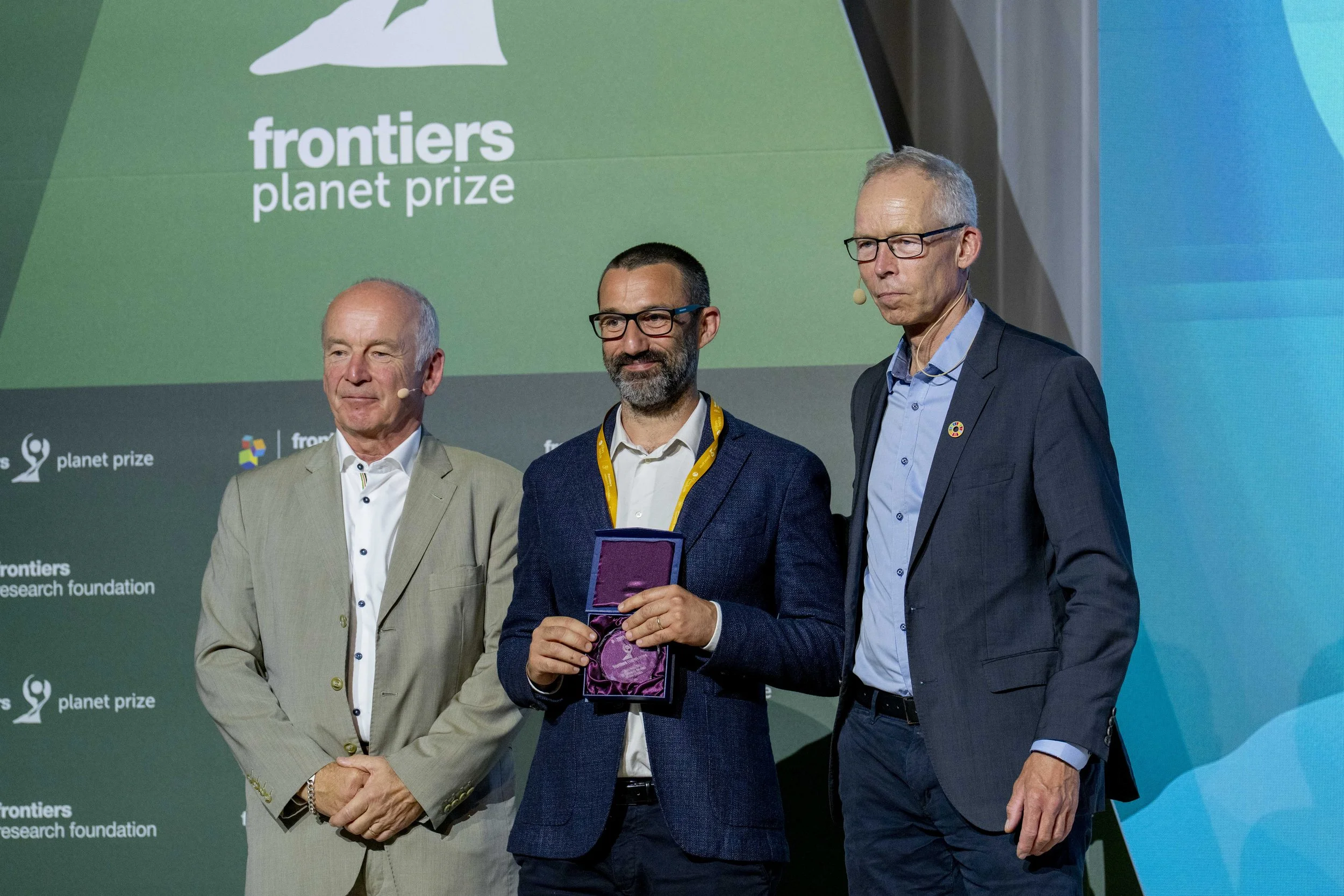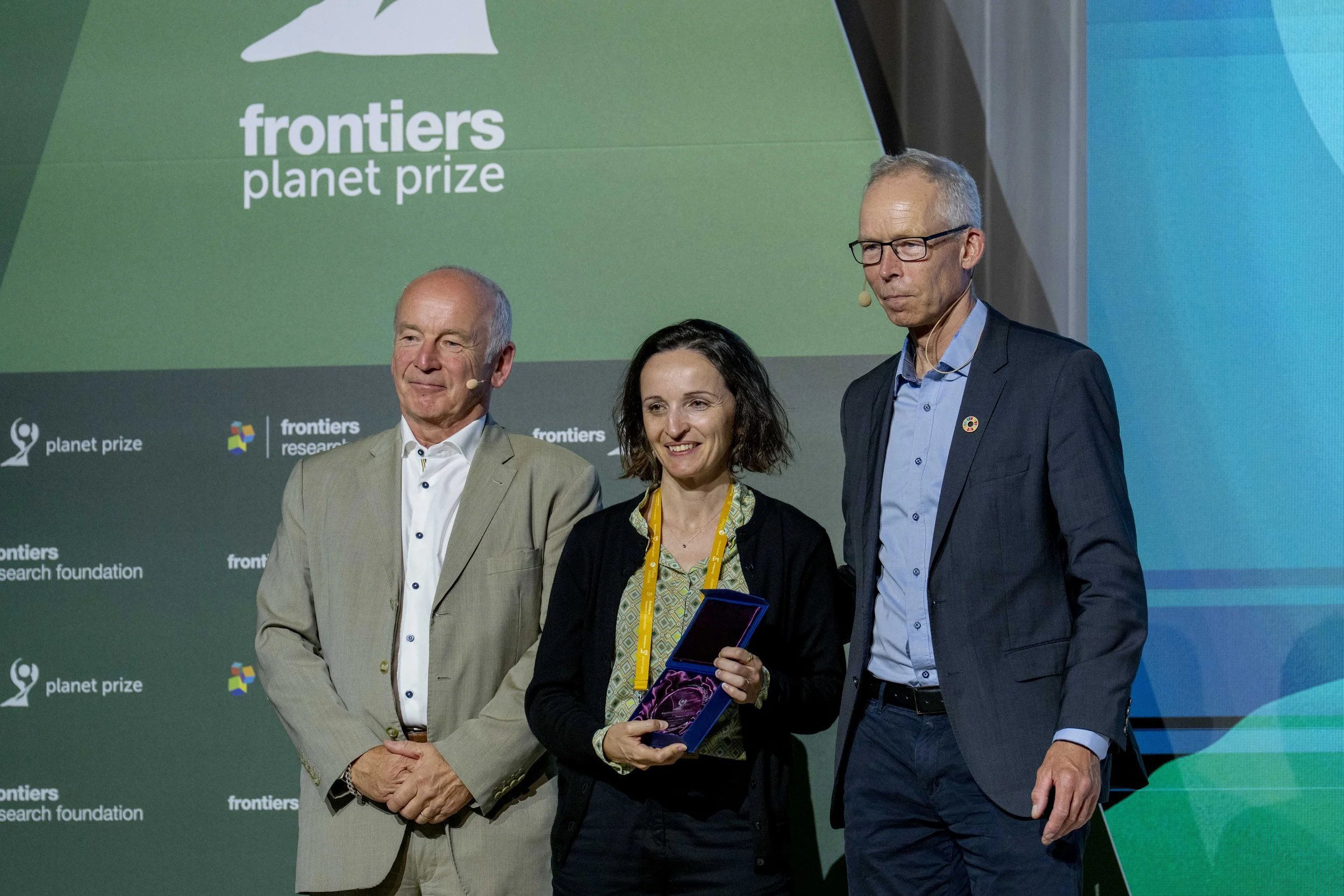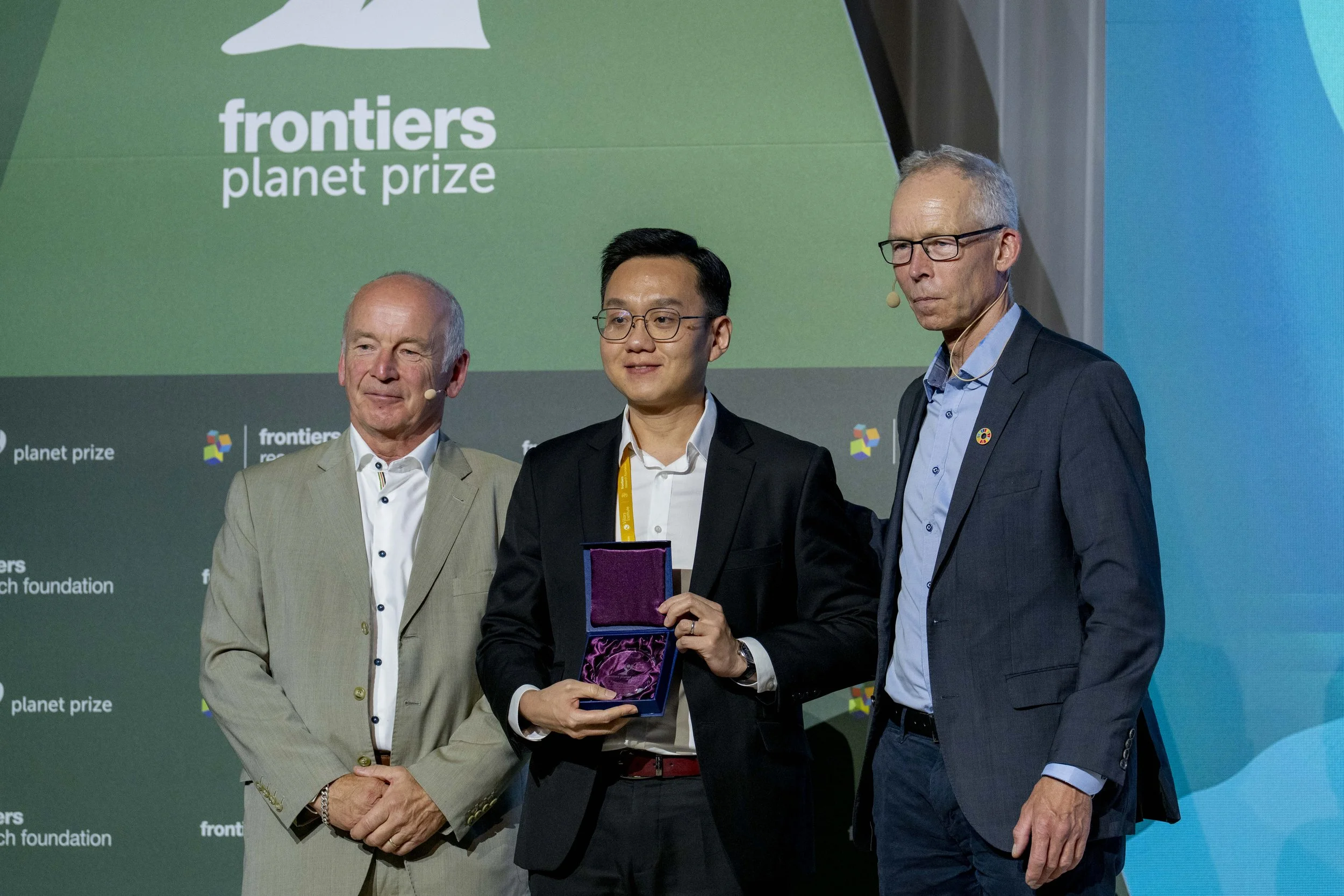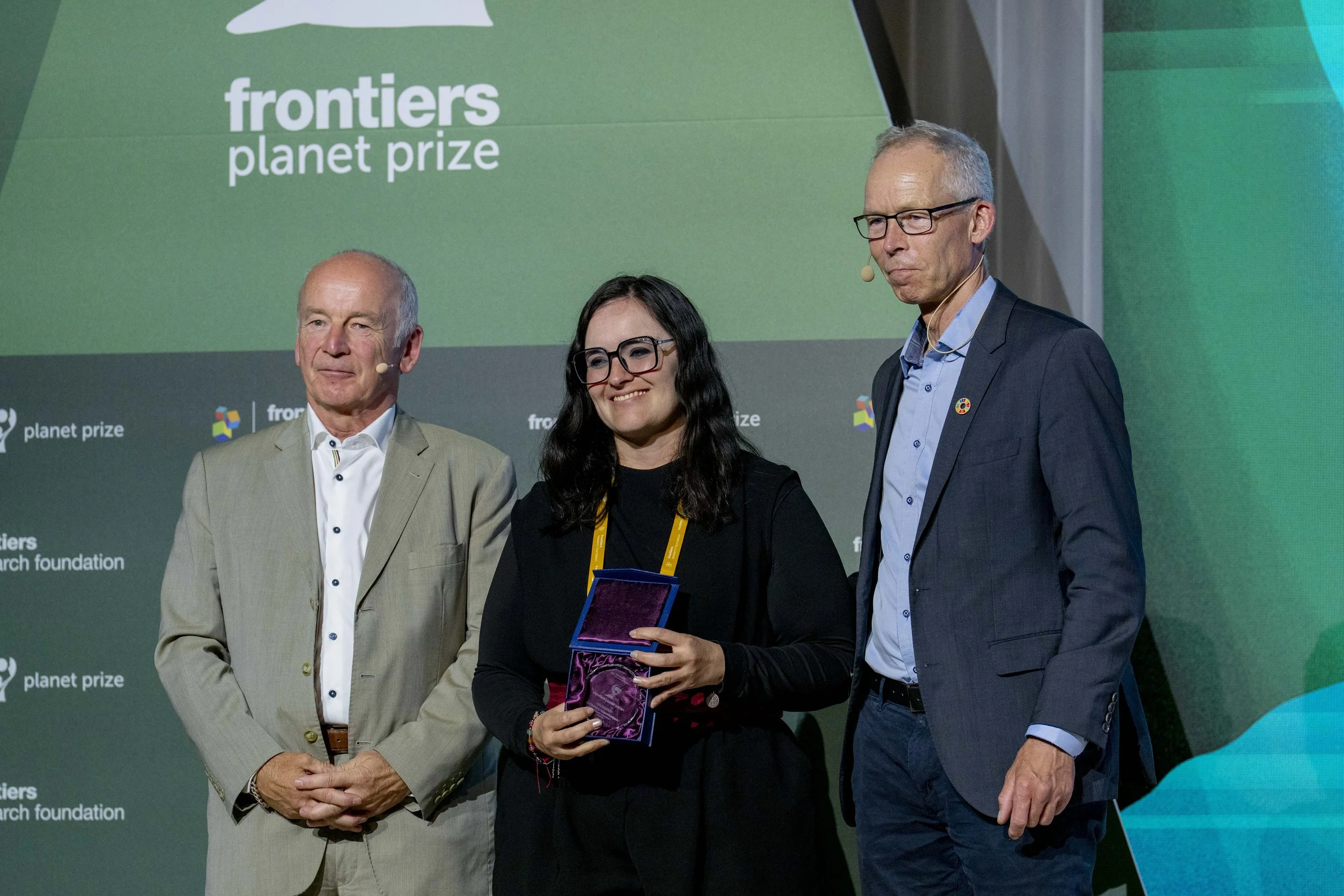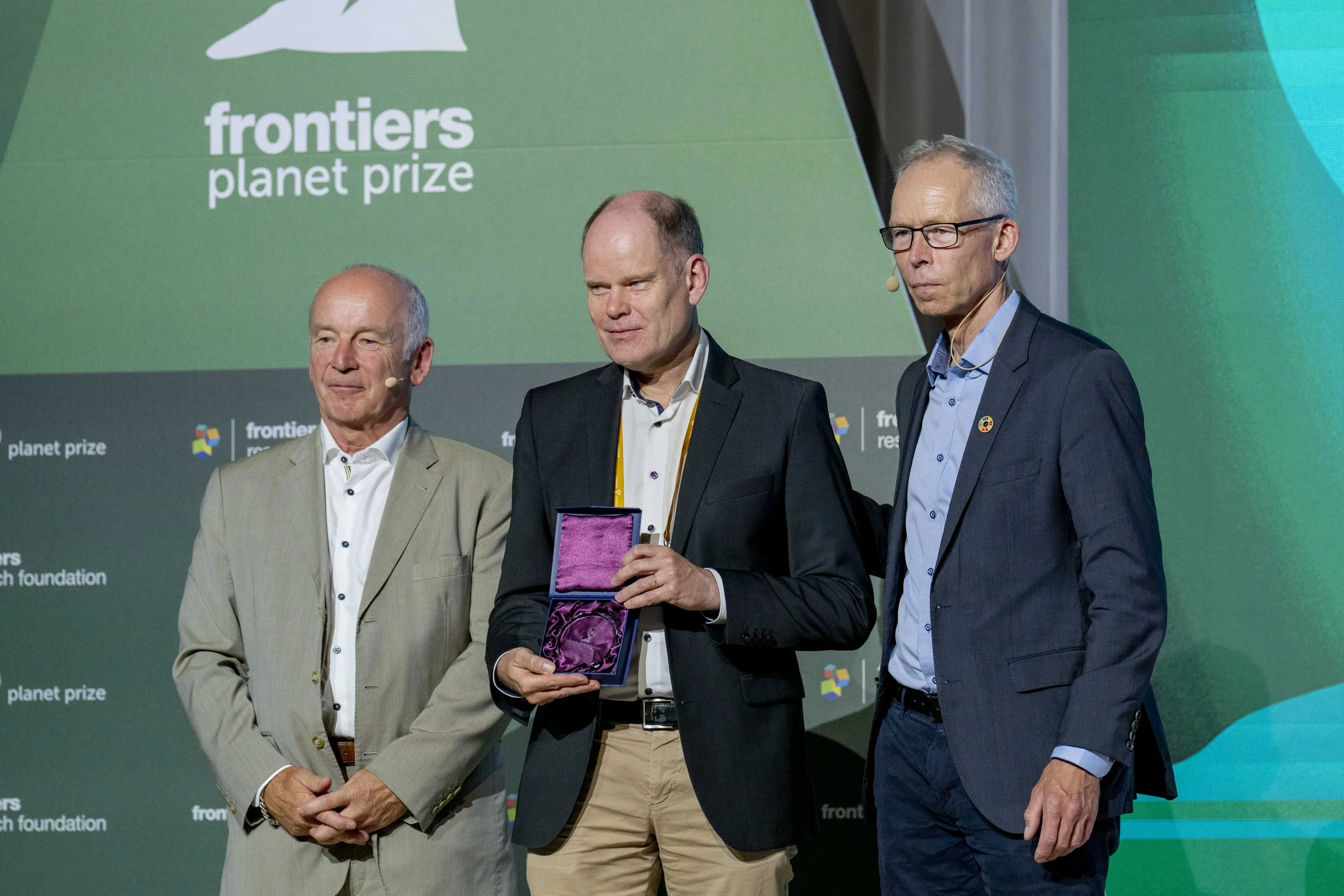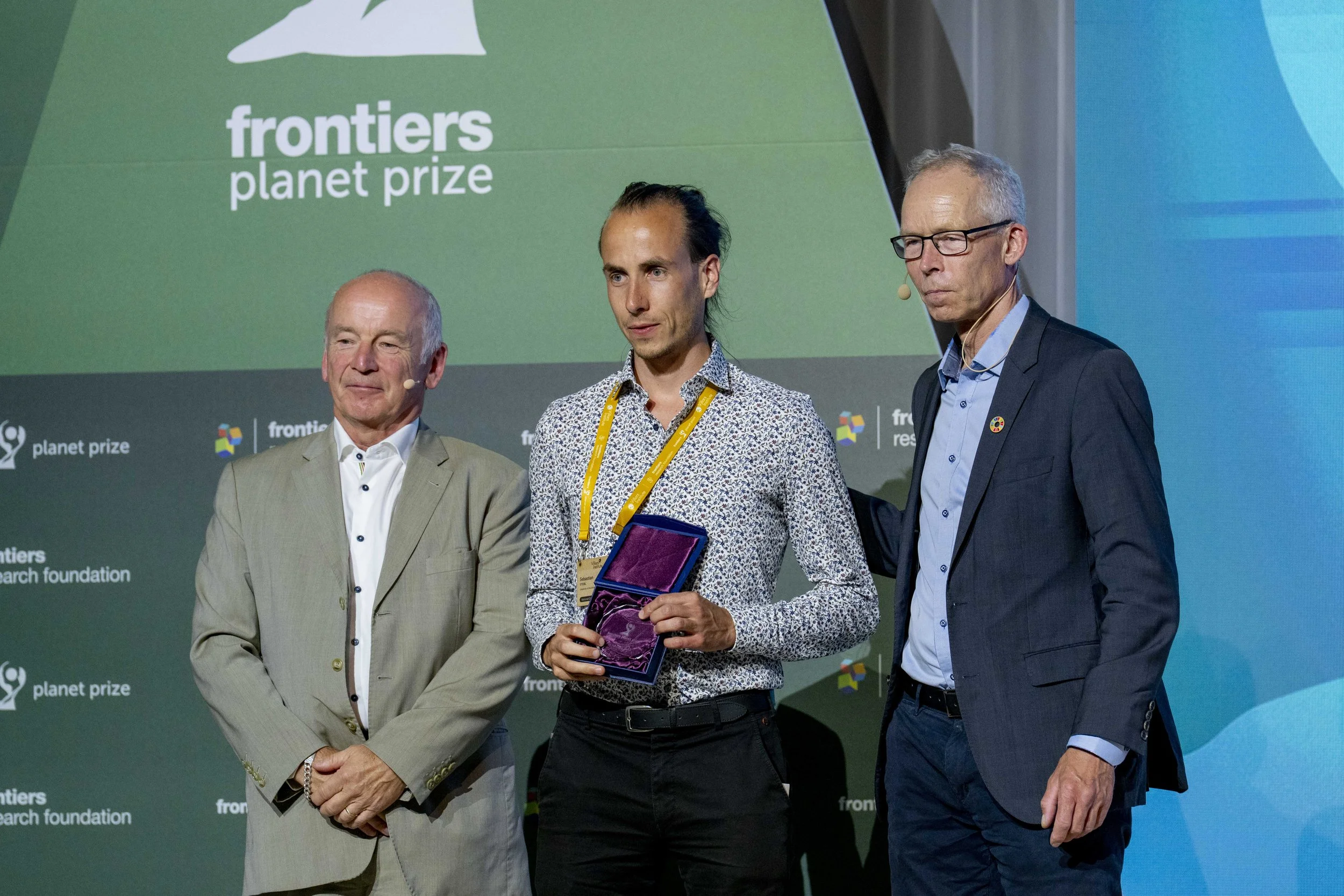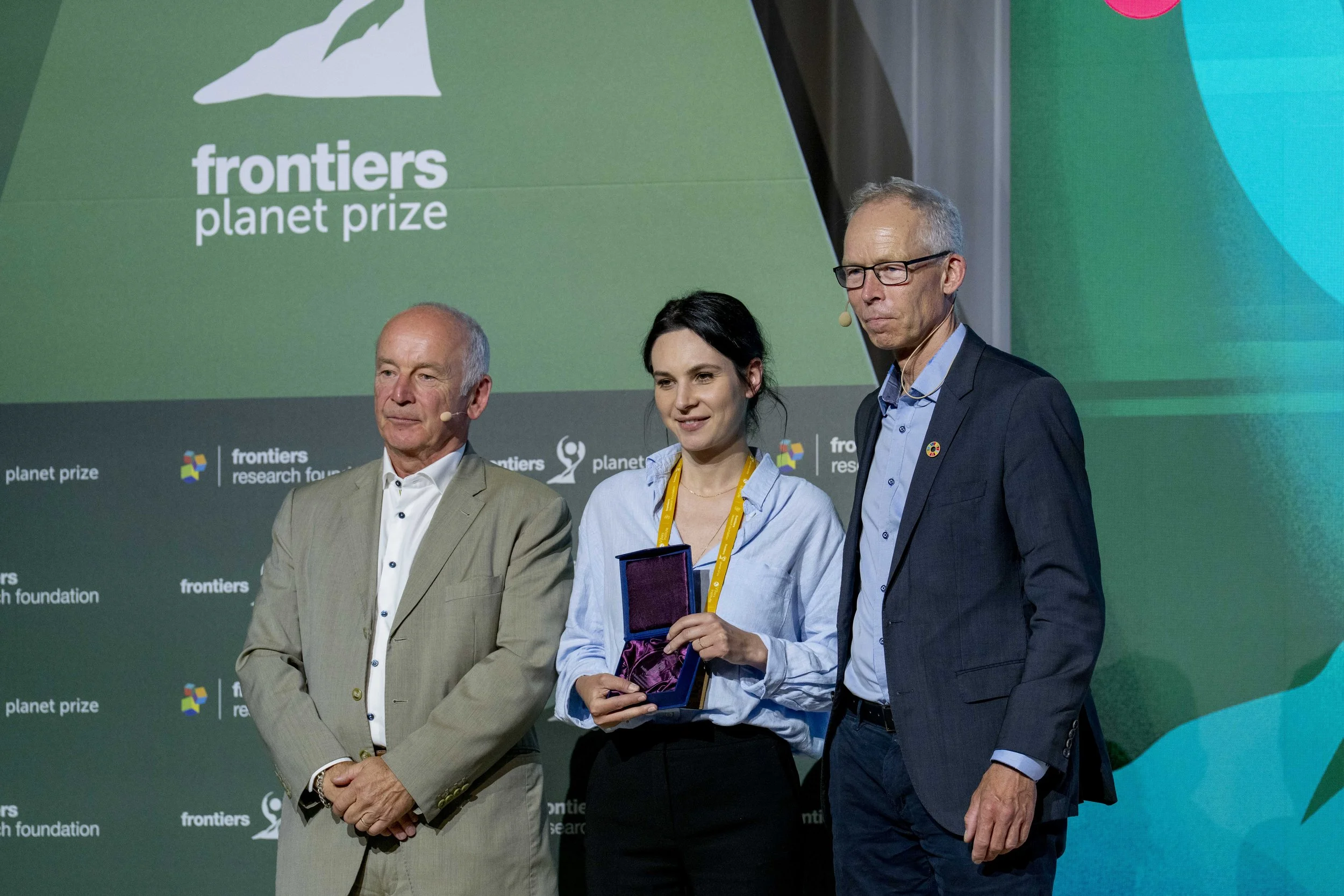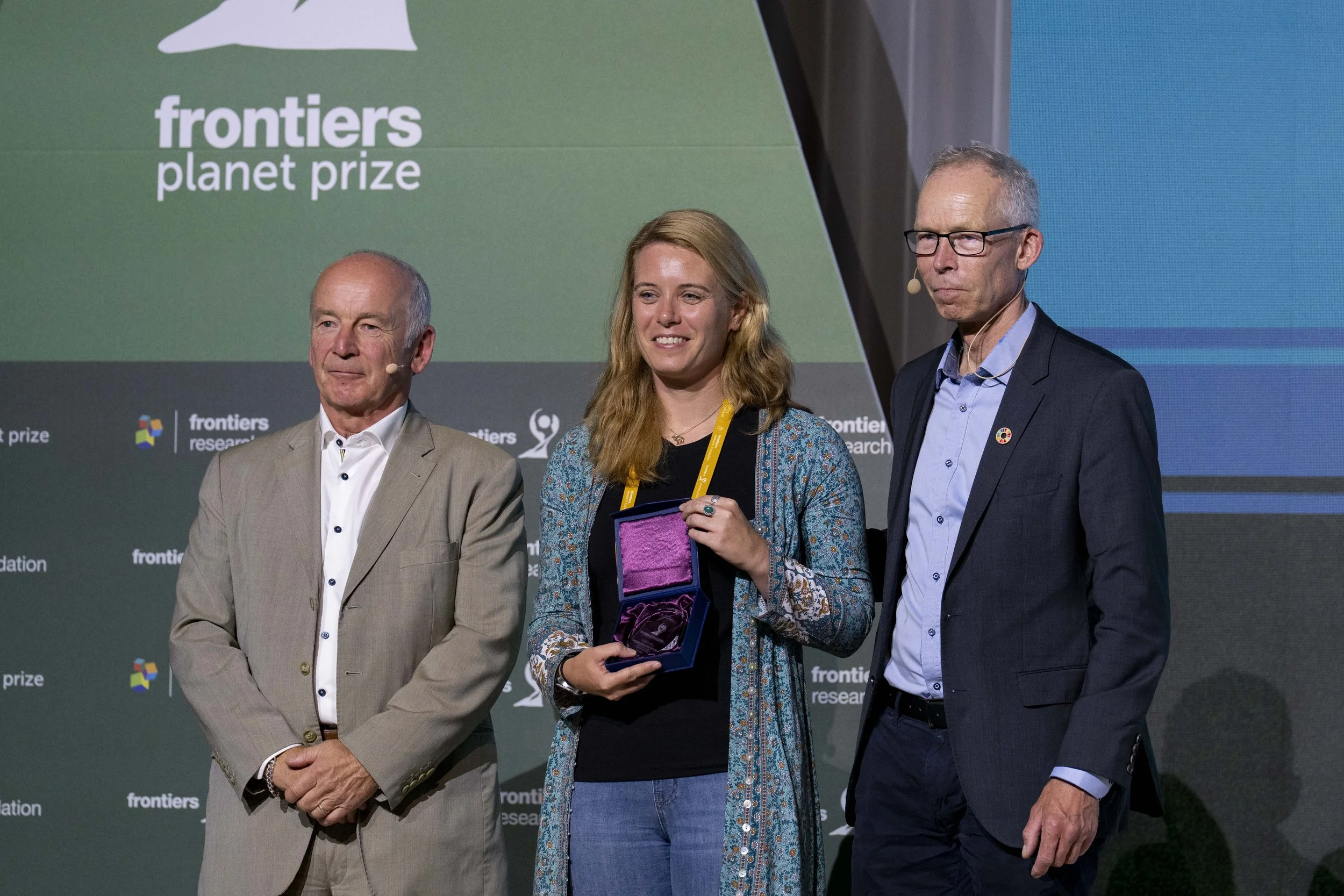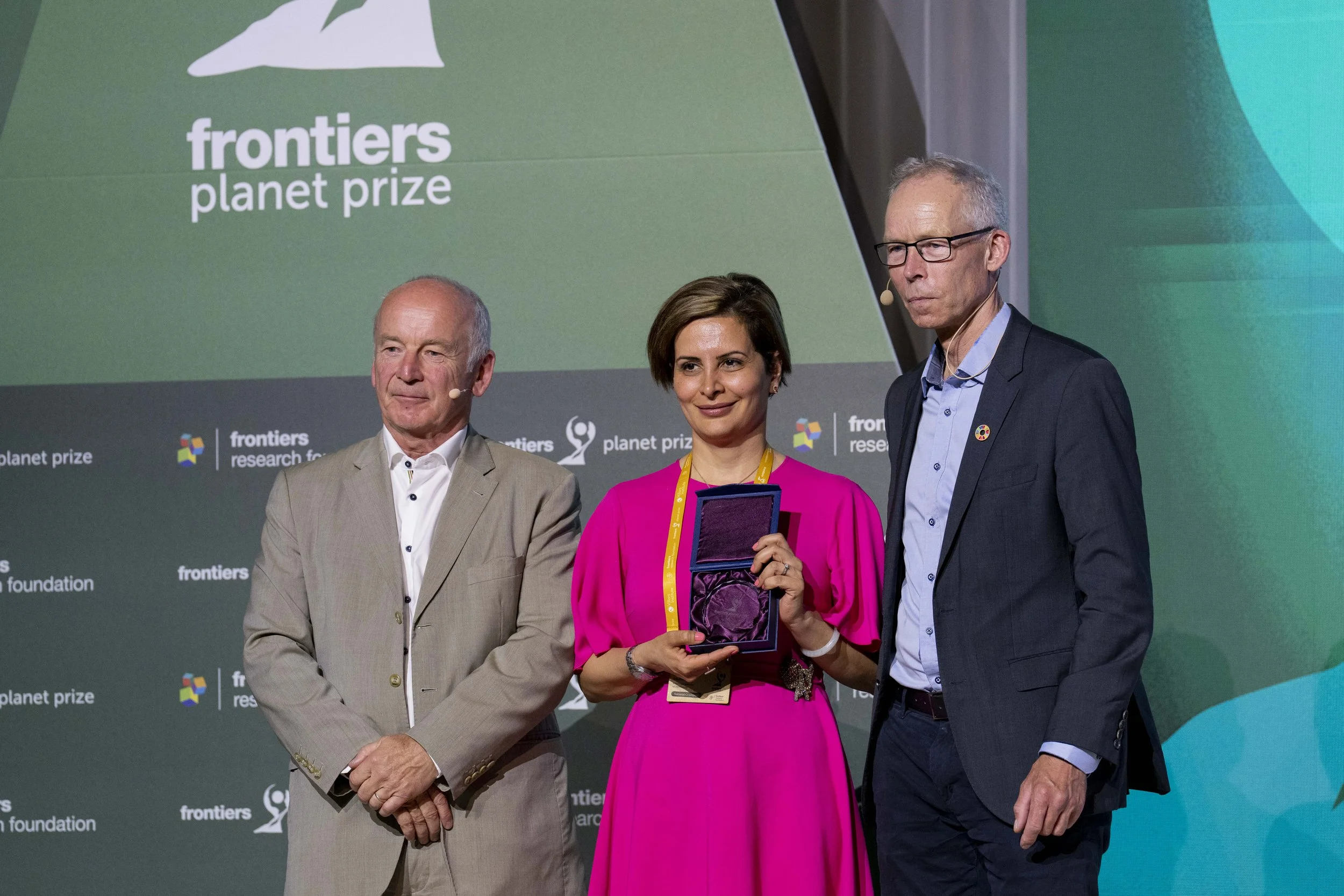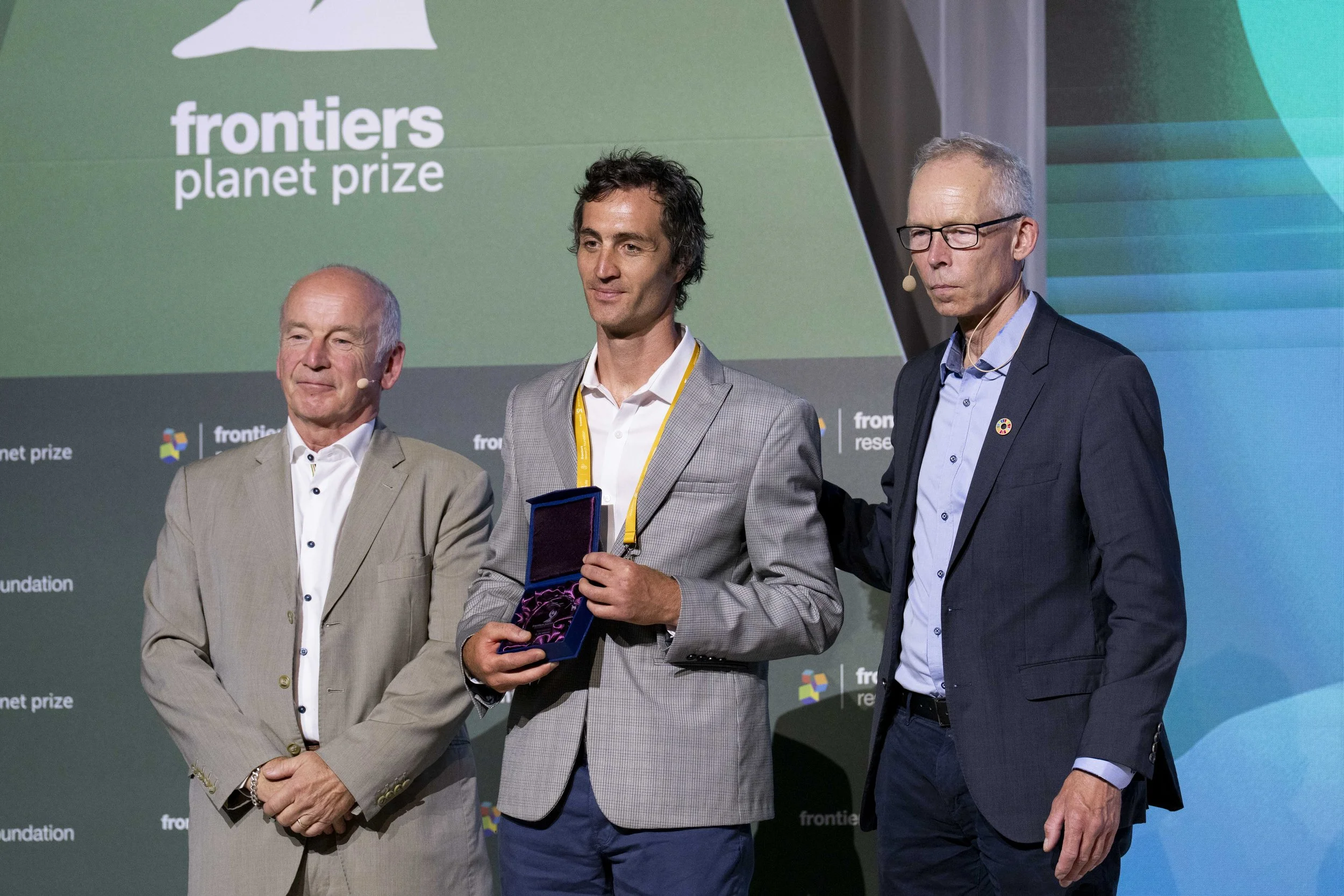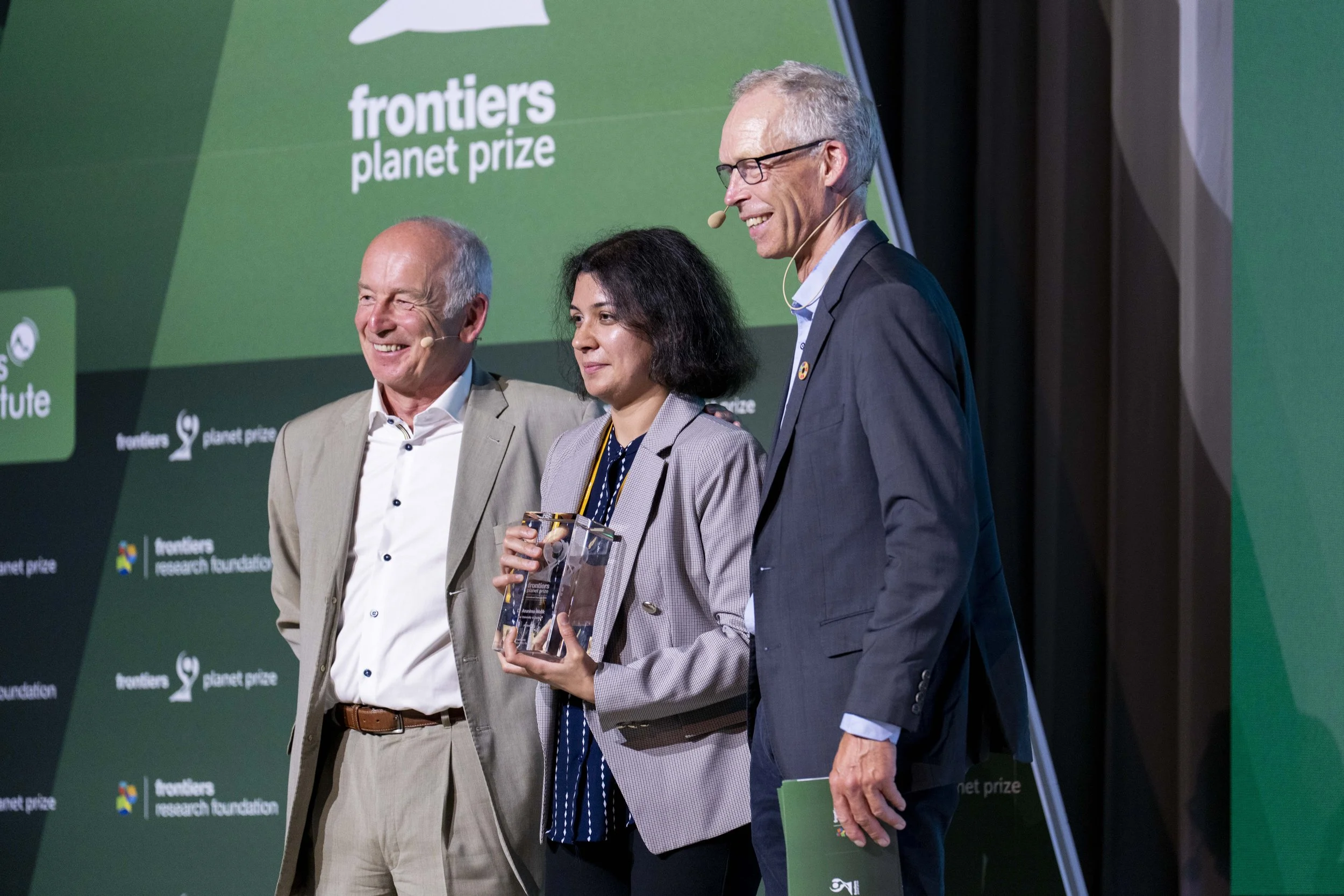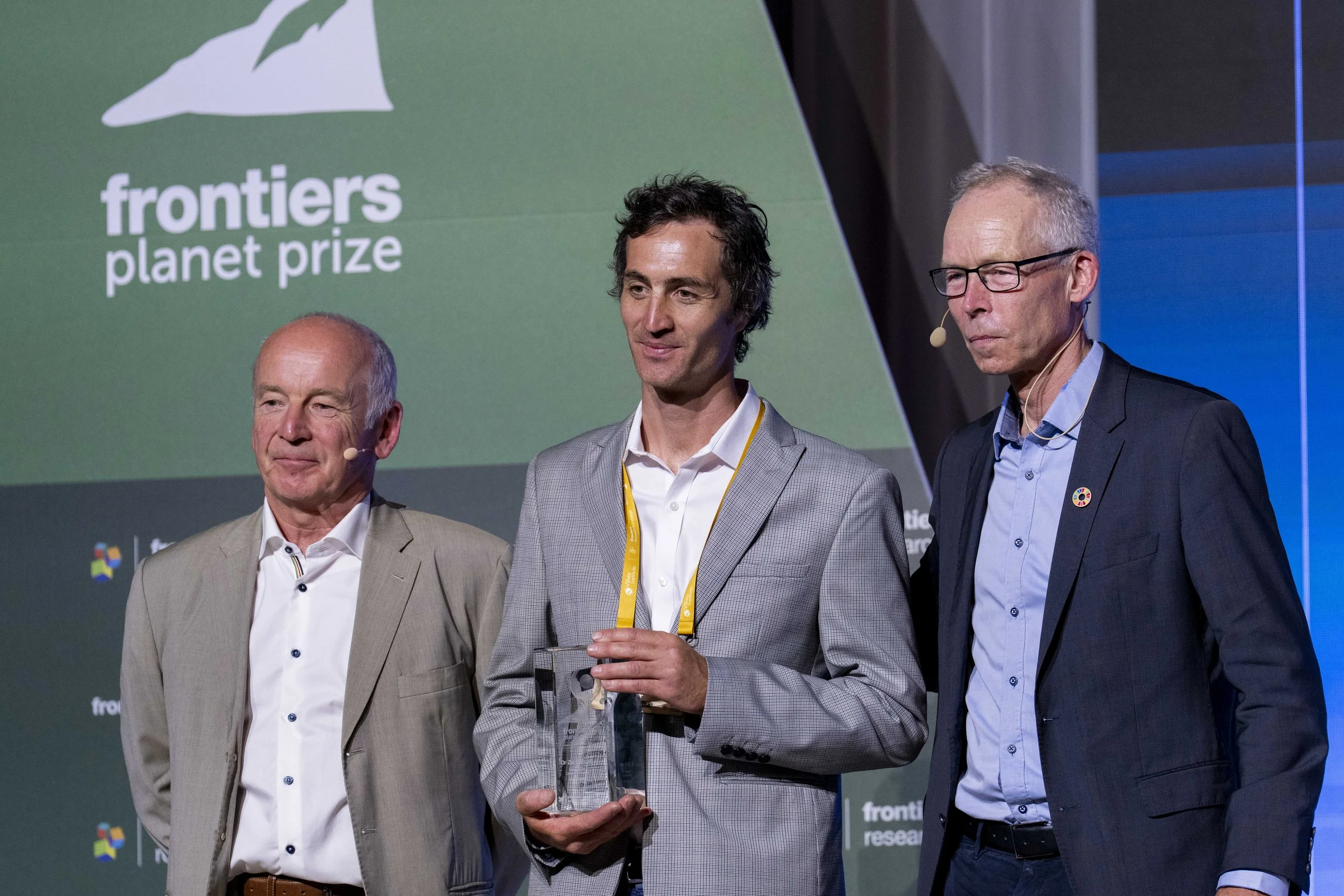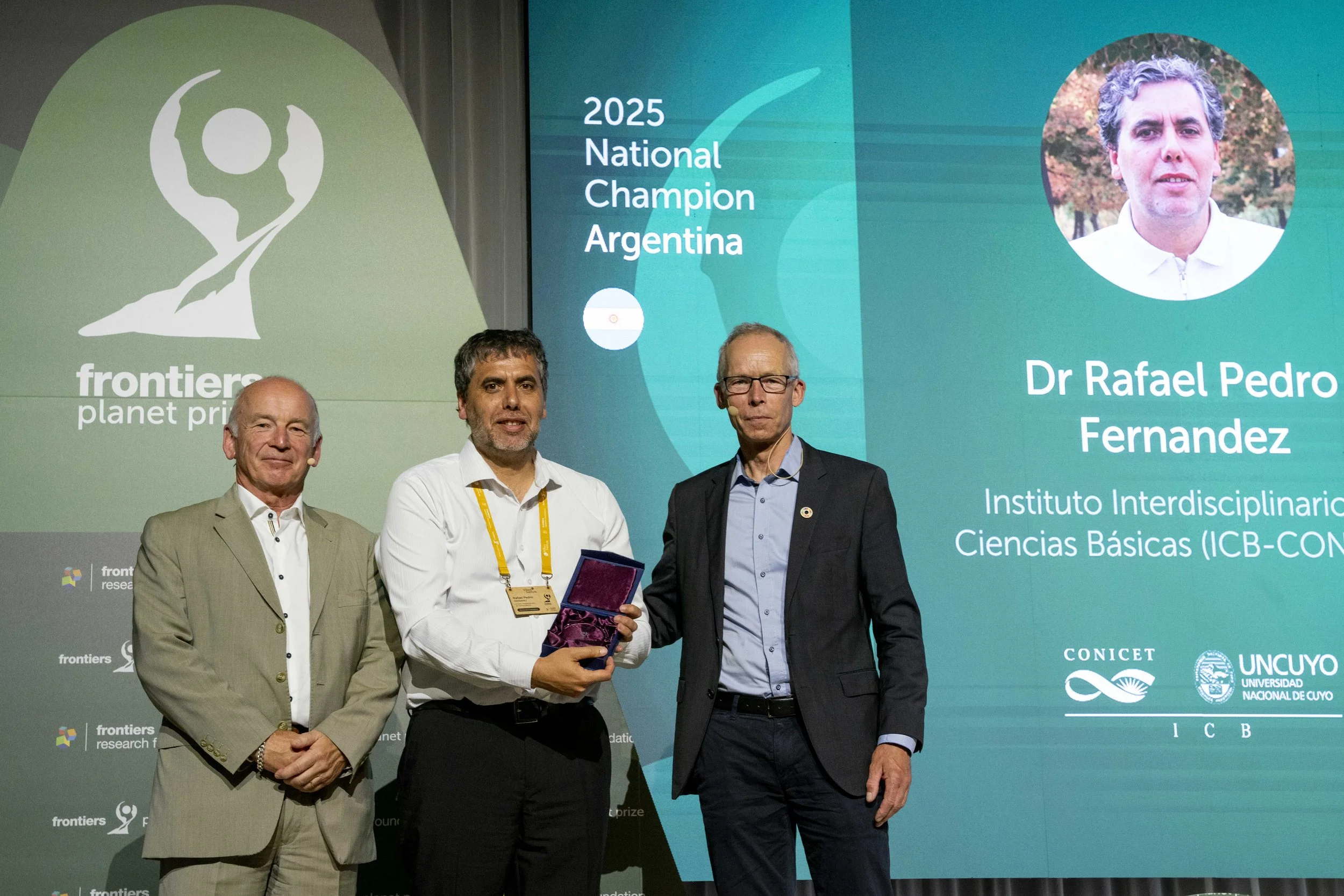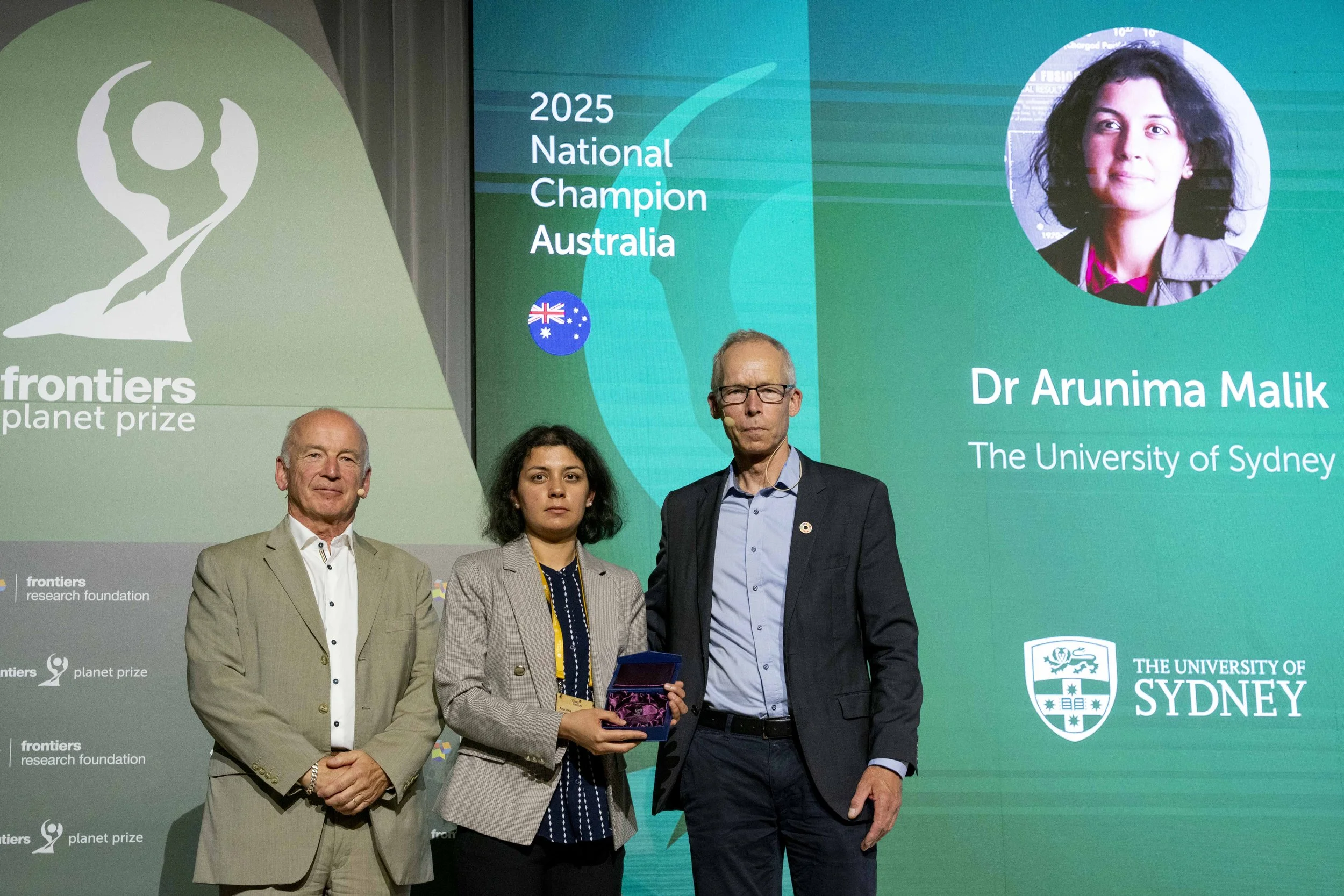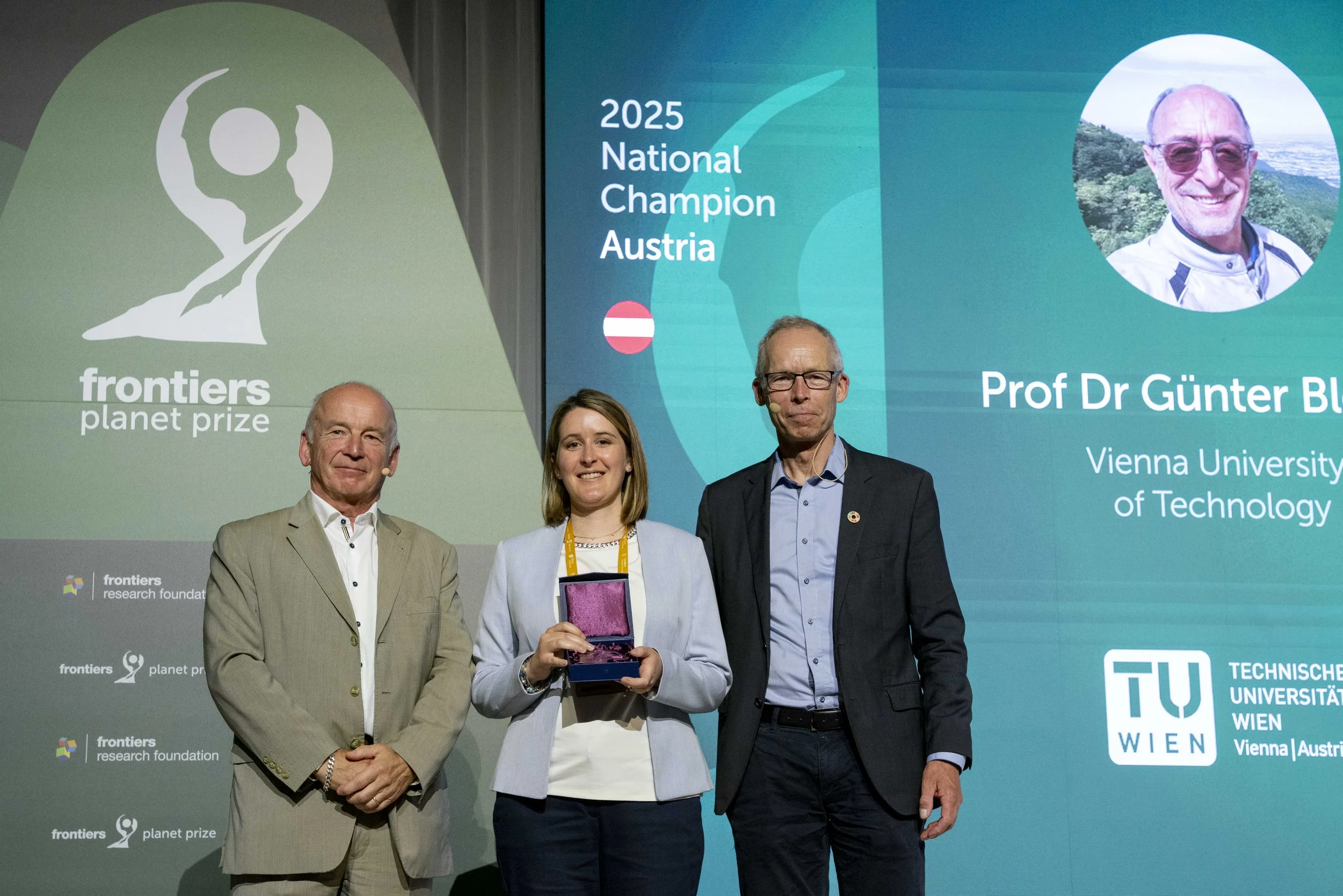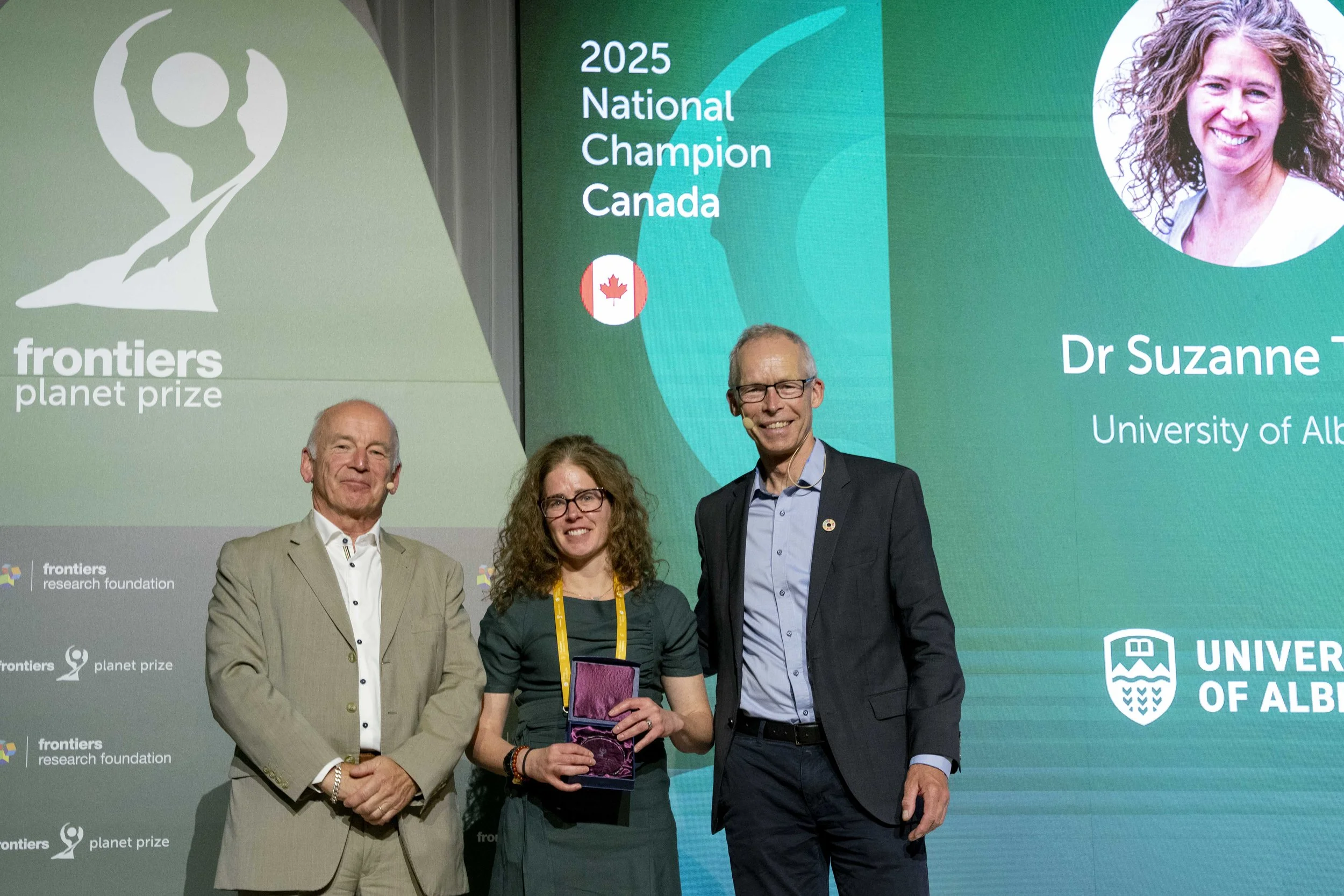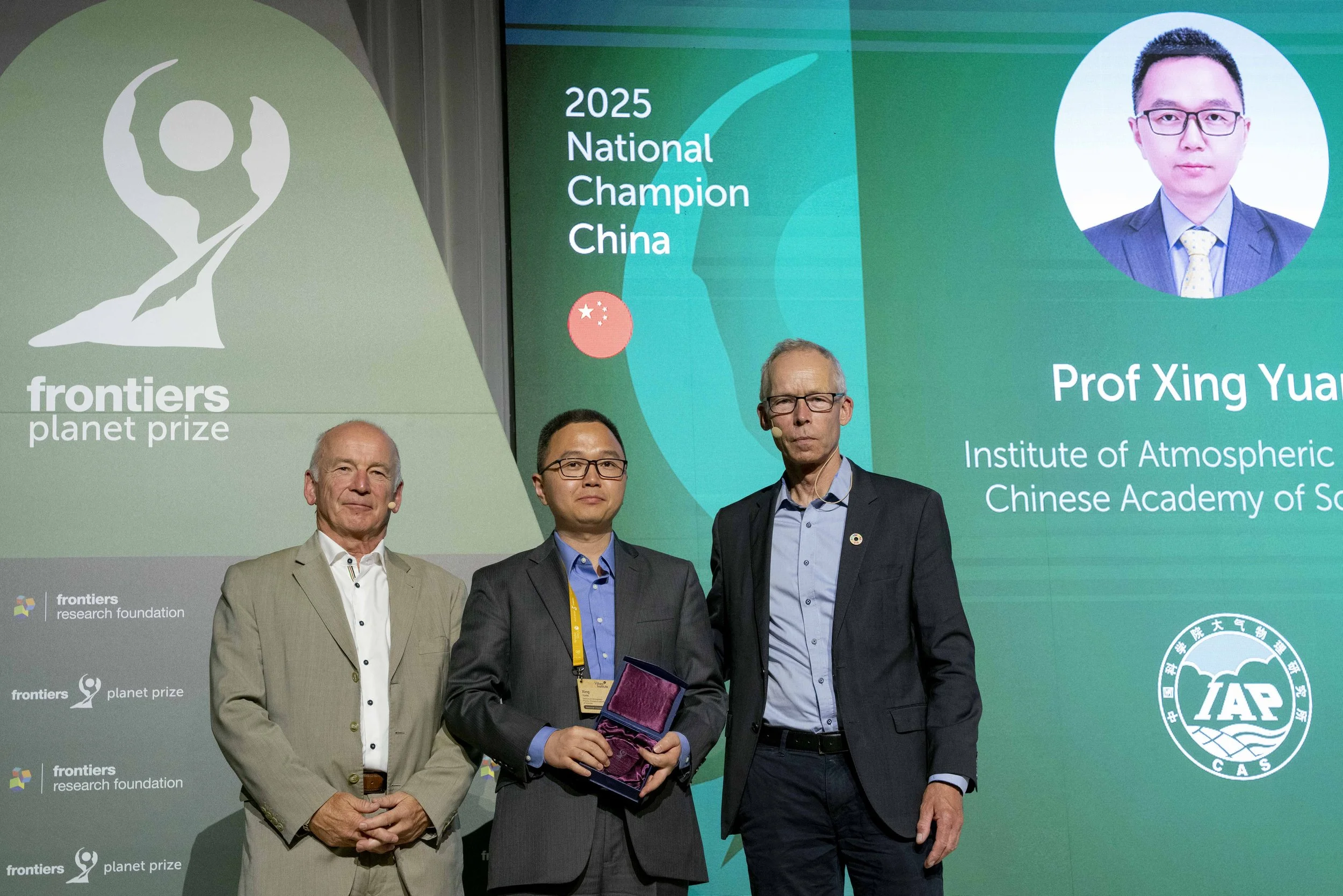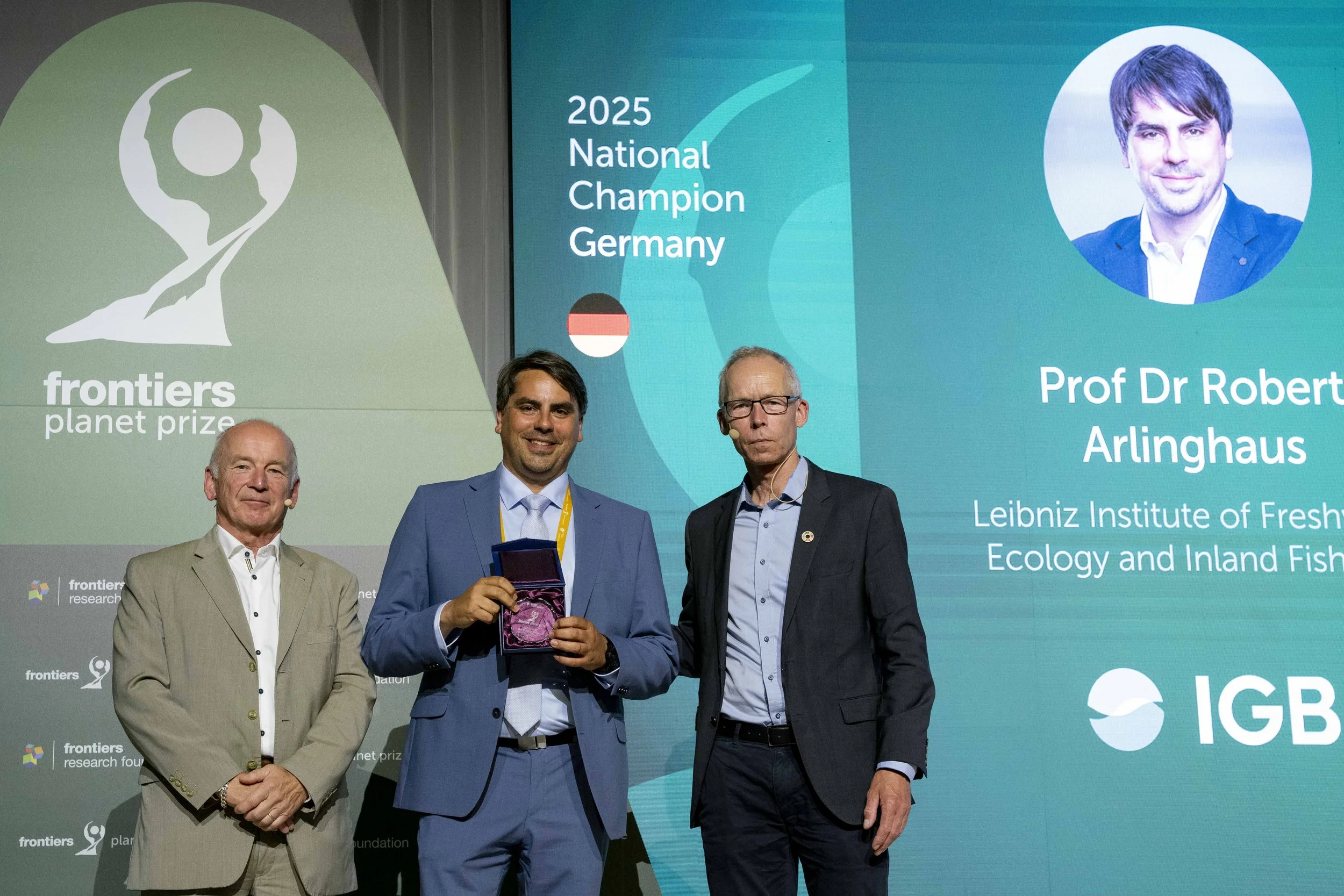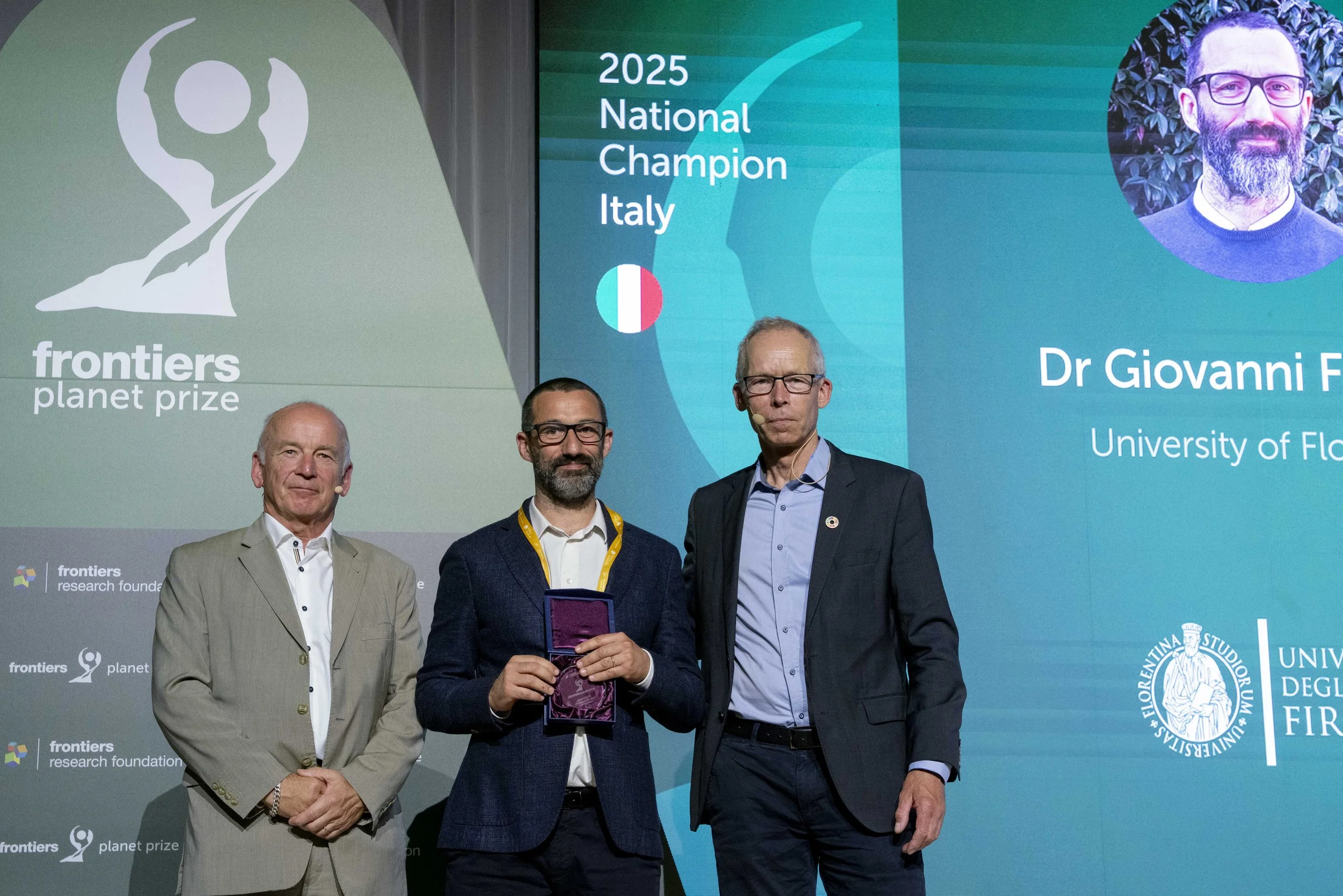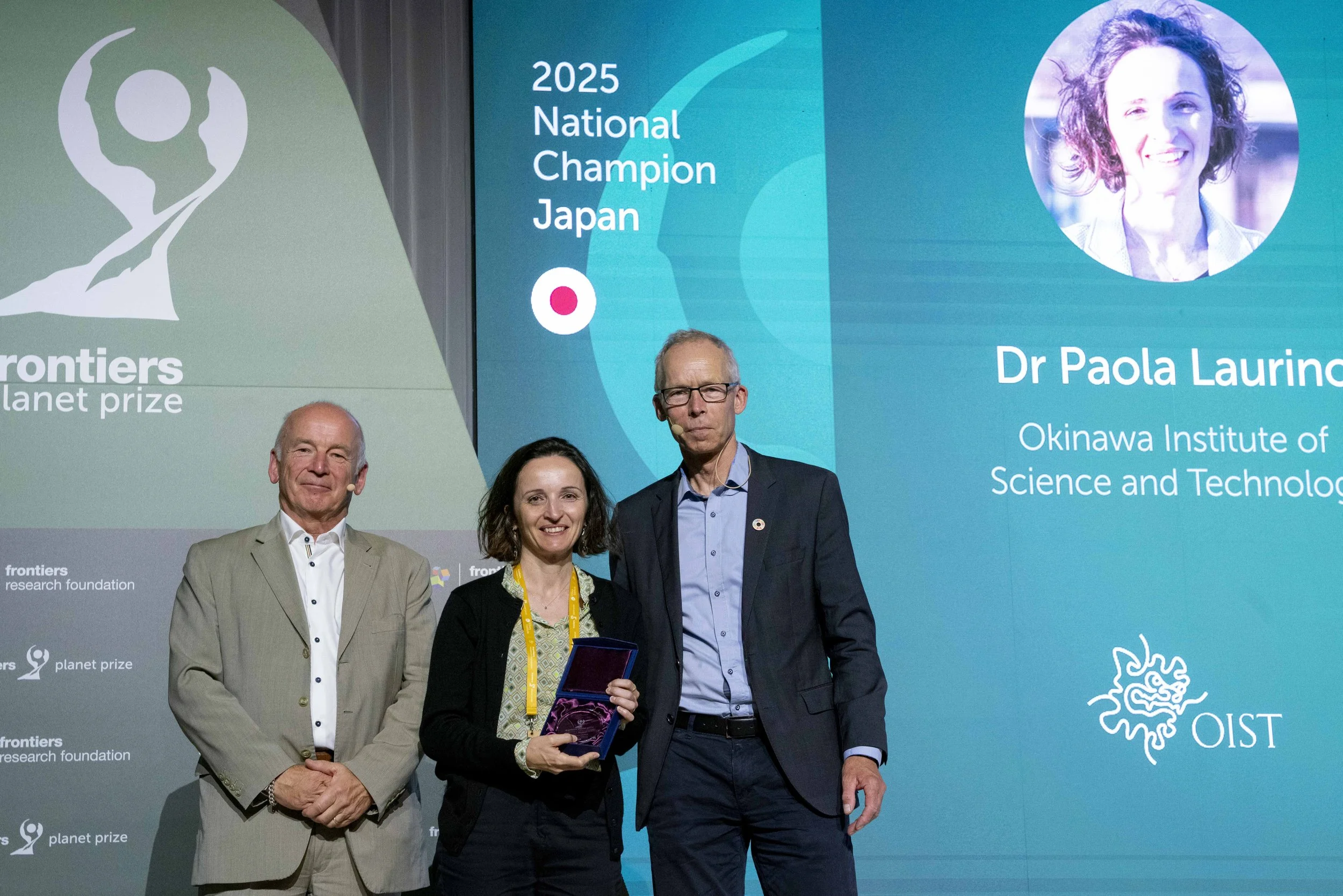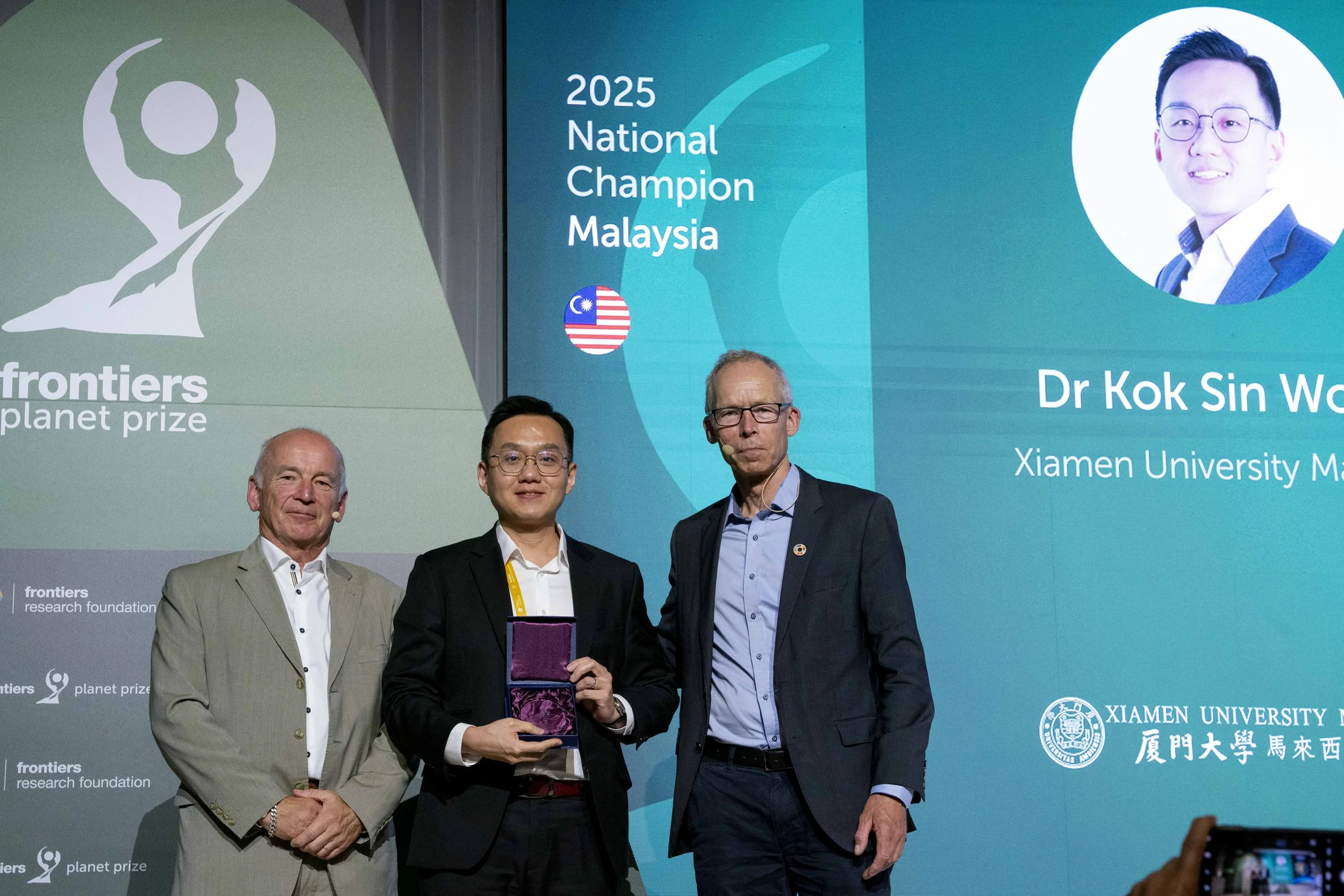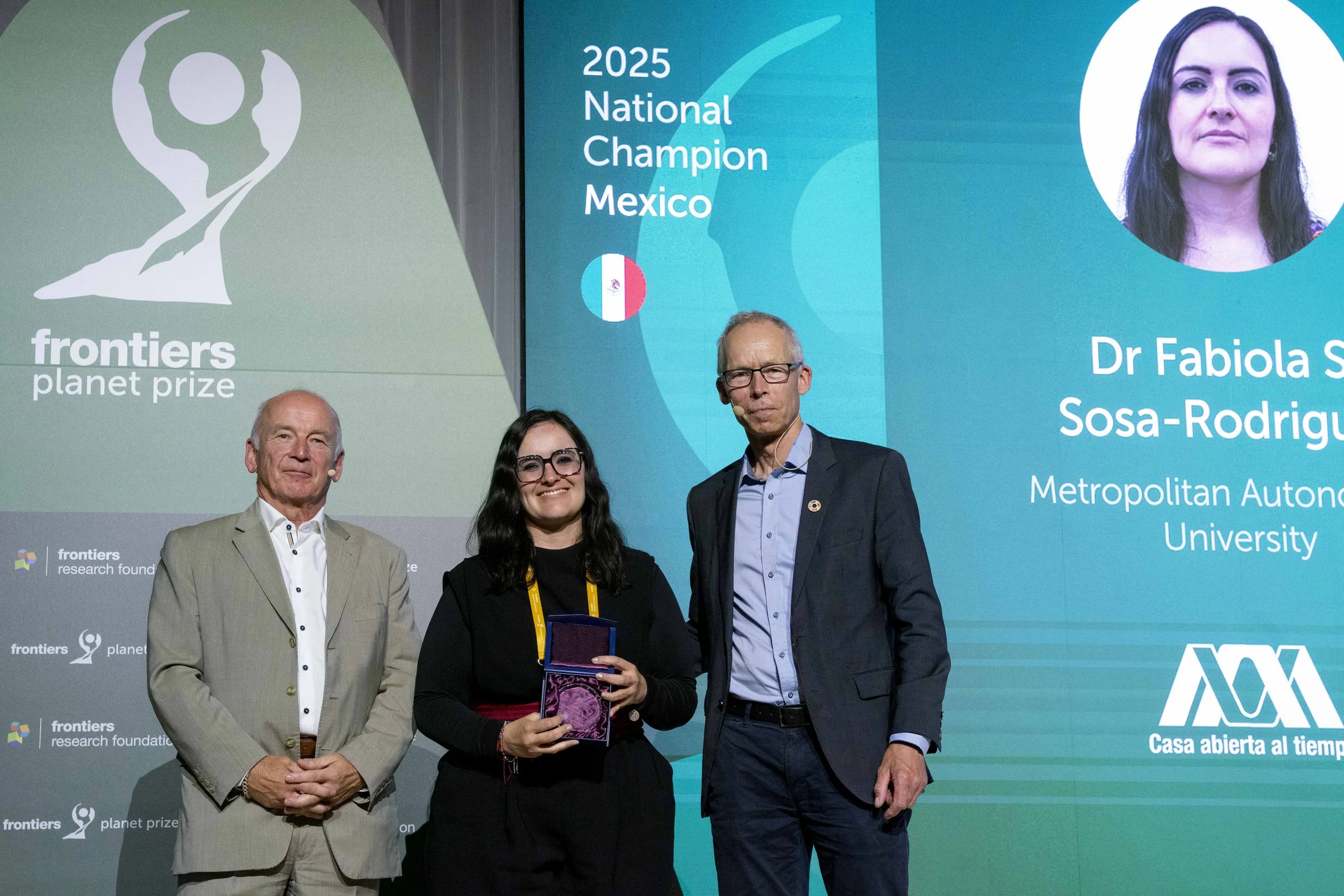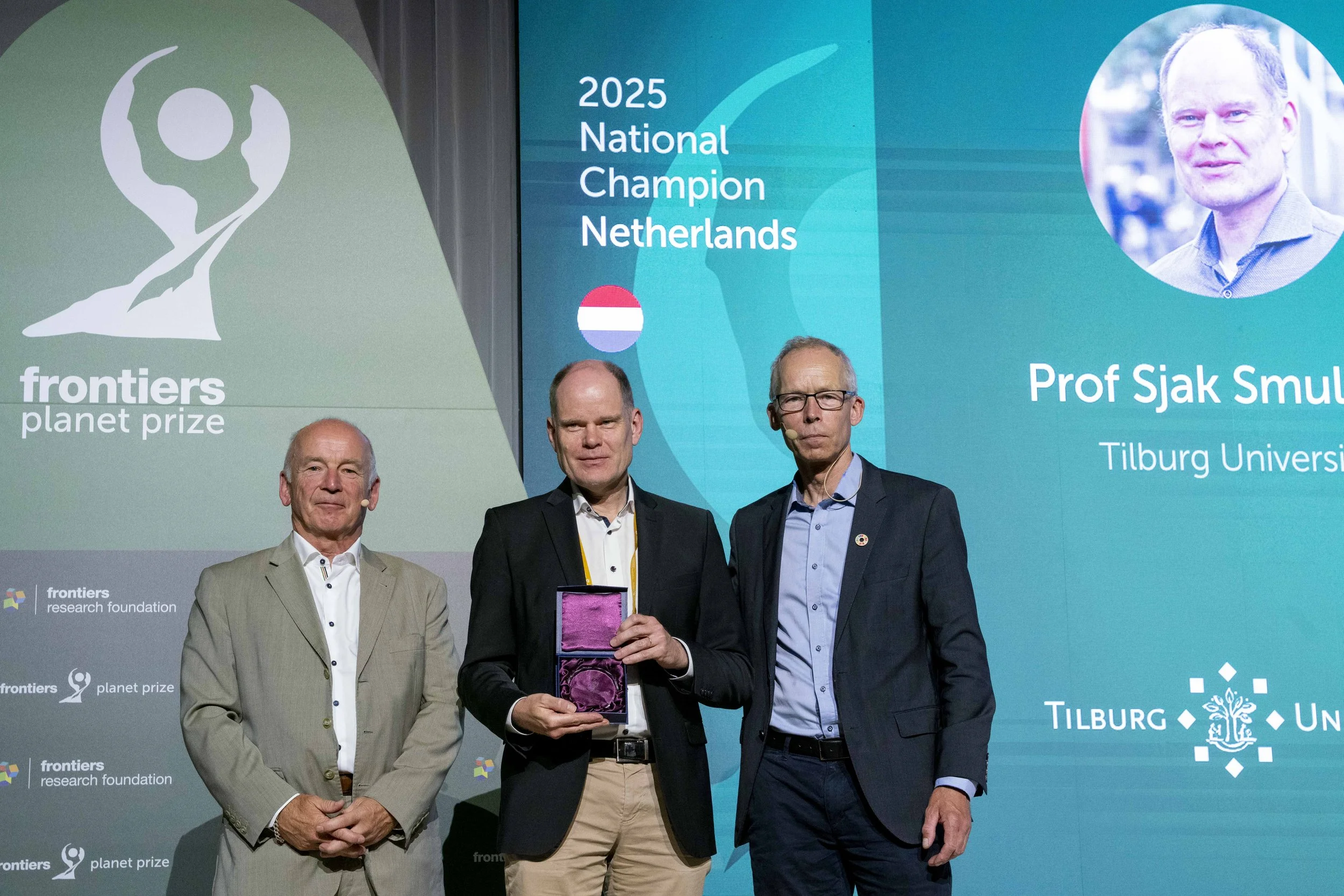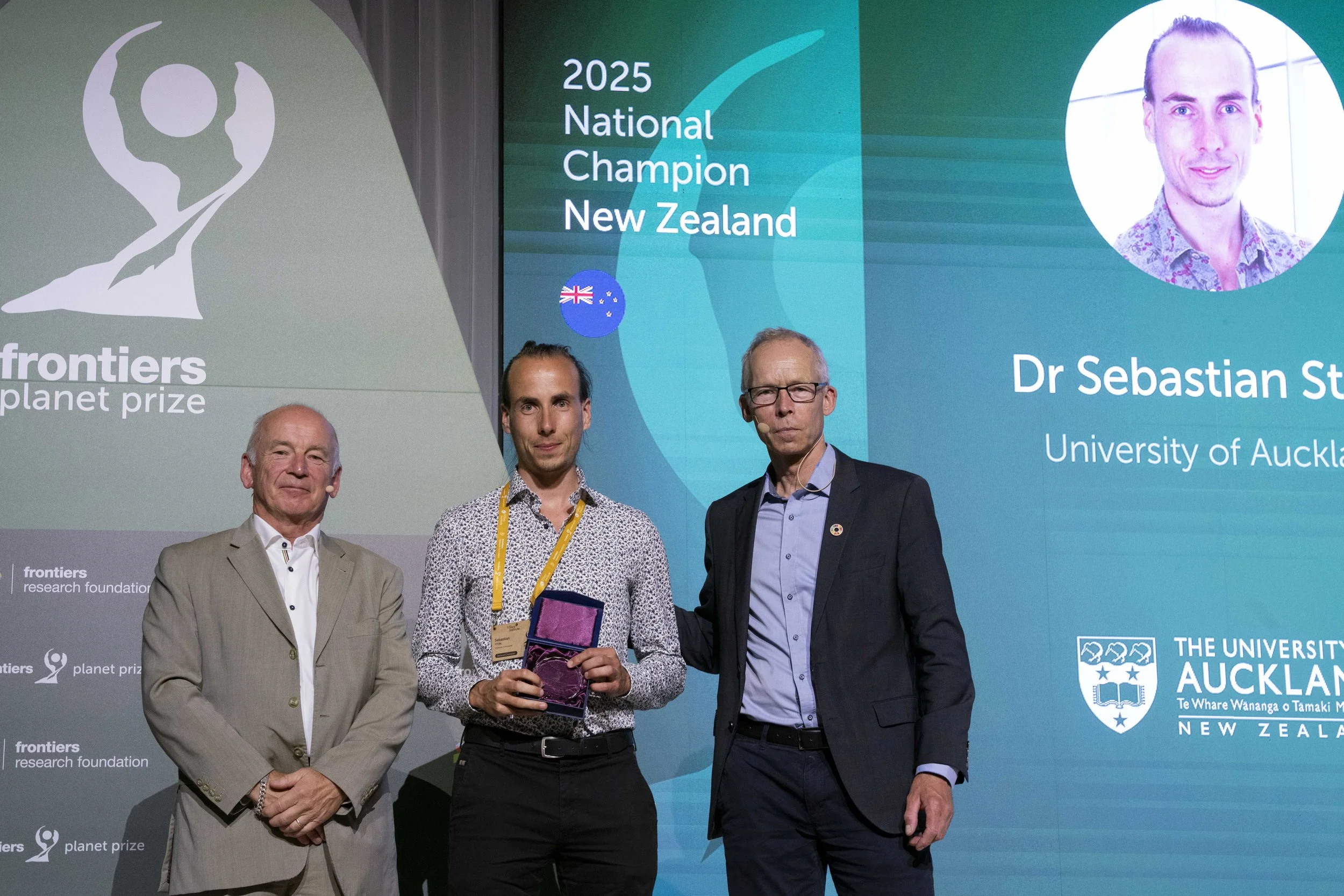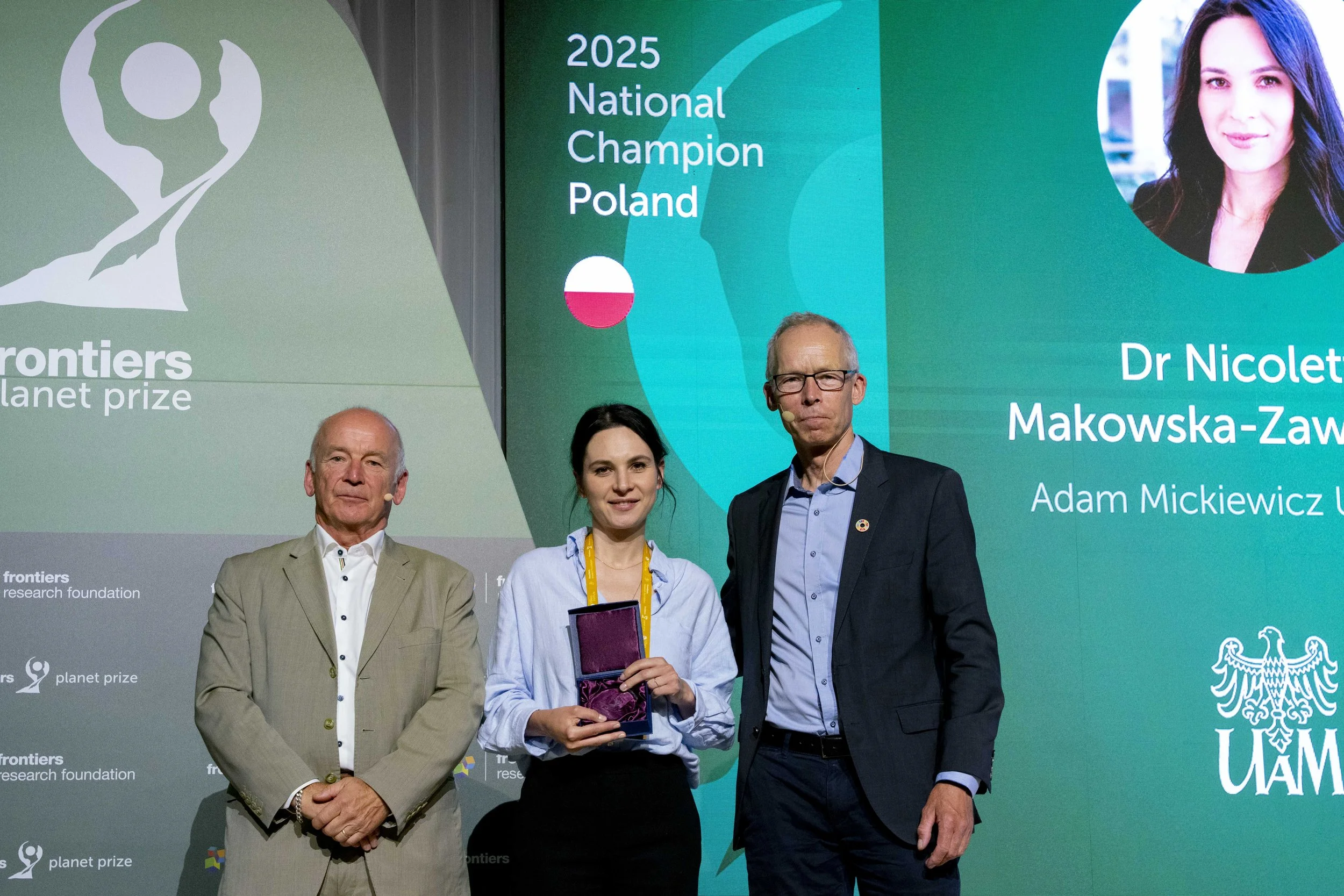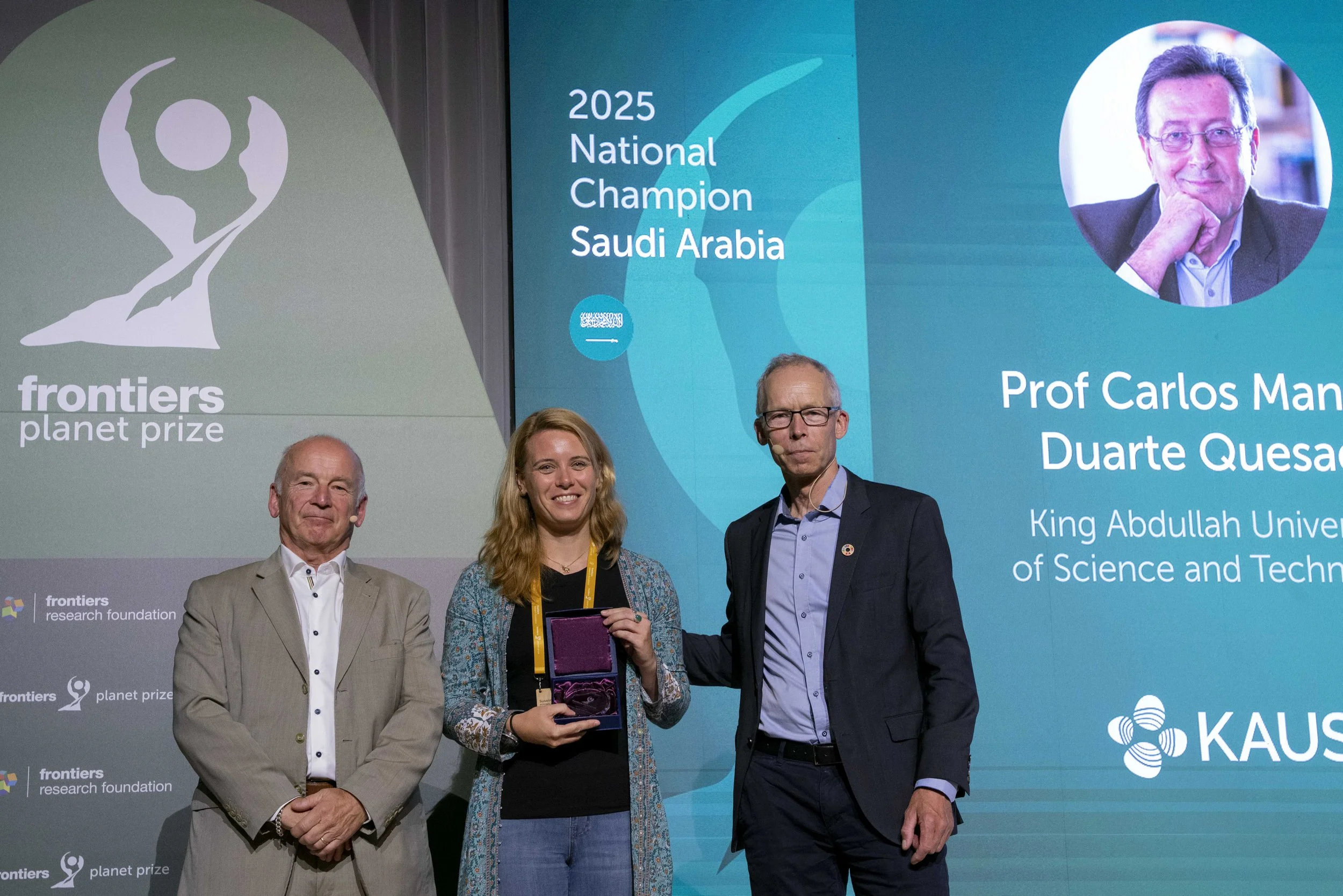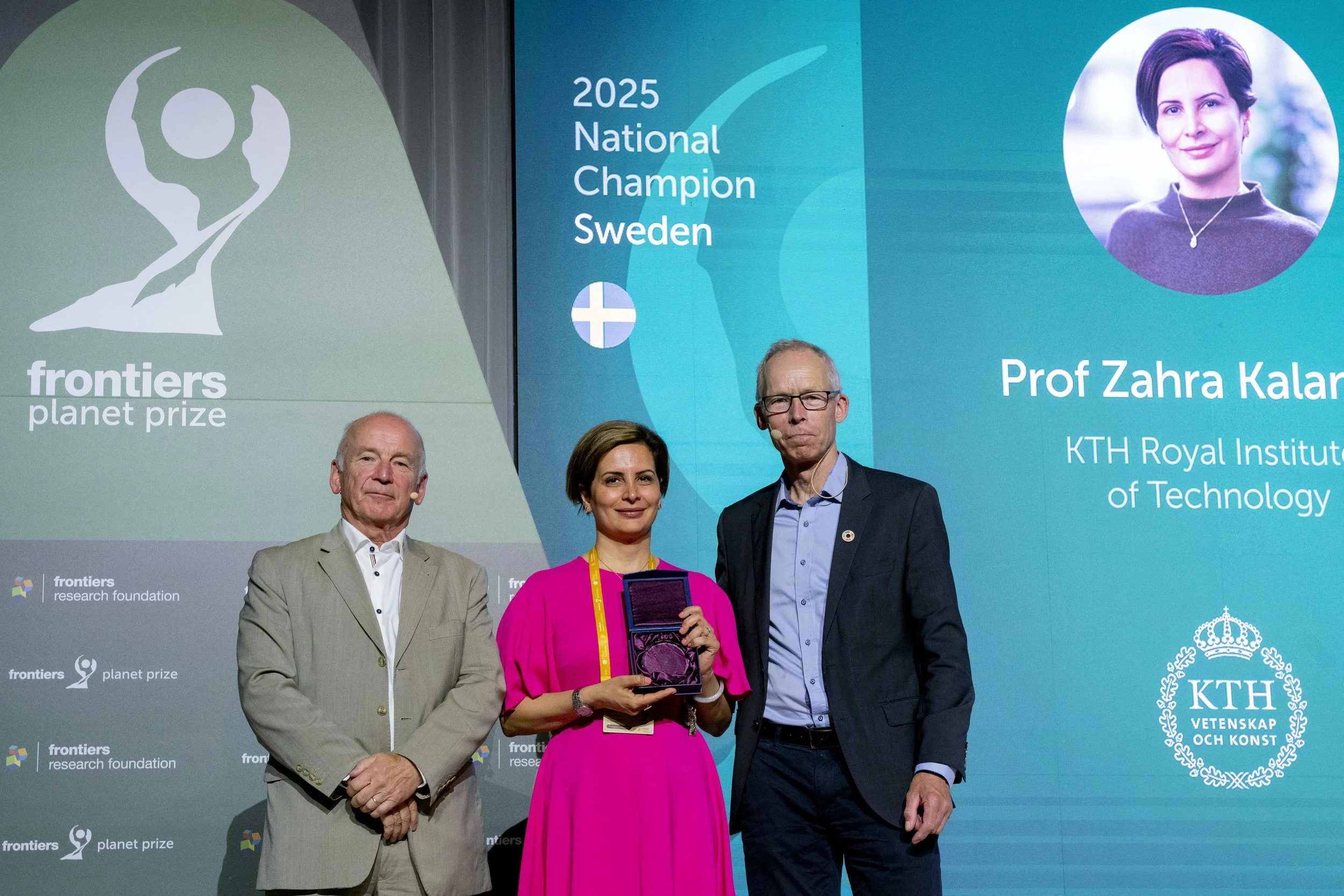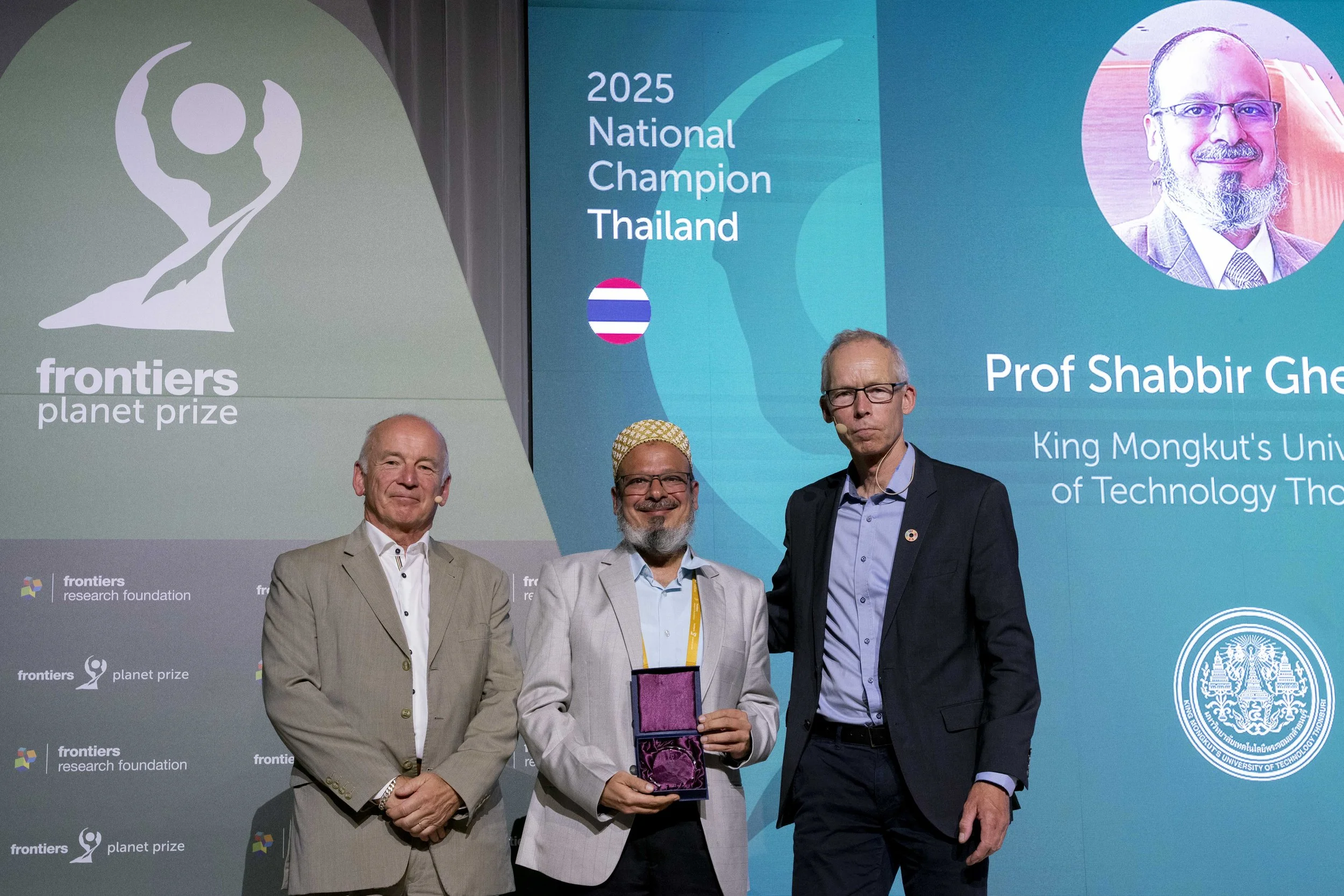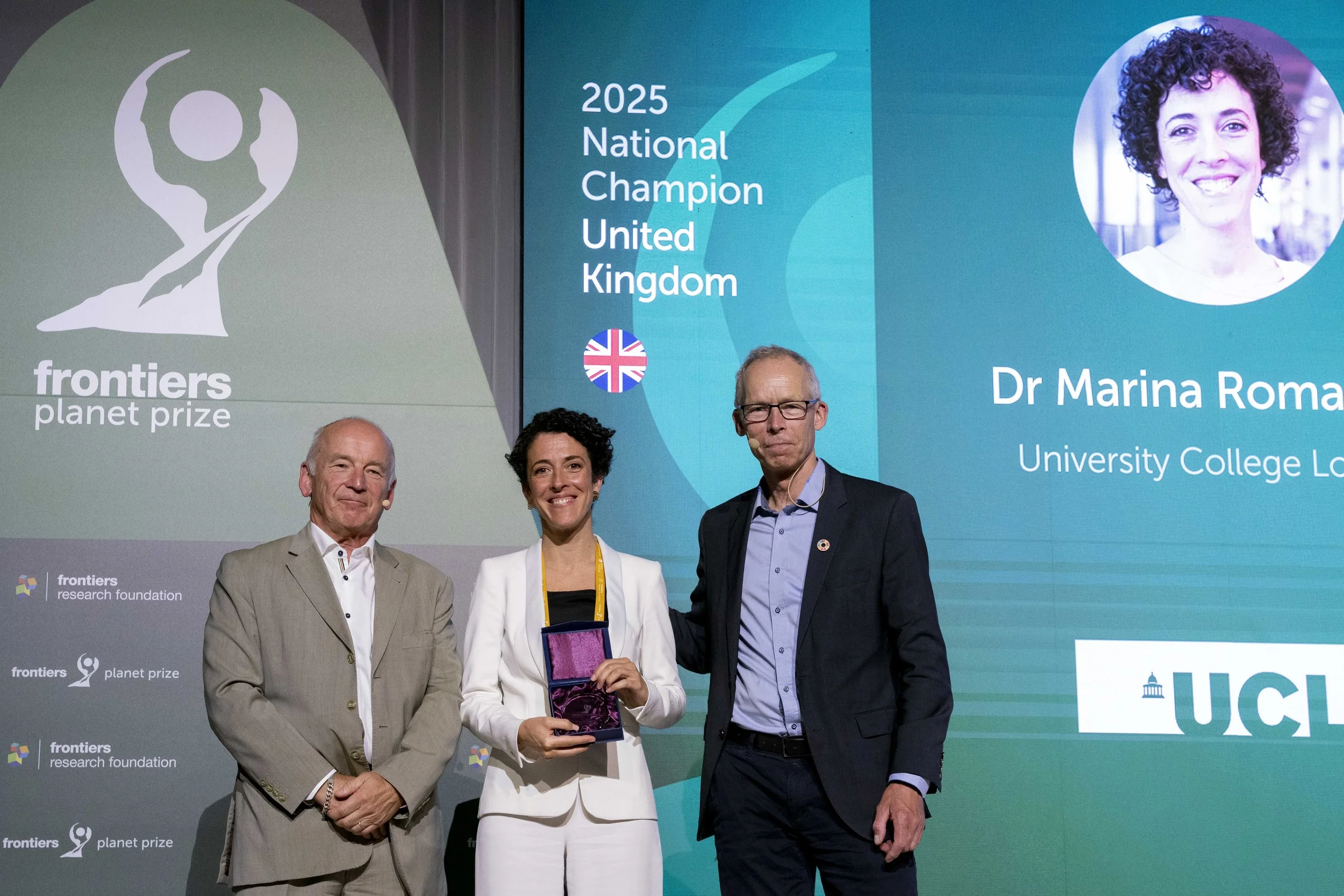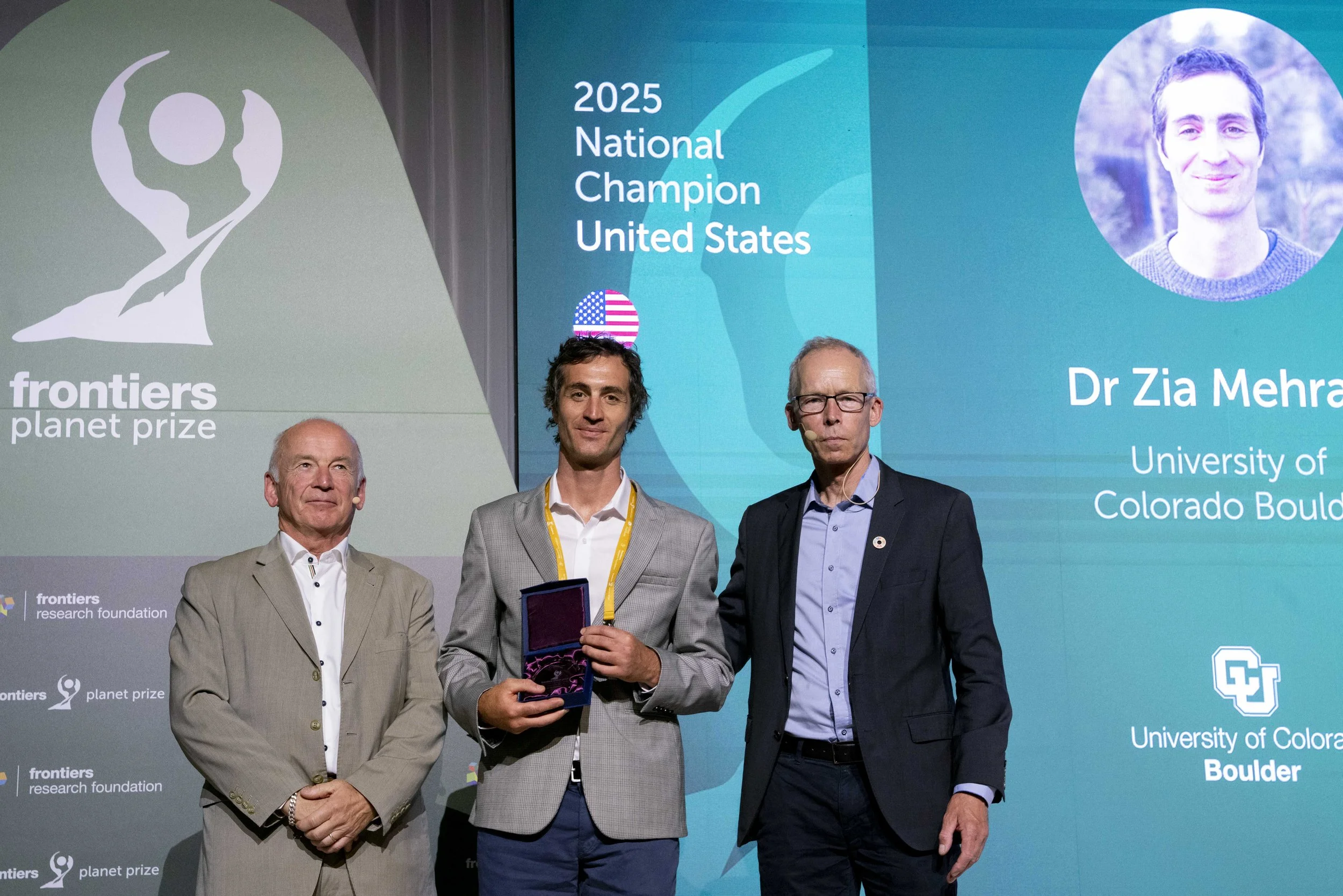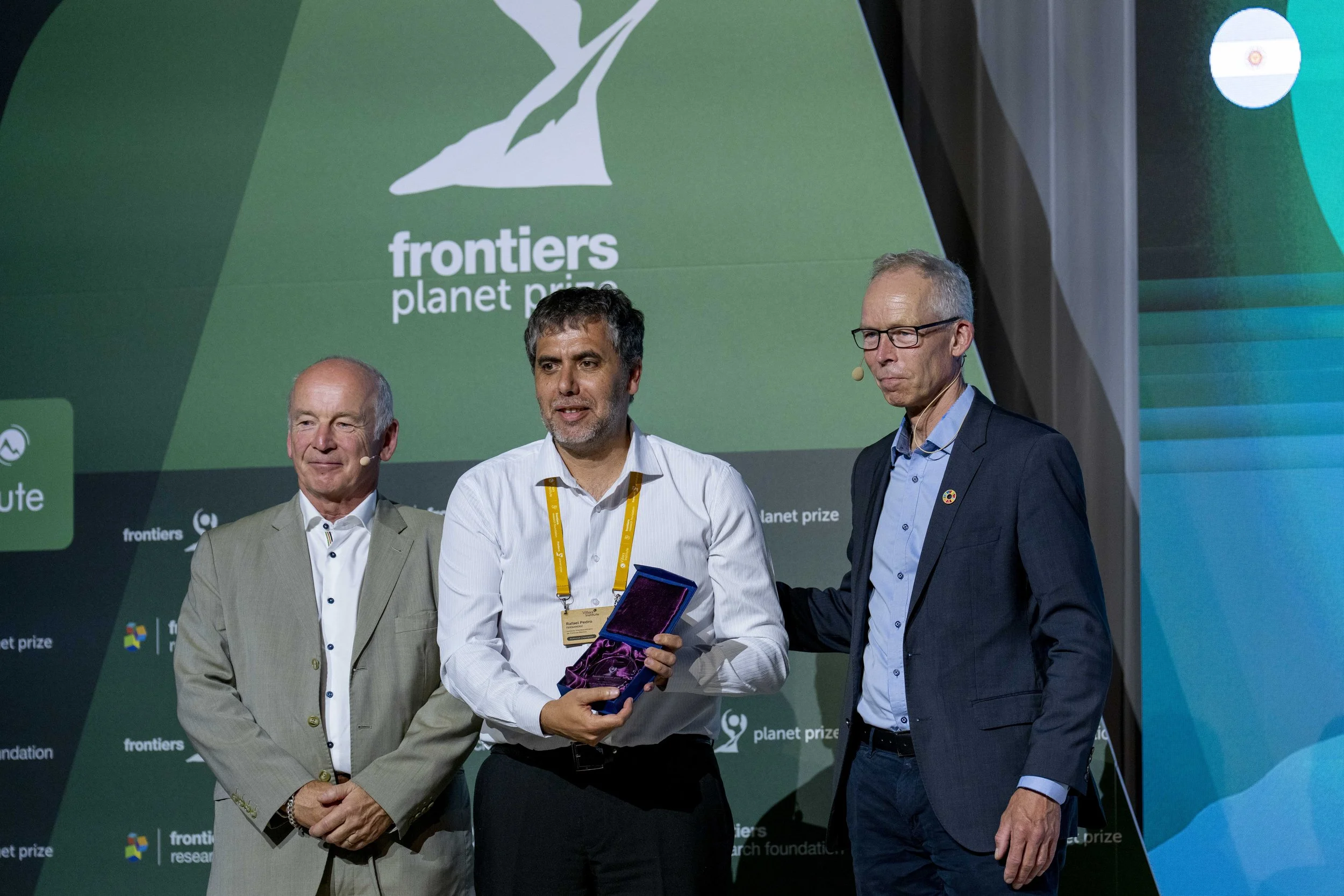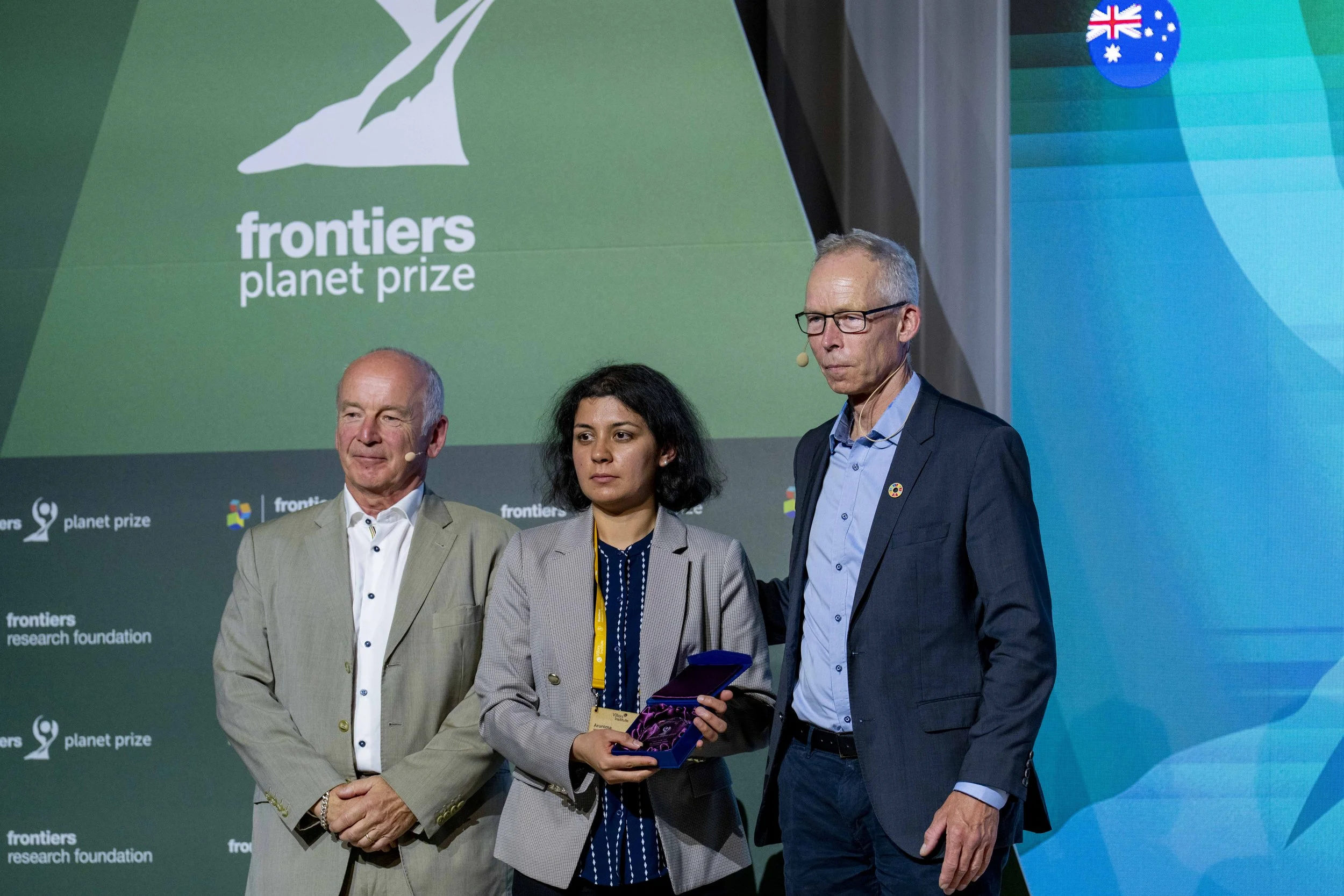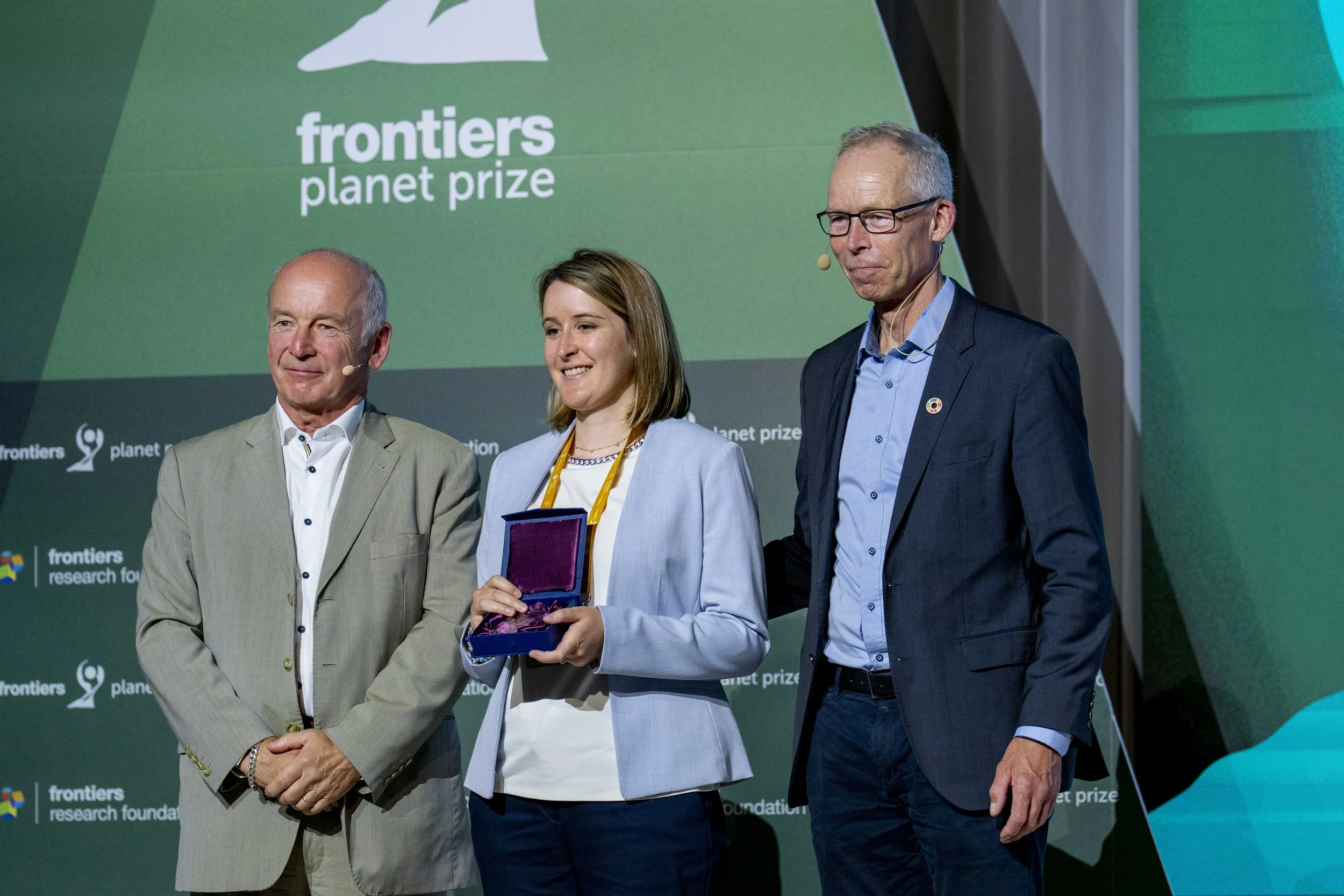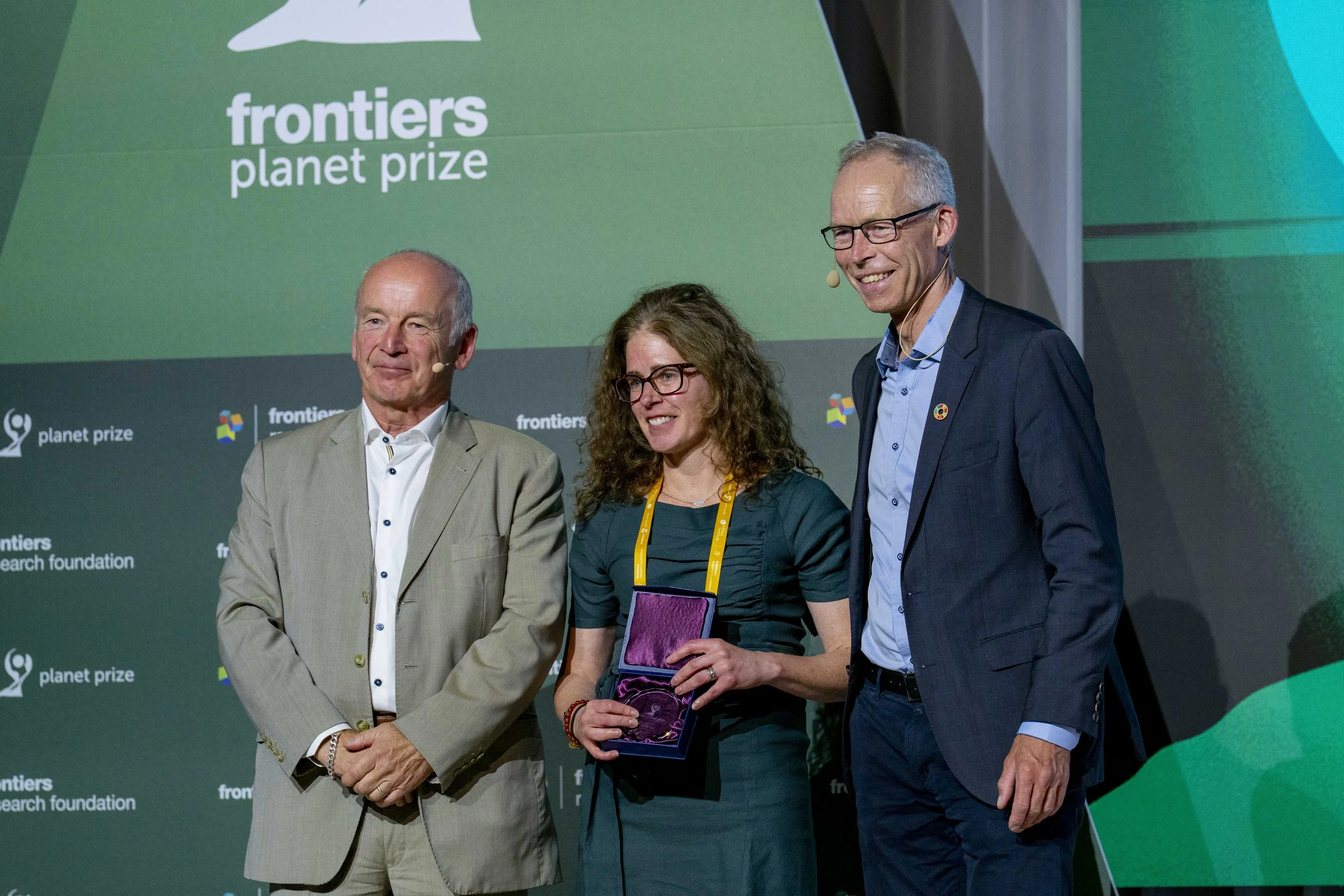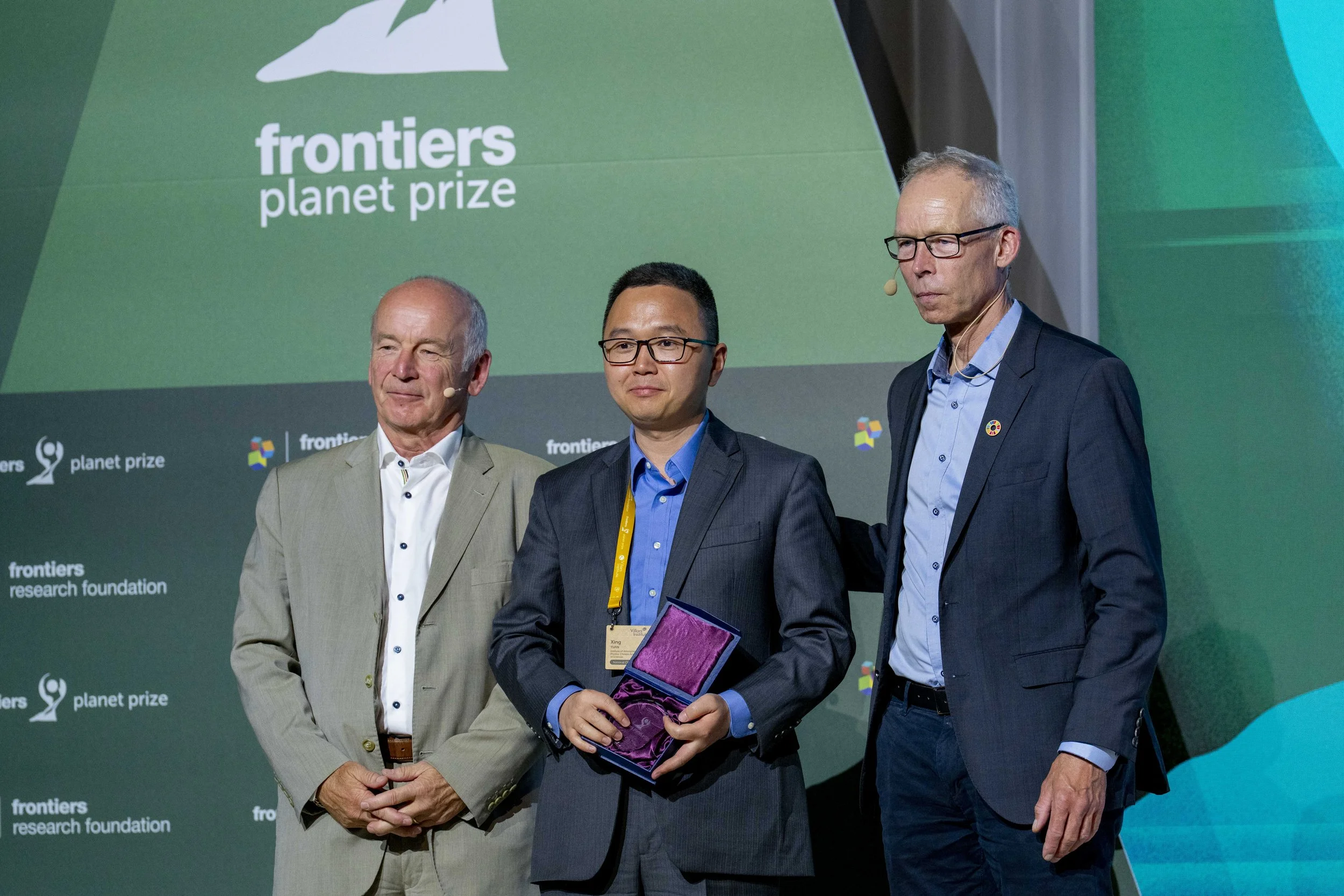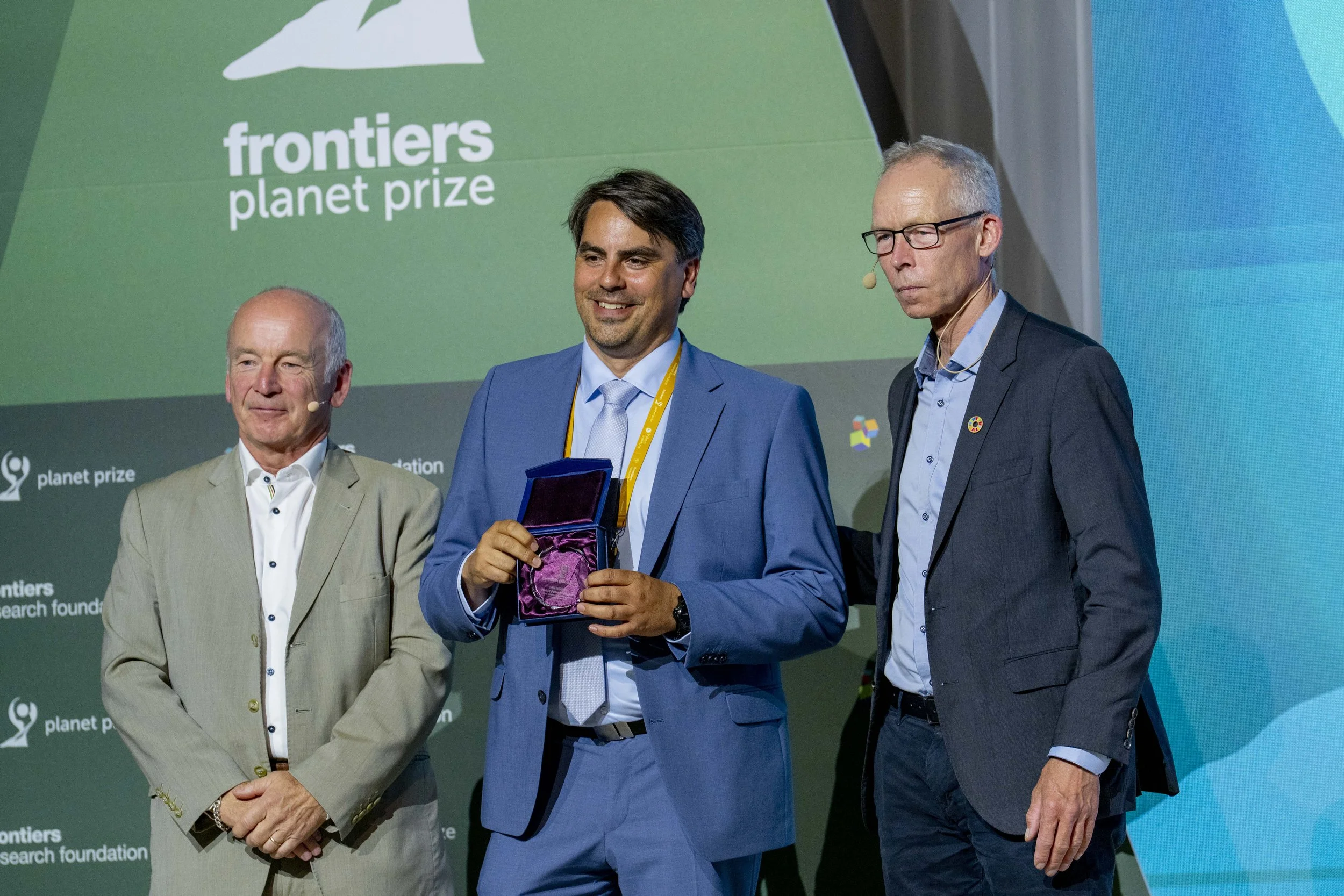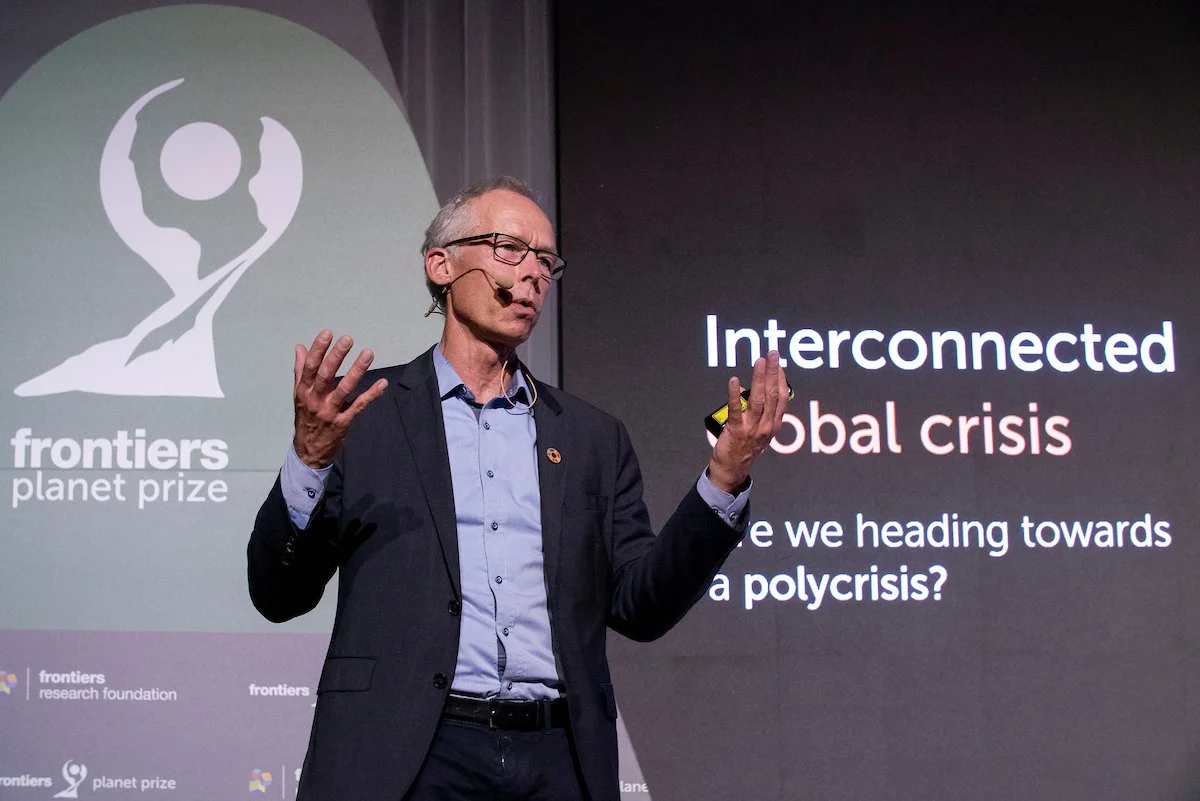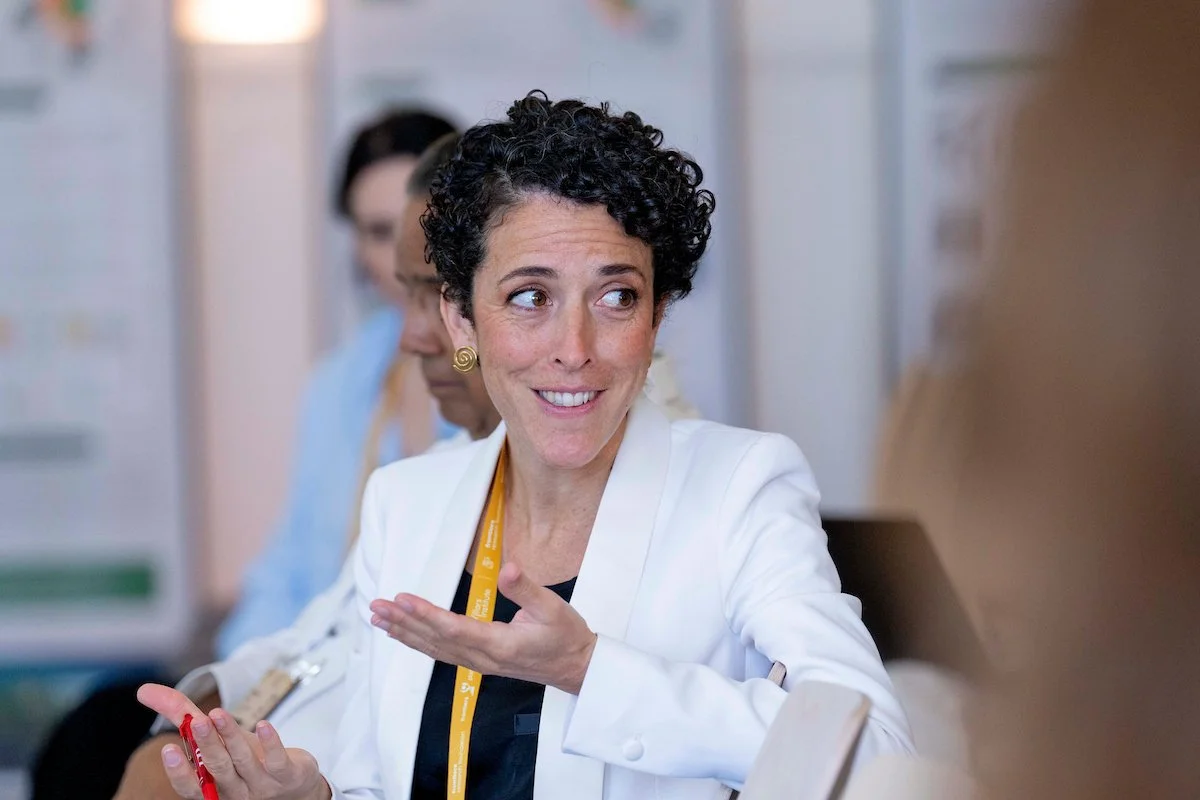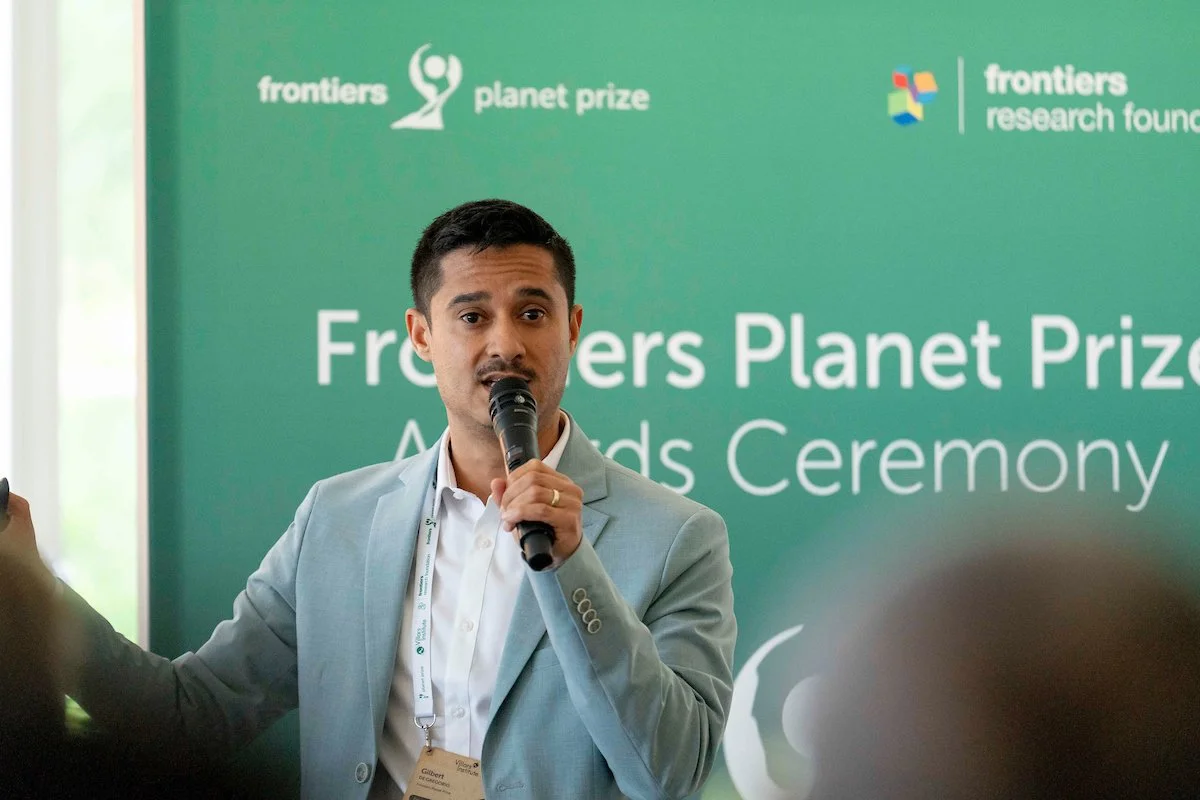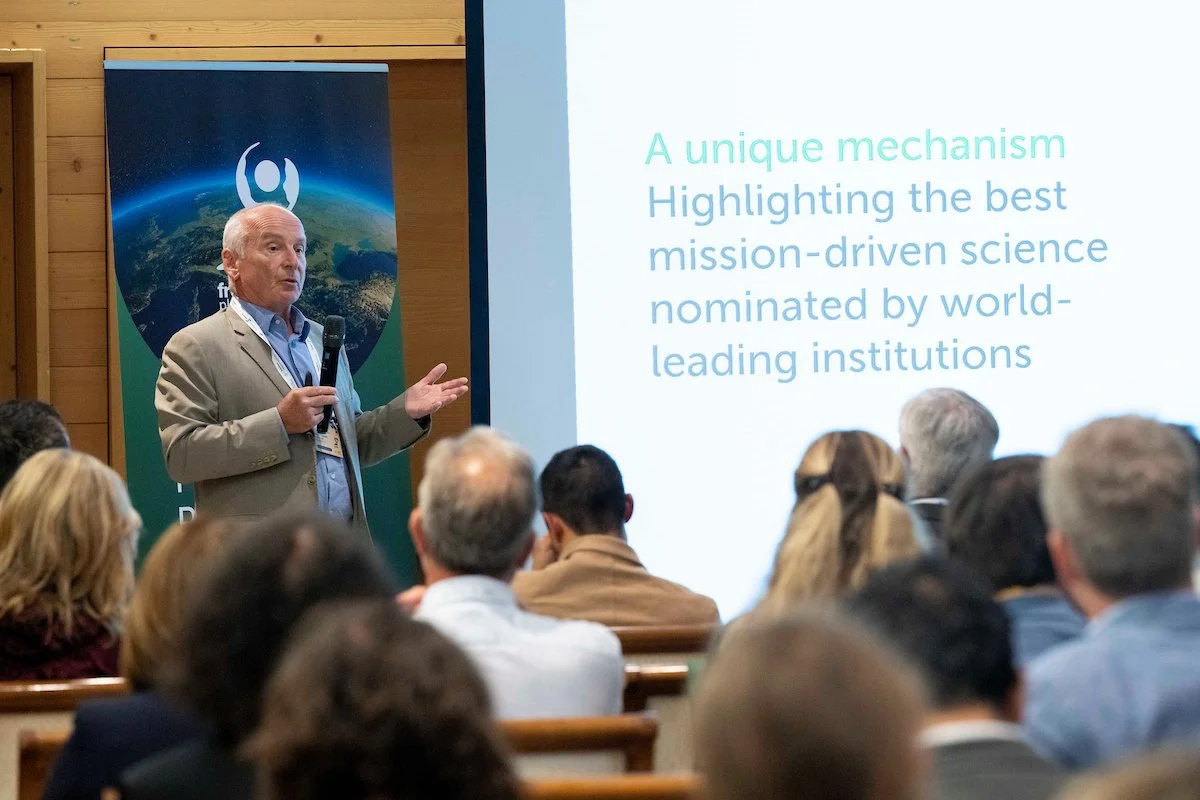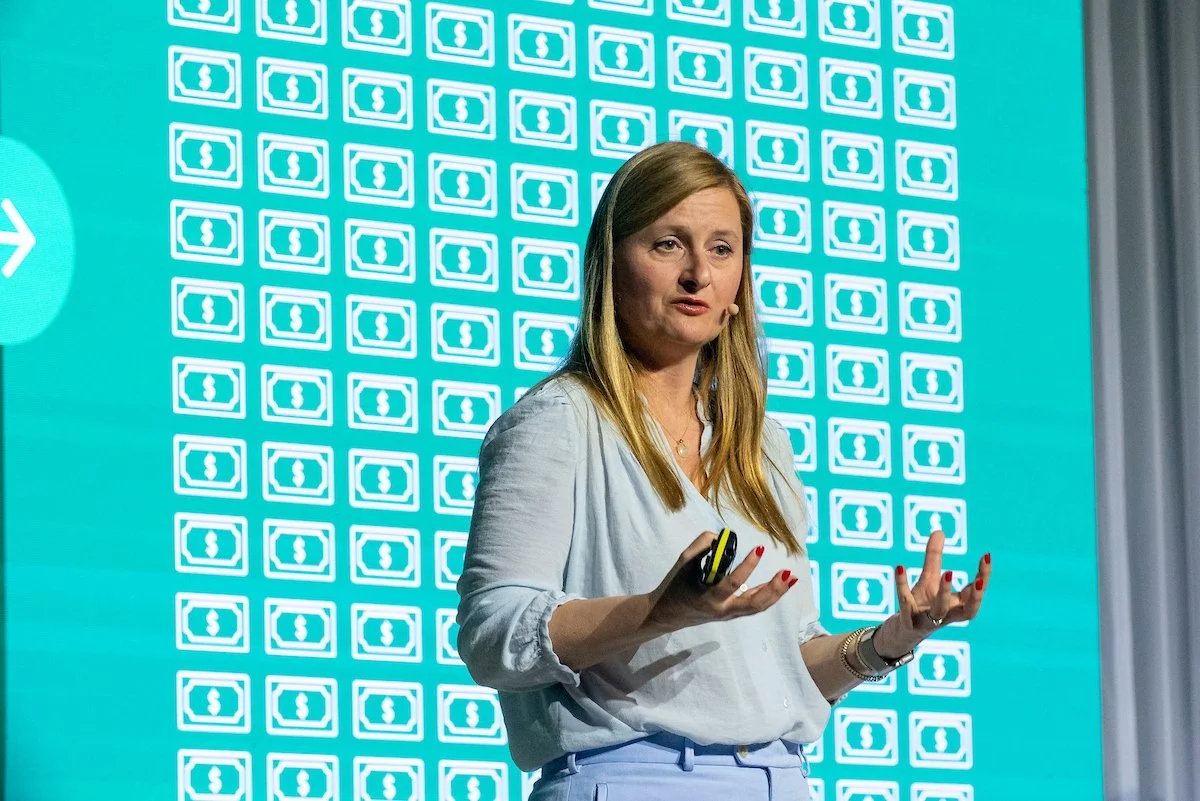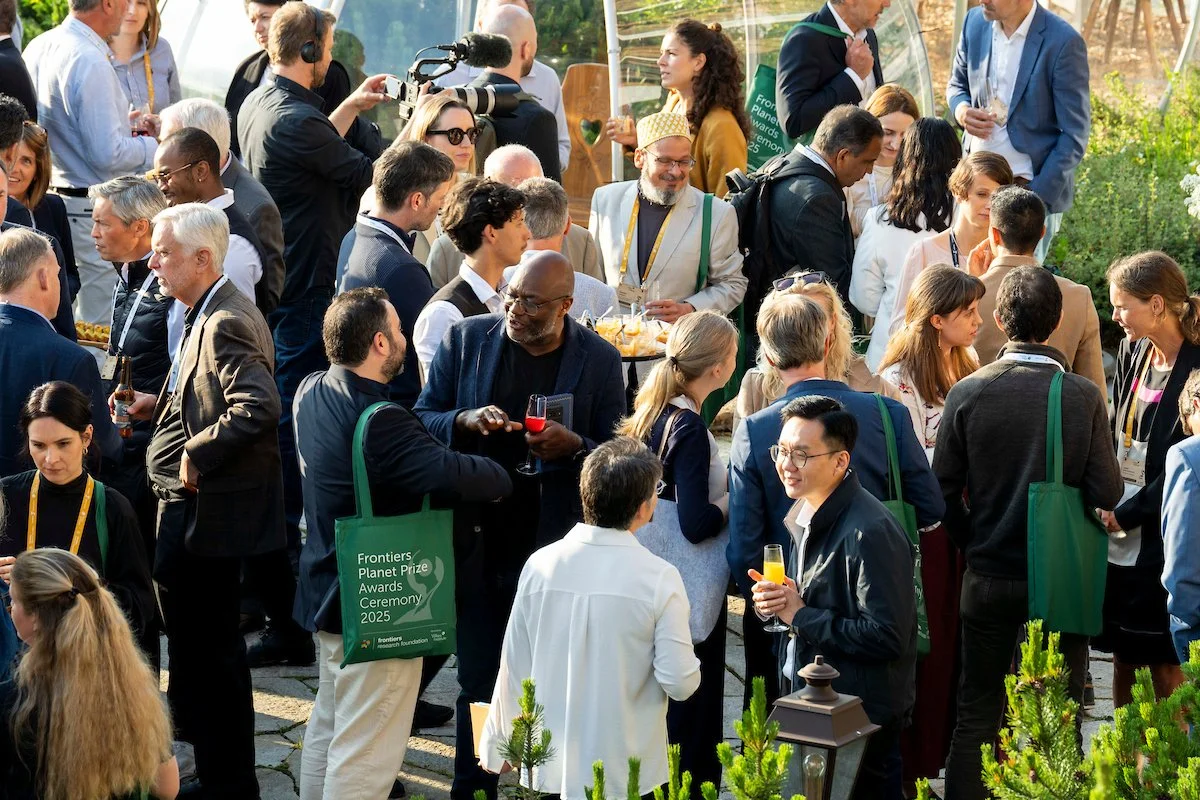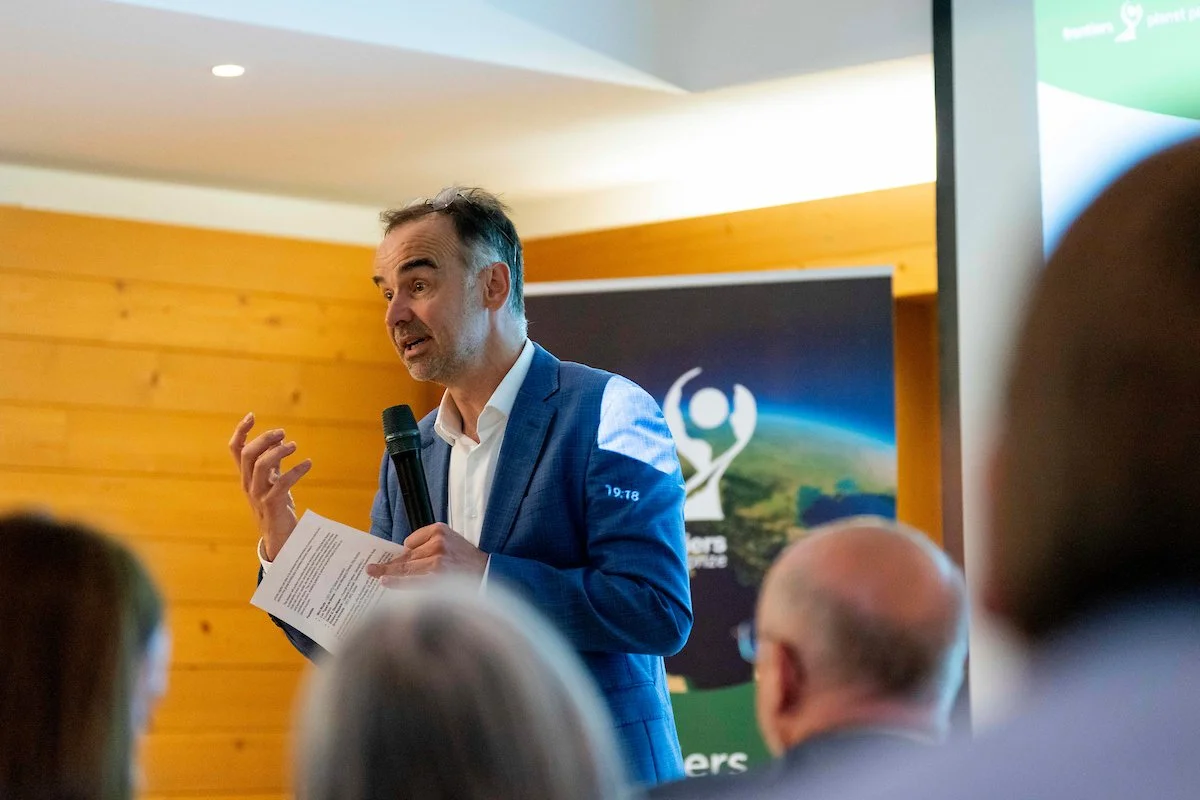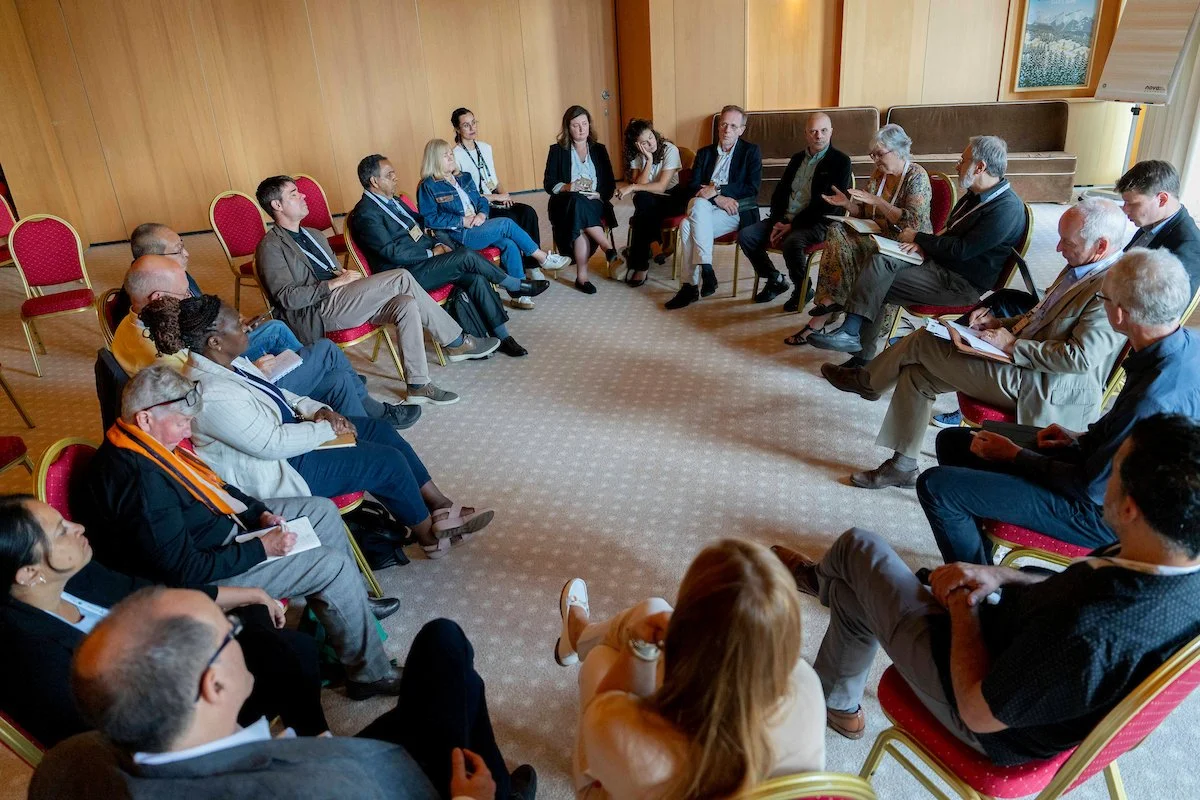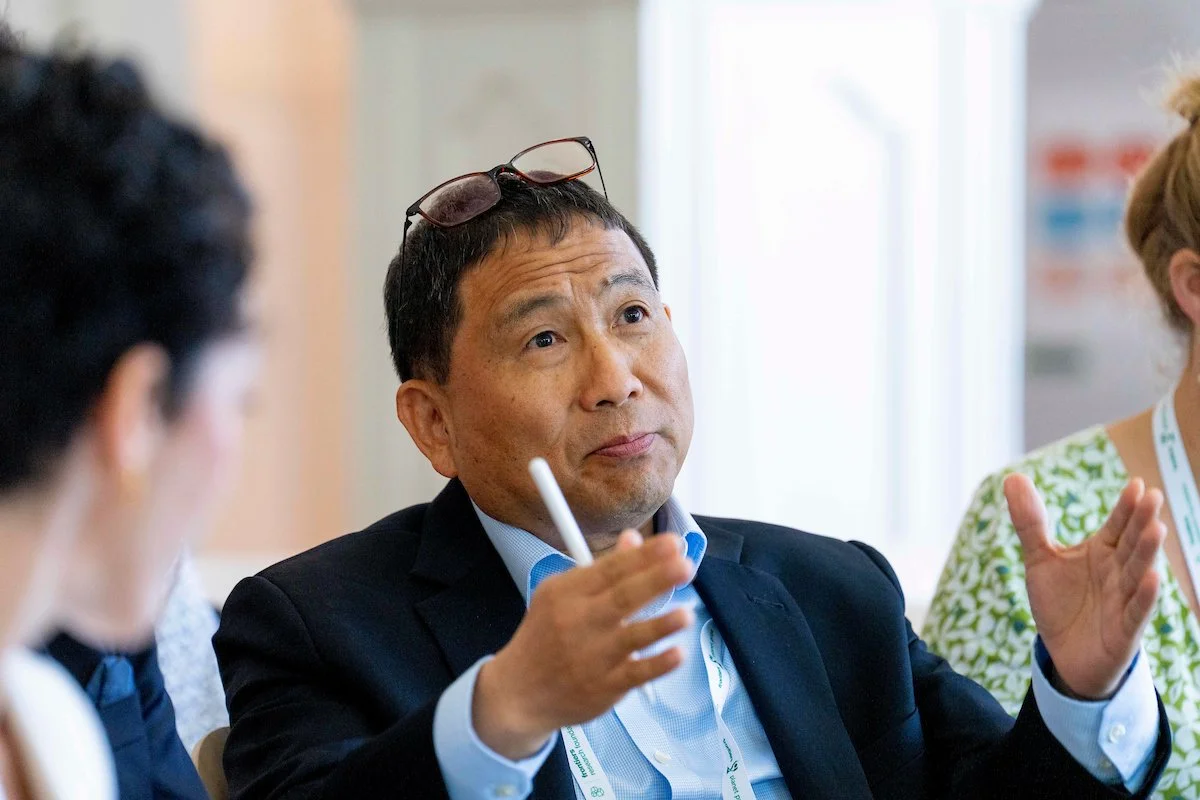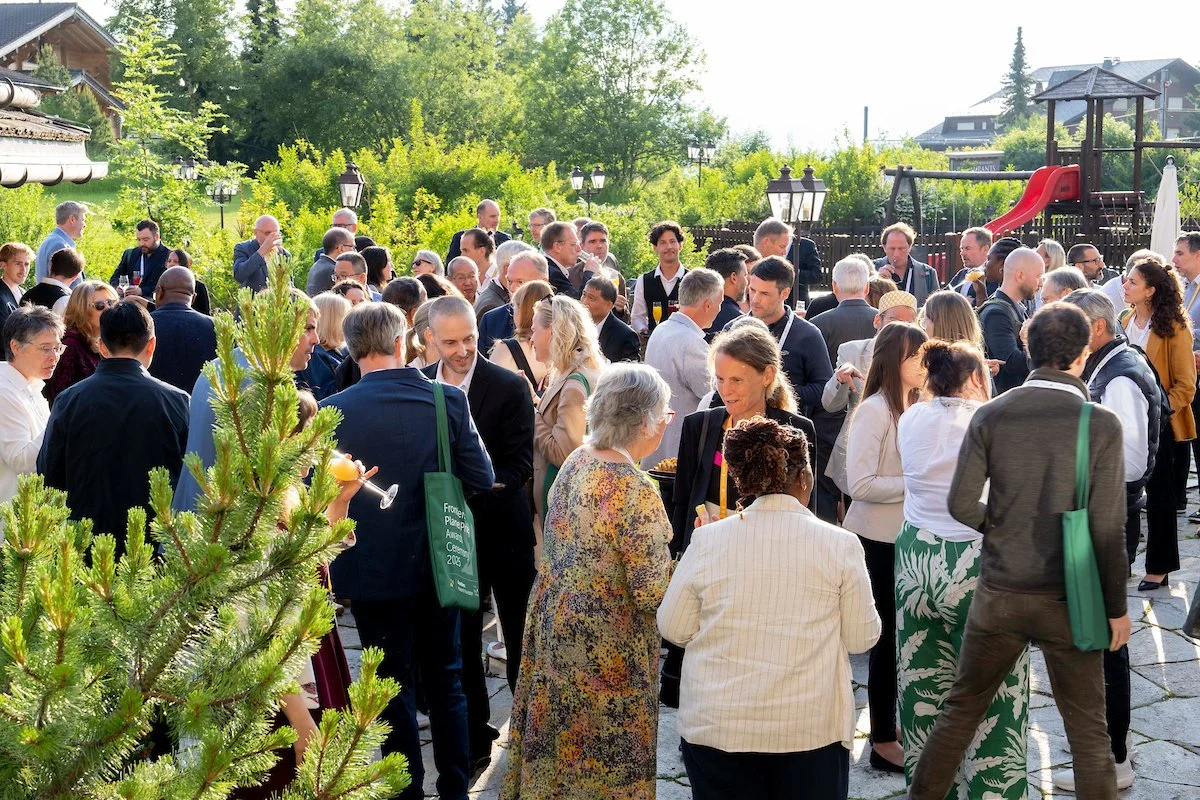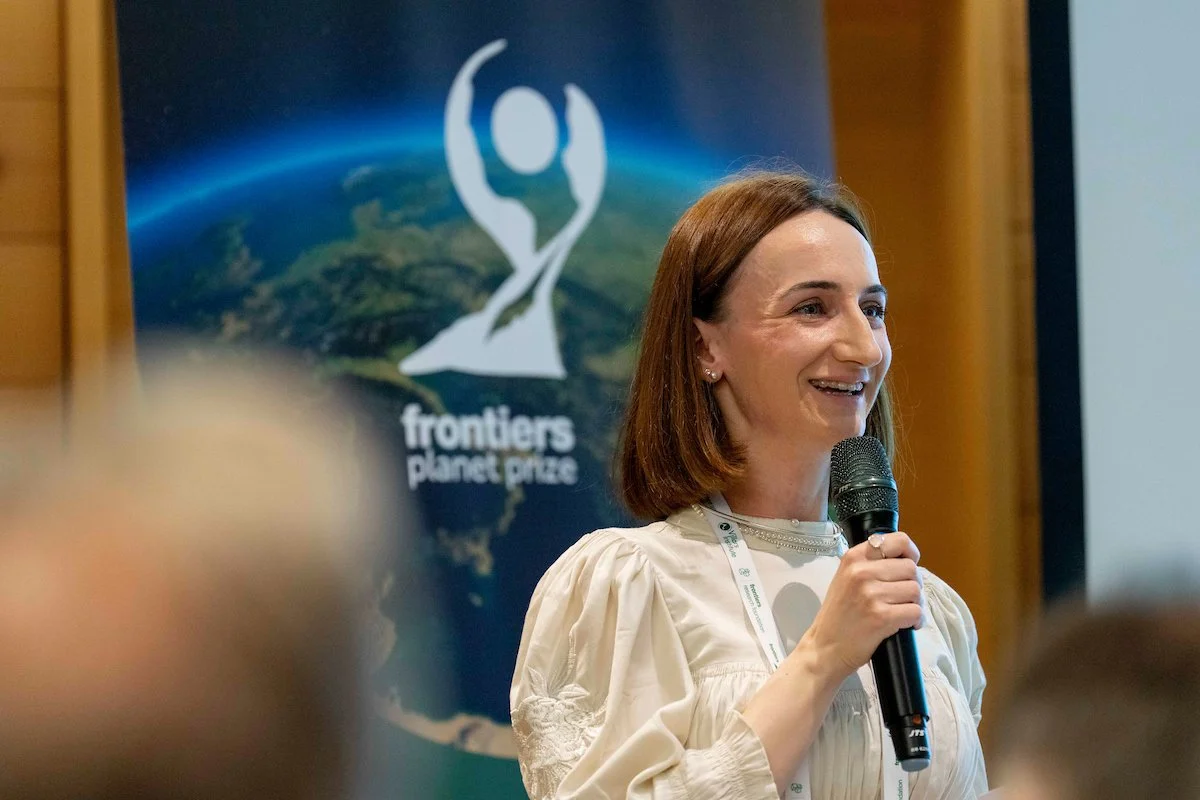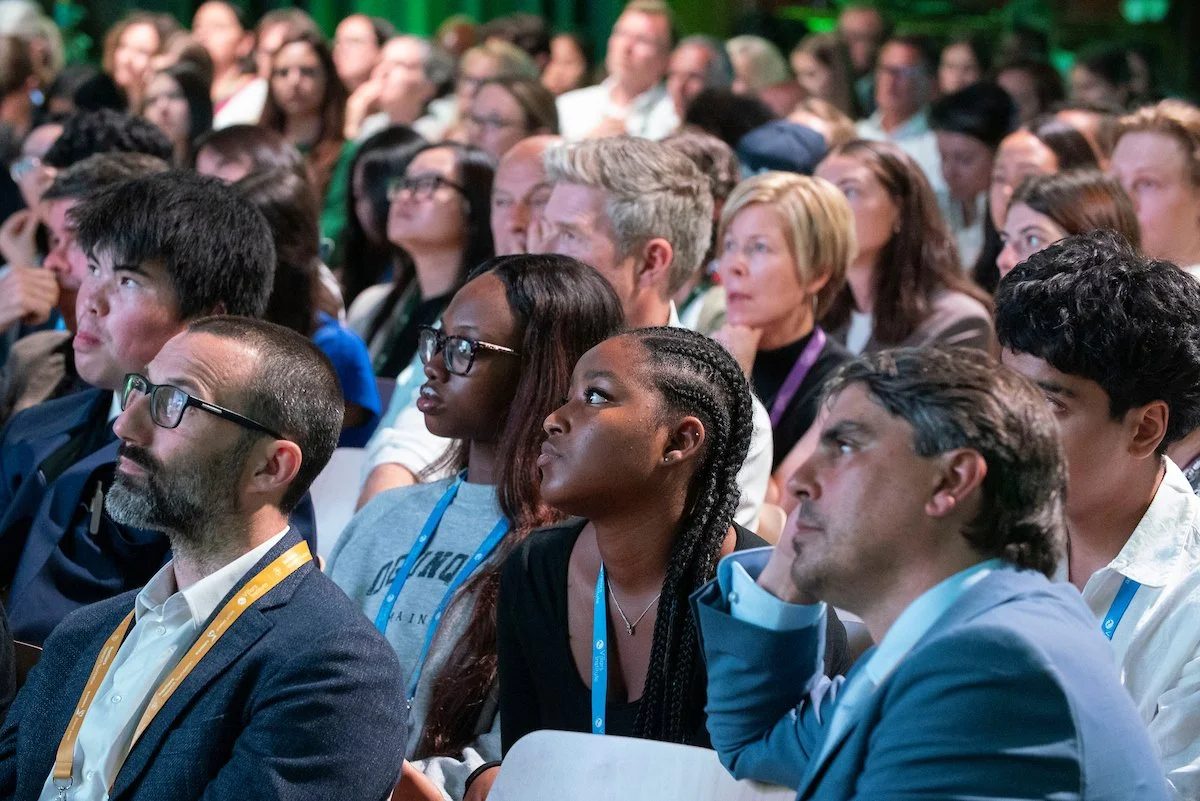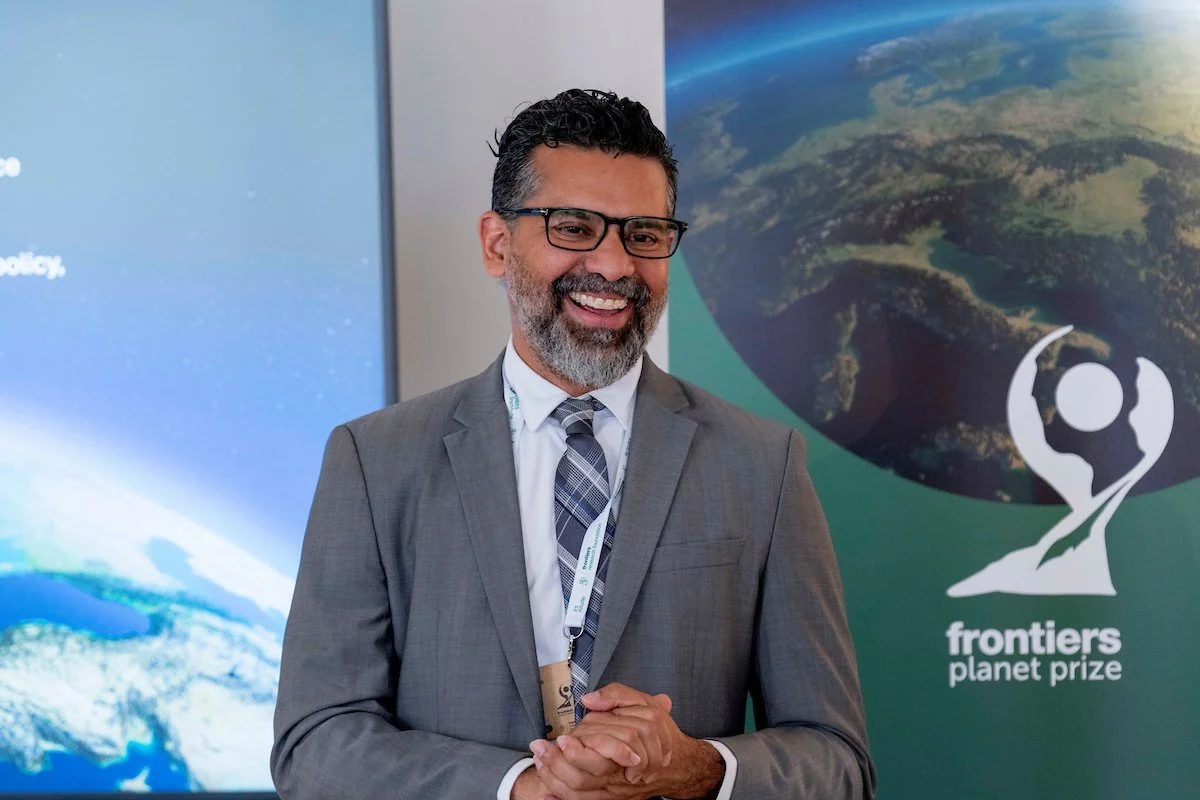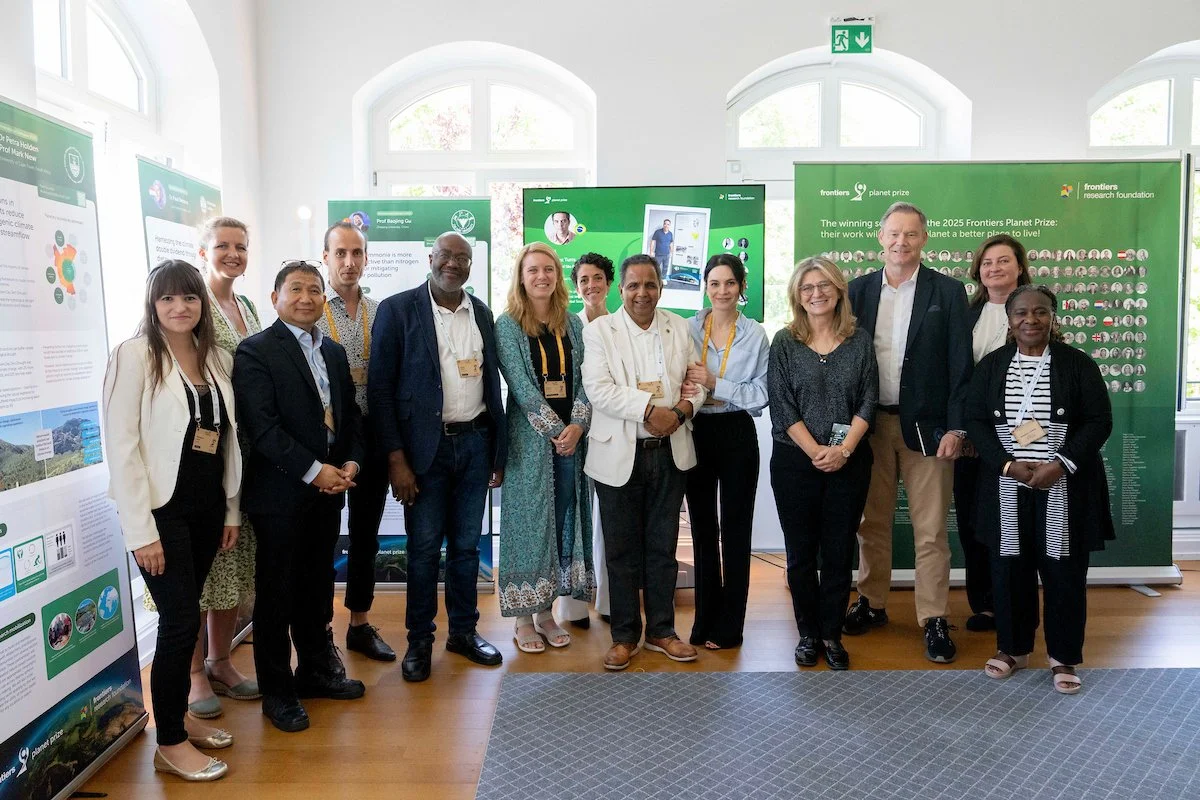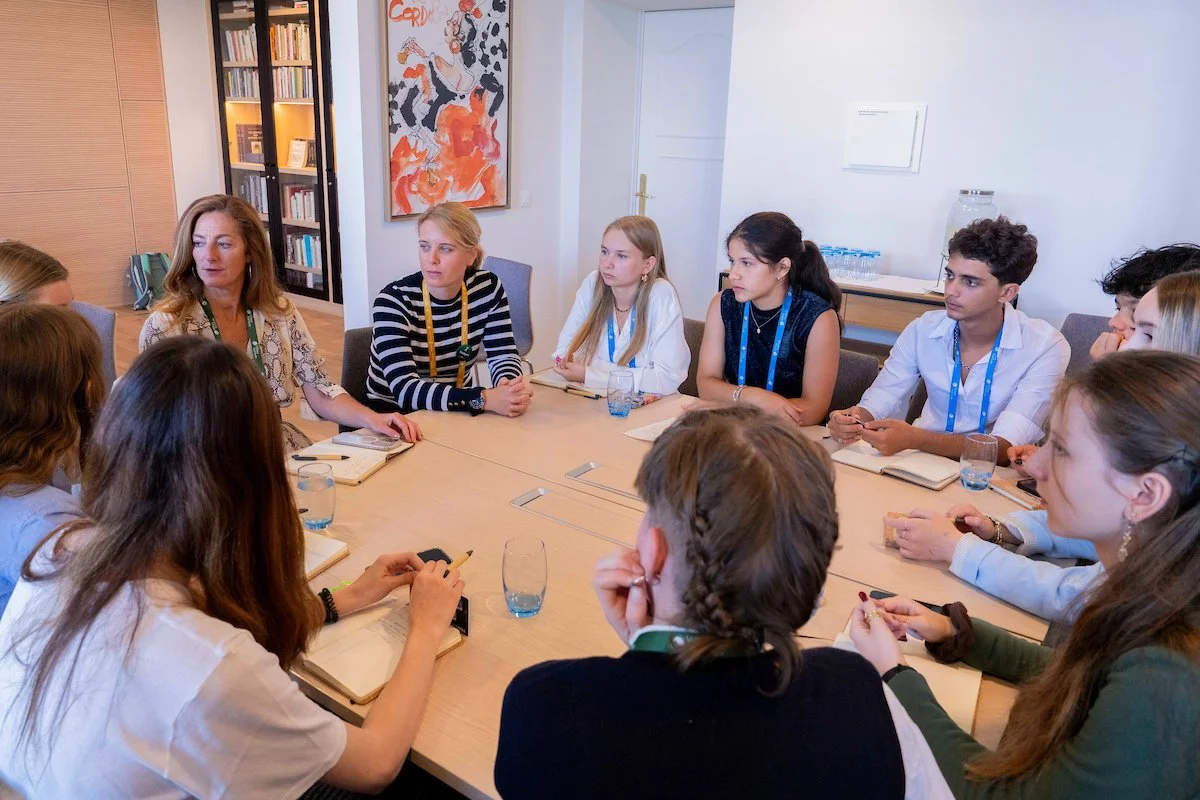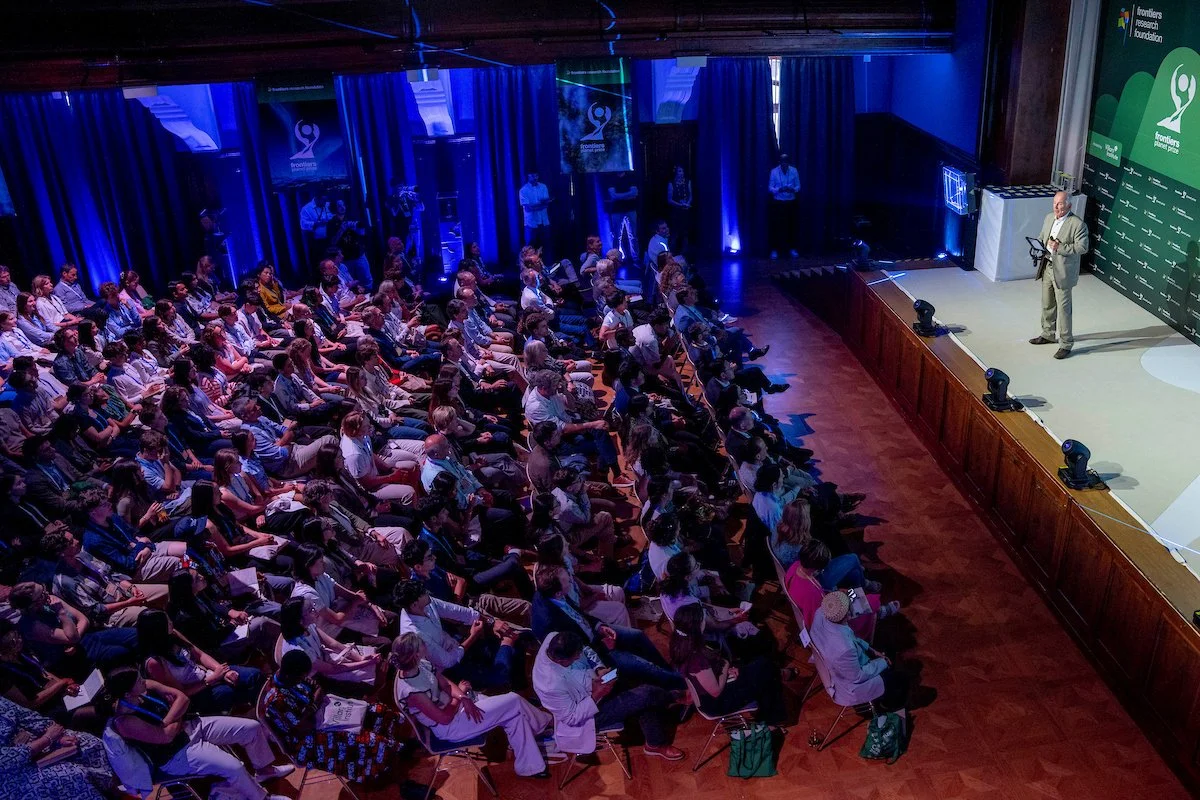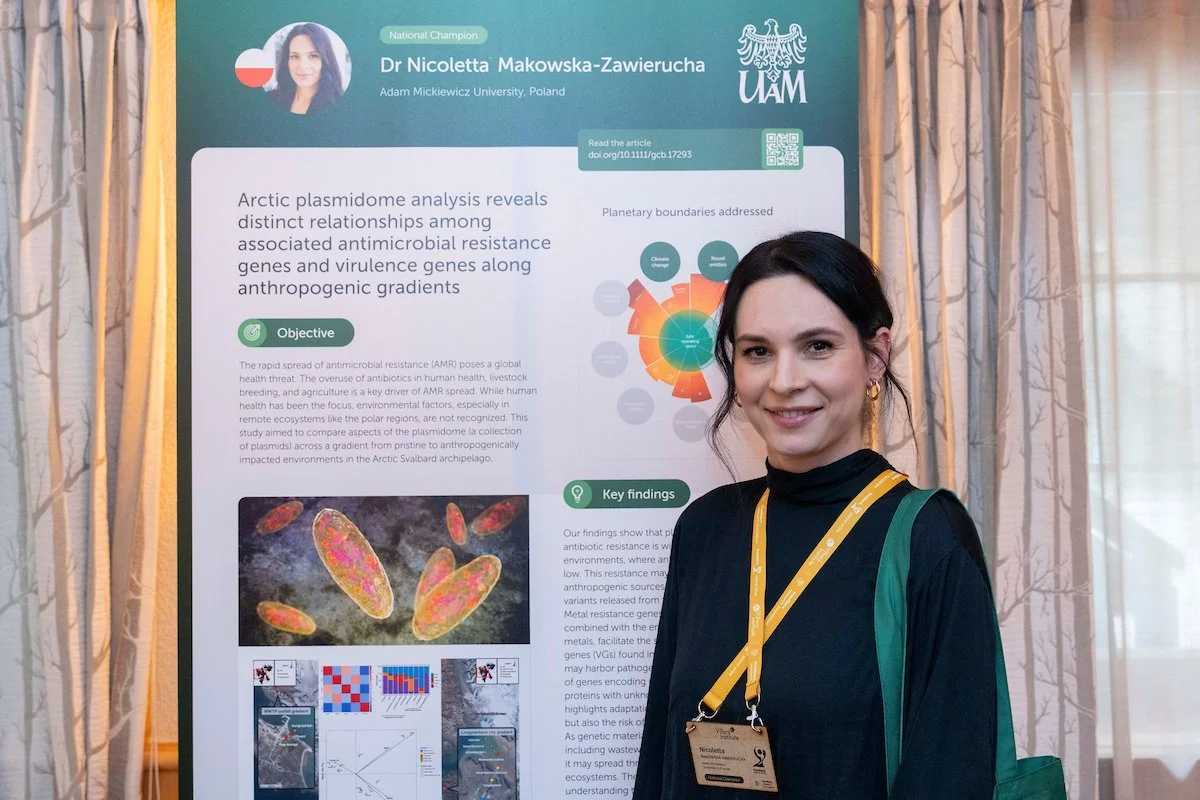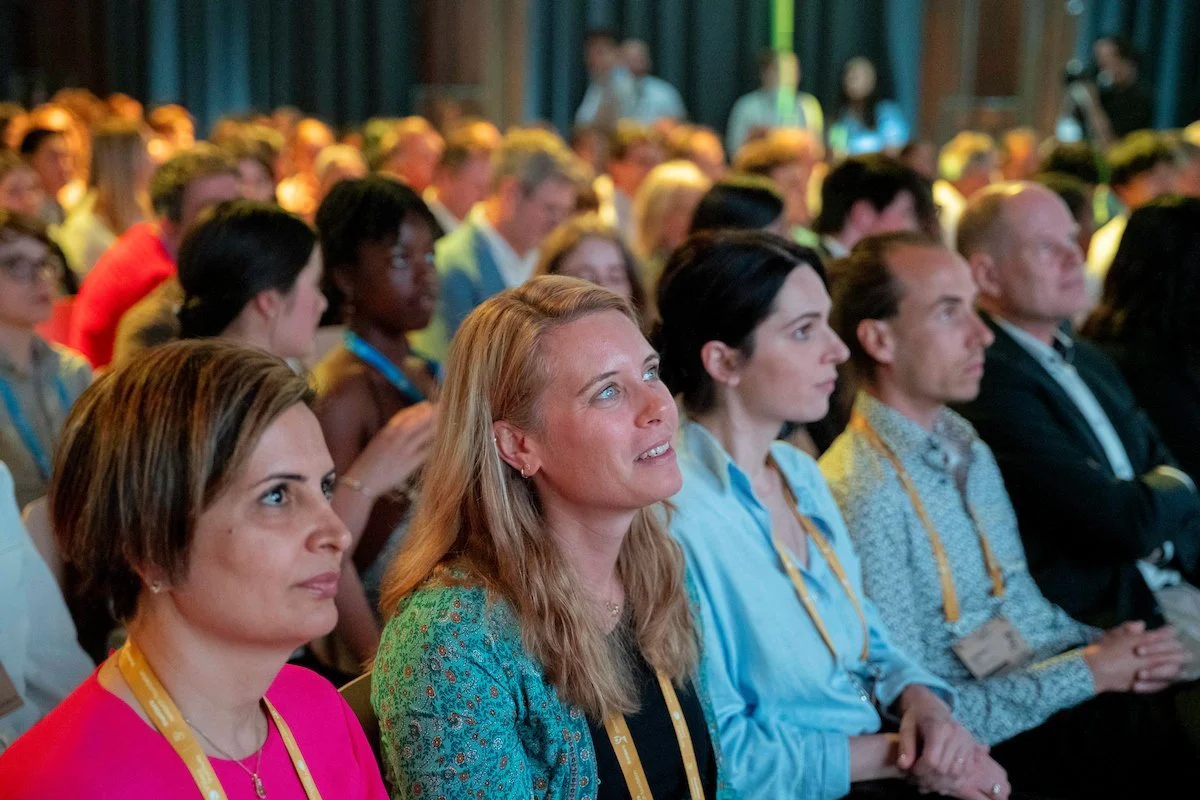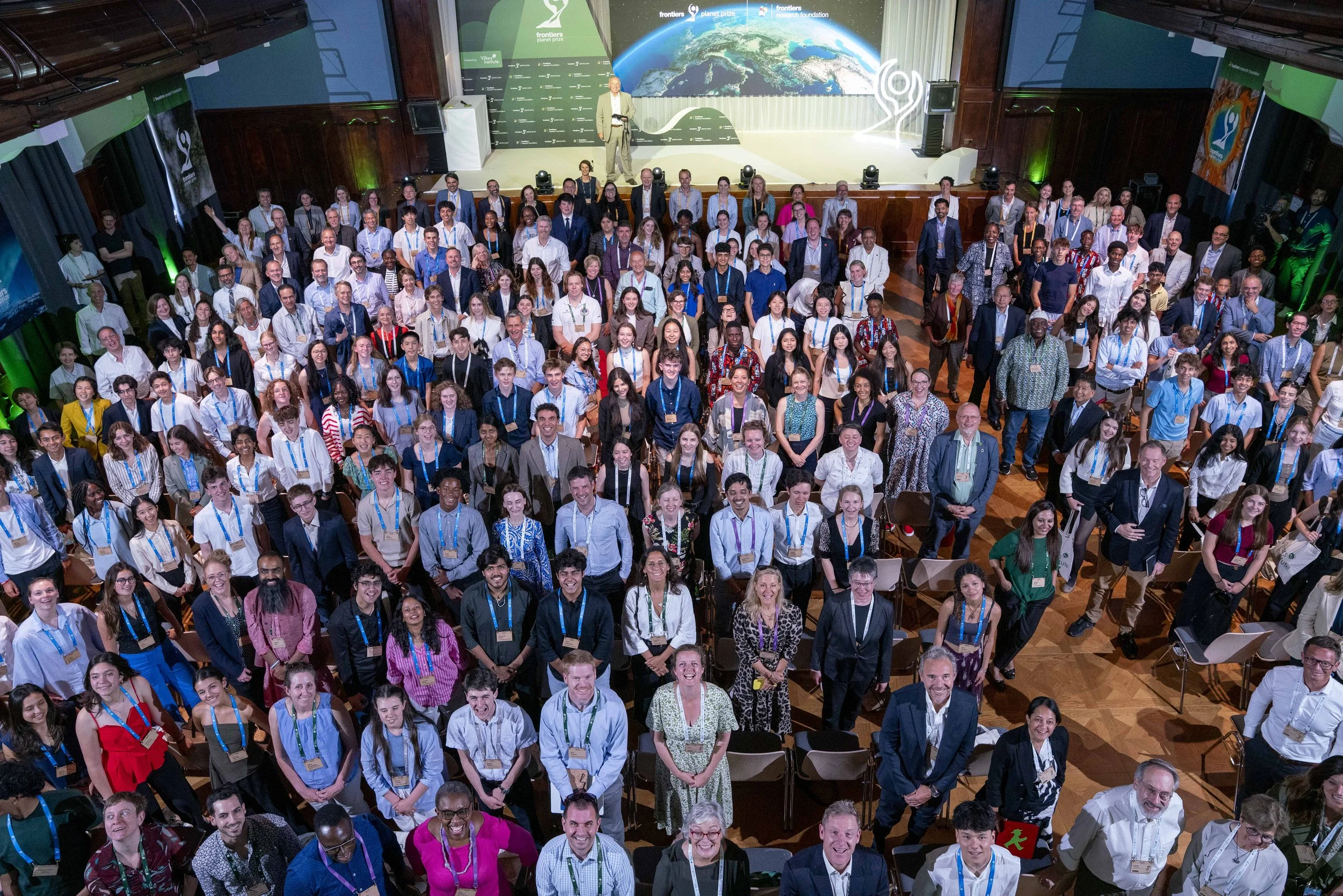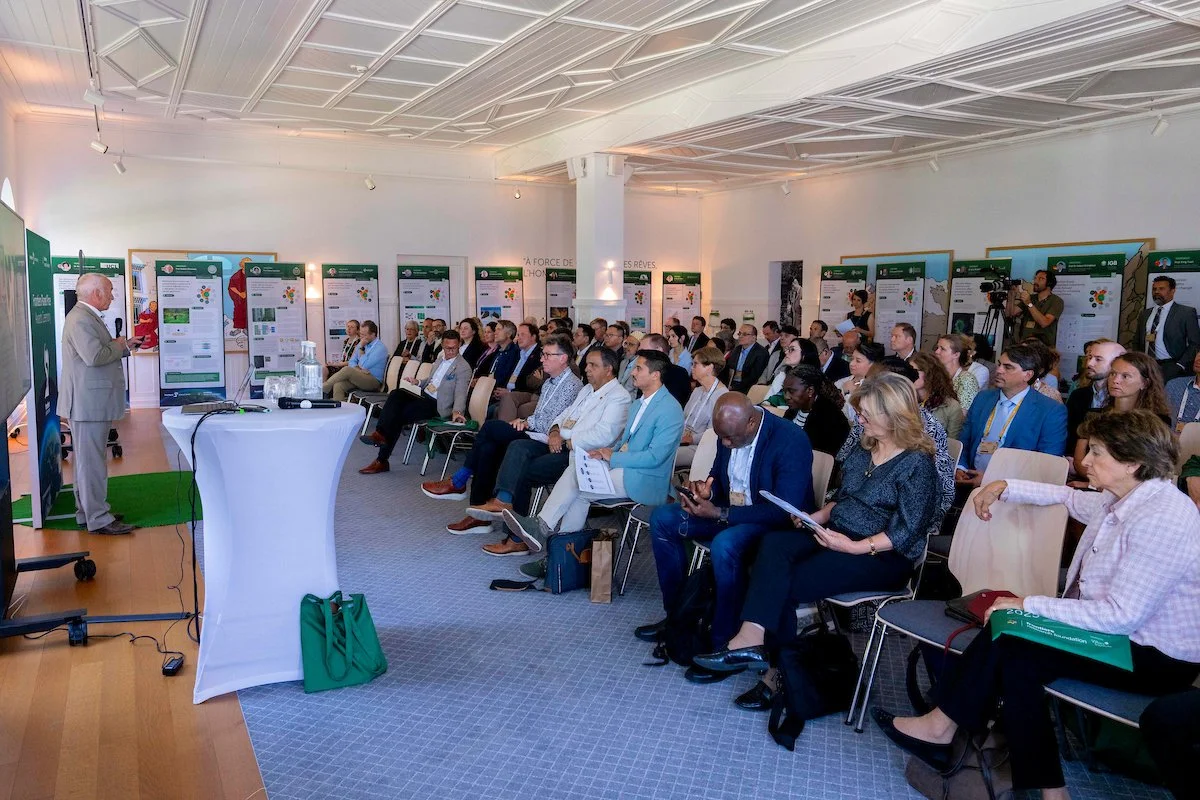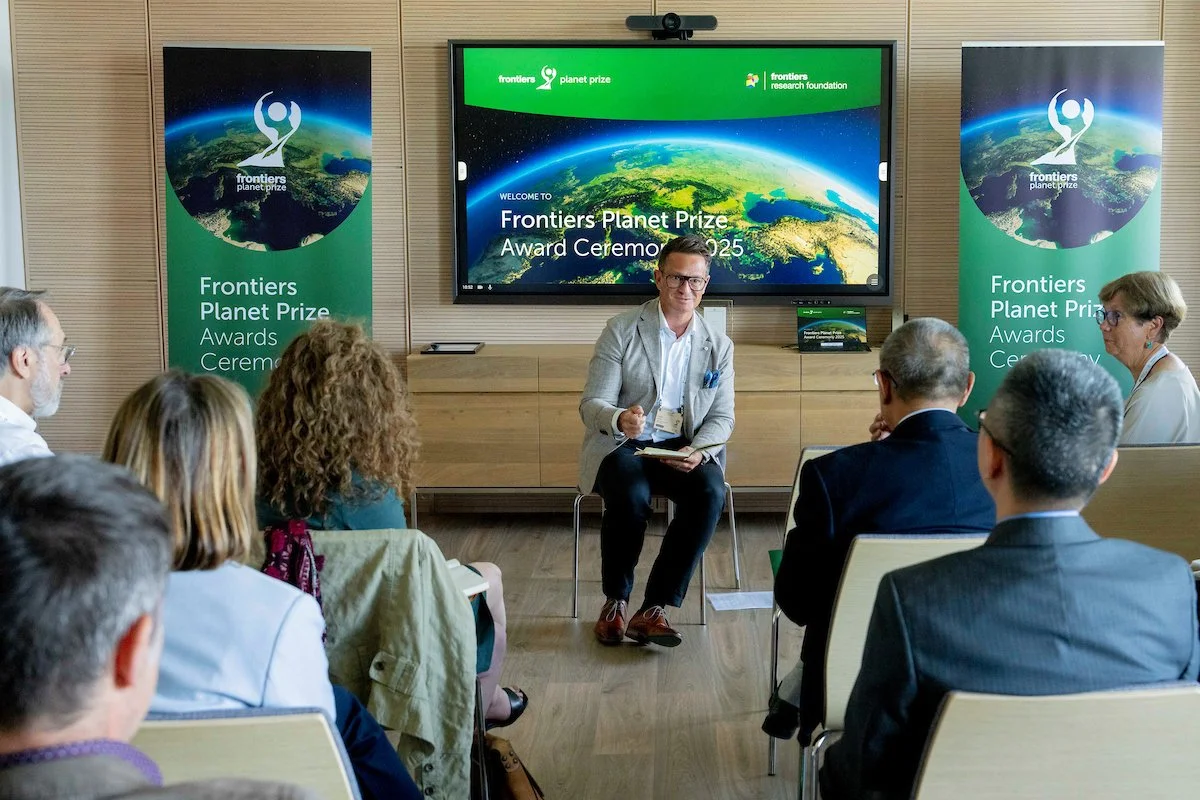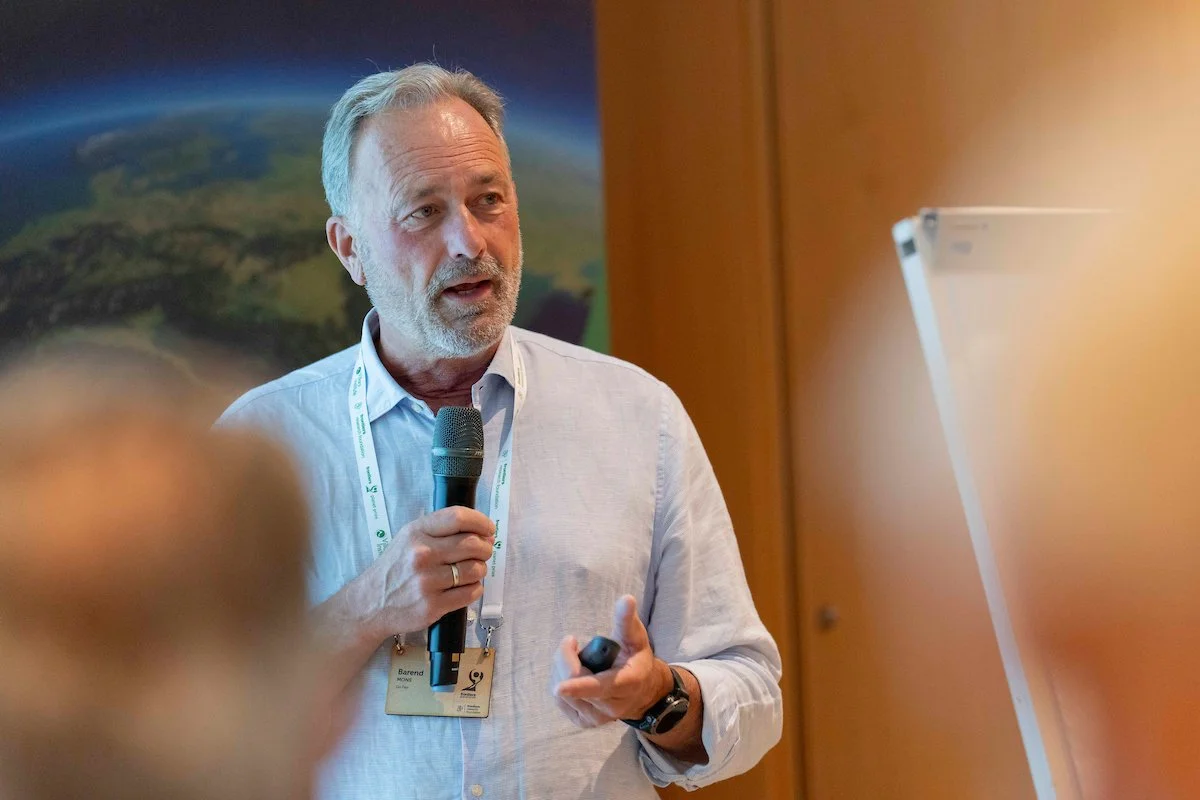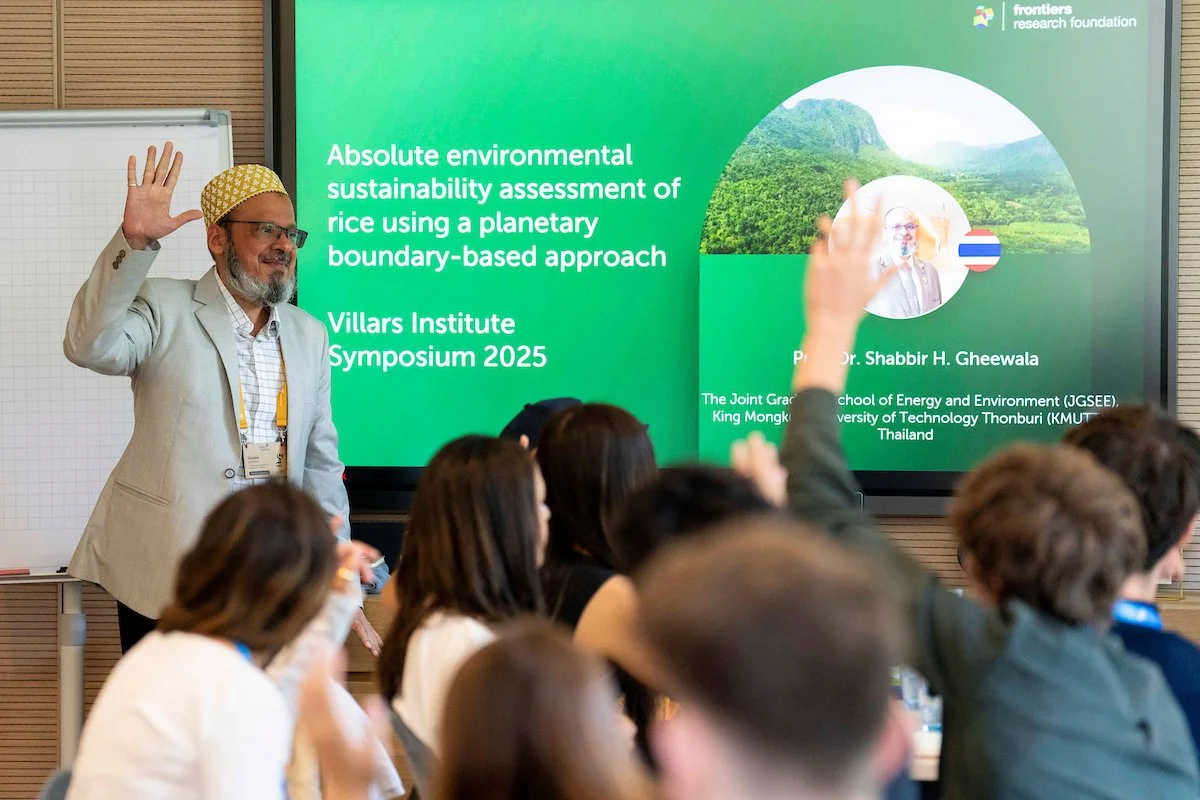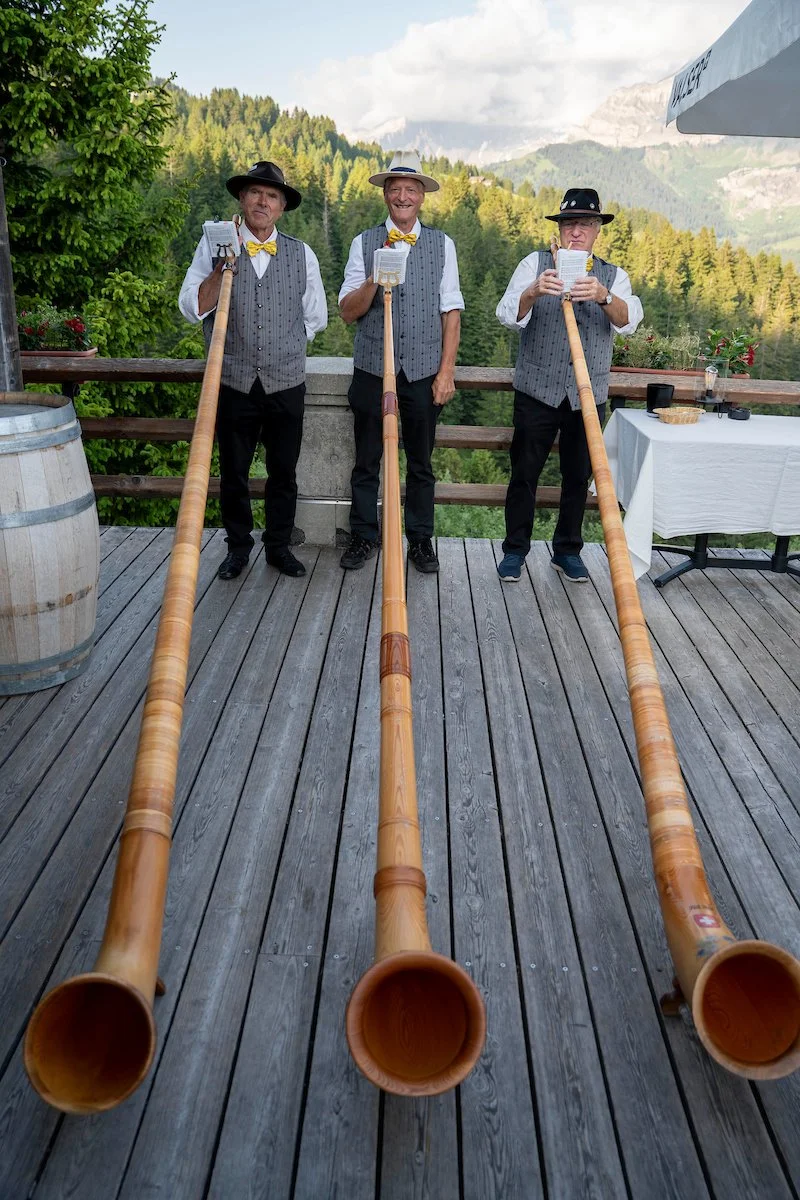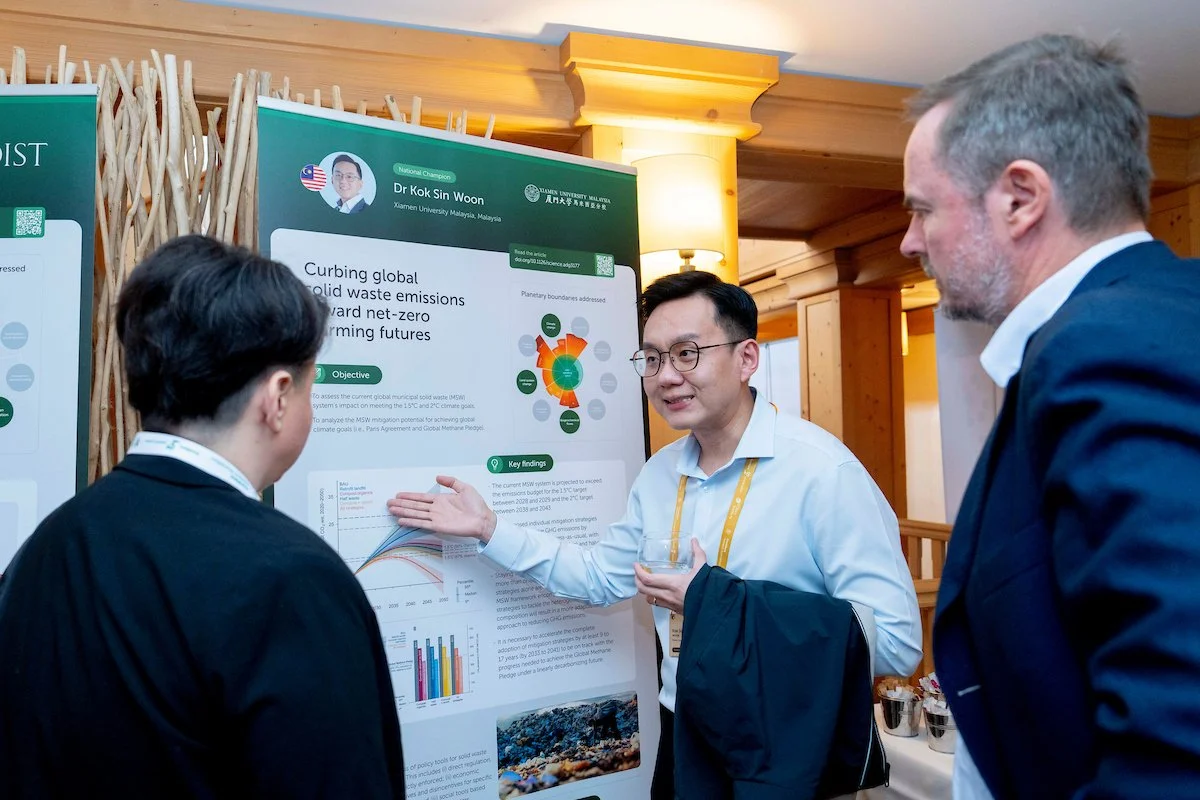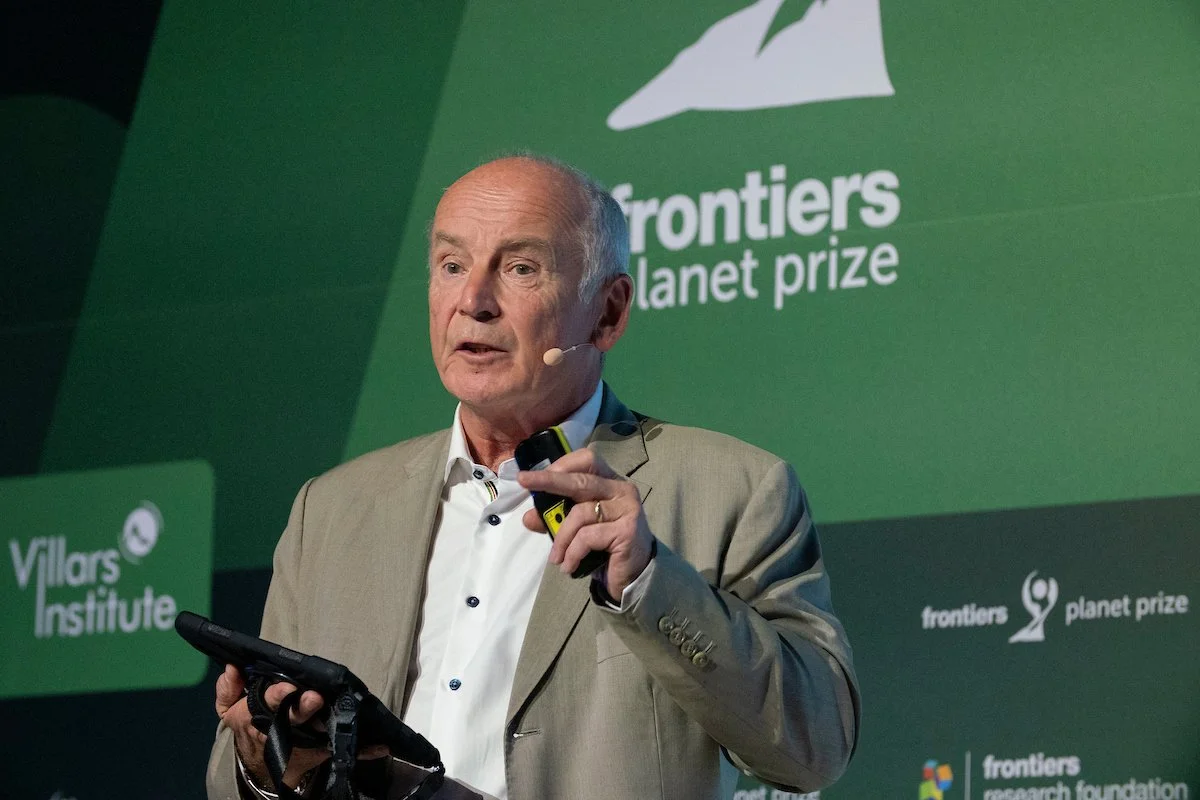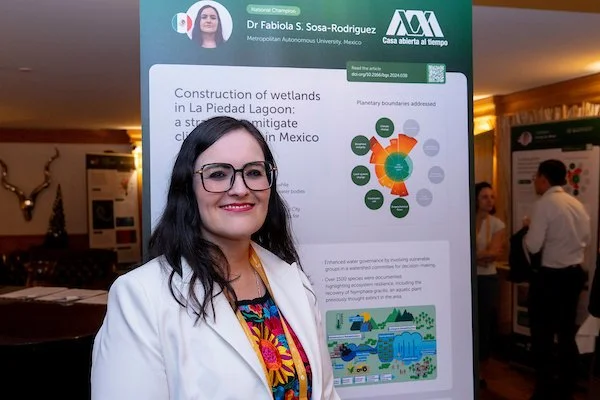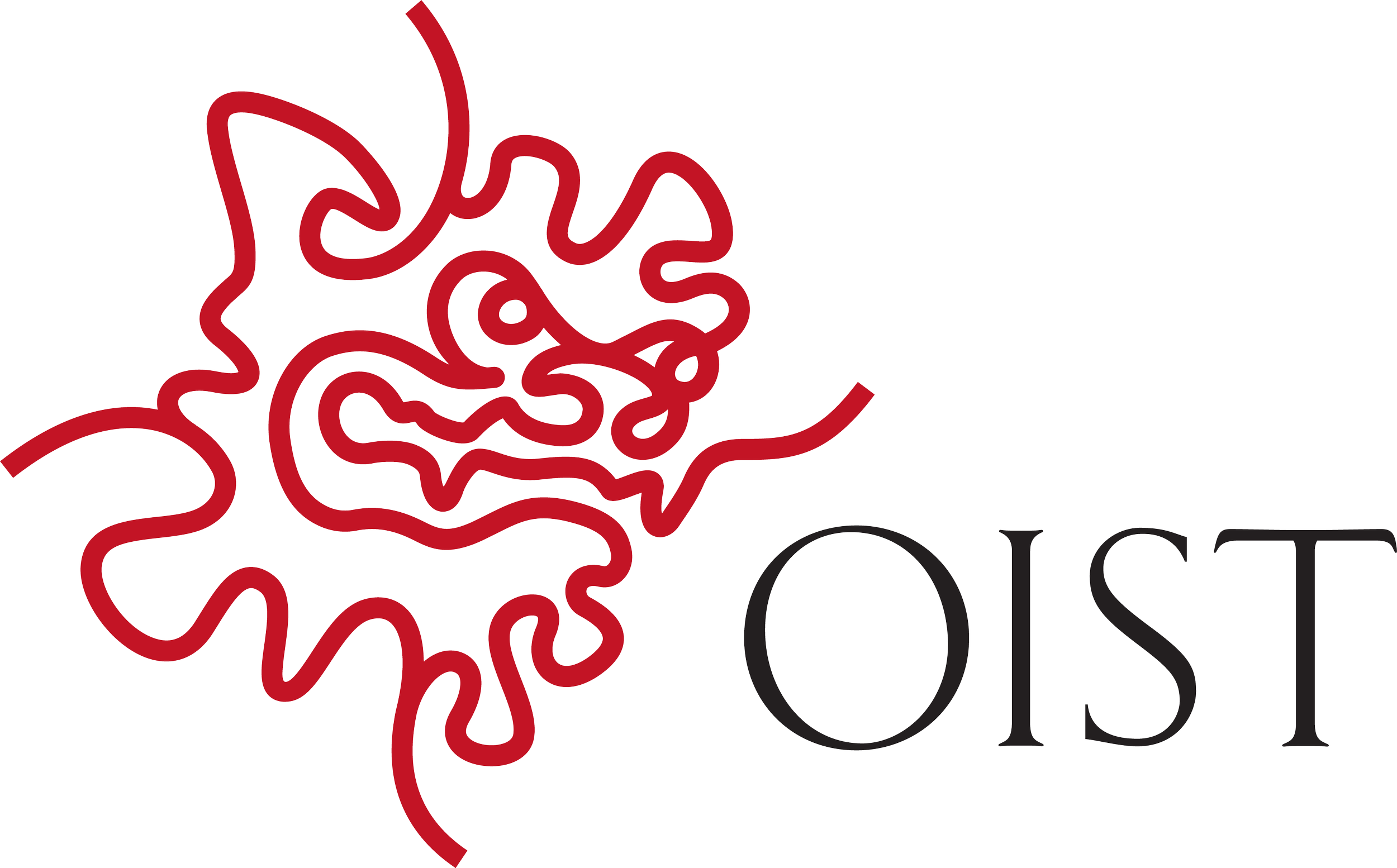The Champions of the third edition
The International Champions of the third edition of the Frontiers Planet Prize were announced this year on June 17th, during the Awards Ceremony, in Villars-sur-Ollon, as part of the Villars Symposium.
Meet the 3rd edition International Champions
Australia
The University of Sydney
Dr Arunima Malik
Polarizing and equalizing trends in international trade and Sustainable Development Goals
-
Biography
I am Arunima Malik, an academic at the University of Sydney. I aim to assess the sustainability performance of regions, sectors, industries and businesses by investigating their supply chain networks. Using big data computational models, I answer questions about direct and indirect supply chain impacts associated with consumer demand at local, national and global scales. My interdisciplinary research spans the fields of Science, Business, Public Health, Engineering and Social Sciences to yield new outcomes that highlight the impact of humans on the environment and society, and our progress towards the United Nations SDGs. I have worked on research topics related to international supply chain spillover effects of trade, healthcare sustainability and food production and consumption networks.Planetary Boundaries addressed
Biosphere integrity, Climate change, Freshwater change, Land system change, Biogeochemical flows
Published in
Nature SustainabilityContributing authors
Arunima Malik(1,2,3), Manfred Lenzen(1,11), Mengyu Li(1), Camille Mora(1,2,4,5), Sarah Carter(6), Stefan Giljum7, Stephan Lutter(7), Jorge Gómez-Paredes (8,9,10)
1 The University of Sydney, ISA, School of Physics, Sydney, New South Wales, Australia.
2 The University of Sydney, Discipline of Accounting, Sydney Business School, Sydney, New South Wales, Australia.
3 The University of Sydney, The University of Sydney Nano Institute, Faculty of Science, Sydney, New South Wales, Australia.
4 Climate Change Research Center, University of New South Wales
5 ARC Center of Climate Extremes, University of New South Wales, Australia
6 Faculty of Health, Charles Darwin University, Darwin, Australia
7 Institute for Ecological Economics, Vienna University of Economics and Business (WU), Vienna, Austria
8 Novia University of Applied Science, Campus Raseborg, 10600 Raseborg, Finland
9 Justus Liebig University Giessen, Center for International Development and Environmental Research (ZEU), Senckenbergstrasse 3, 35390 Giessen, Germany
10 Duke University, Earth & Climate Sciences Division, Nicholas School of the Environment, Durham NC 27708, USA
11 Hanse-Wissenschaftskolleg, Lehmkuhlenbusch 4, 27753 Delmenhorst, Germany
Sweden
KTH Royal Institute of Technology
Prof Zahra Kalantari
Contribution of prioritized urban nature-based solutions allocation to carbon neutrality
-
Biography:
I am Zahra Kalantari, Professor in Environmental Science and Engineering & Director of the Water Centre at the Royal Institute of Technology in Sweden. My research integrates AI, geospatial intelligence, and modeling to predict and mitigate water-related risks, bridging science, policy, and practice for climate adaptation and mitigation. Our nominated research quantifies the greenhouse gas reduction potential of nature-based solutions (NBS) in urban sectors by examining direct and indirect impacts, including resource savings, behavior shifts, and microclimate regulation. It underscores how cities can drive climate action through urban greening, reduced energy demands, and promoting sustainable behaviors, aligning urban development with planetary boundaries for long-term resilience and sustainability.Planetary Boundaries addressed
Climate change, Land system change, Biogeochemical flowsPublished in
Nature Climate ChangeContributing authors
Haozhi Pan, Jessica Page, Rui Shi, Cong Cong, Zipan Cai, Stephan Barthel, Patrik Thollander, Johan Colding, Zahra Kalantari
United States
University of Colorado Boulder
Dr Zia Mehrabi
Joint environmental and social benefits from diversified agriculture
-
Biography:
I am Zia Mehrabi who leads the Better Planet Laboratory a group of data scientists who solve problems in development for a better and fairer planet (https://betterplanetlab.com/). For the Frontiers Planet Prize, Zia is the representative of a global network of researchers assessing the benefits of diversification for transformation in food systems. Their study united grassroots collaborations among hundreds of researchers and thousands of farmers, providing the first-ever cross-continental, multi-farming system, and culturally contextual evidence from real food systems that this approach works. It provides a clear pathways for bringing farming systems within planetary boundaries, reducing environmental pollution, land use, biodiversity loss, and disruption of biogeochemical flows. Additionally, it supports feeding people and improving livelihoods, meeting these boundaries in a just manner. This represents a significant, tangible, and policy-relevant solution towards achieving just and safe planetary boundaries globally.
Planetary Boundaries addressed
Biosphere integrity, Climate change, Freshwater change, Land system change, Biogeochemical flowsPublished in
Science
Contributing authors
Laura Vang Rasmussen, Ingo Grass, Zia Mehrabi, Olivia M Smith, Rachel Bezner-Kerr, Jennifer Blesh, Lucas Alejandro Garibaldi, Marney E Isaac, Christina M Kennedy, Hannah Wittman, Péter Batáry, Damayanti Buchori, Rolando Cerda, Julián Chará, David W Crowder, Kevin Darras, Kathryn DeMaster, Karina Garcia, Manuel Gómez, David Gonthier, Aidee Guzman, Purnama Hidayat, Juliana Hipólito, Mark Hirons, Lesli Hoey, Dana James, Innocensia John, Andrew D Jones, Daniel S Karp, Yodit Kebede, Carmen Bezner Kerr, Susanna Klassen, Martyna Kotowska, Holger Kreft, Ramiro Llanque, Christian Levers, Diego J Lizcano, Adrian Lu, Sidney Madsen, Rosebelly Nunes Marques, Pedro Buss Martins, America Melo, Hanson Nyantakyi-Frimpong, Elissa M Olimpi, Jeb P Owen, Heiber Pantevez, Matin Qaim, Sarah Redlich, Christoph Scherber, Amber R Sciligo, Sieglinde Snapp, William E Snyder, Ingolf Steffan-Dewenter, Anne Elise Stratton, Joseph M Taylor, Teja Tscharntke, Vivian Valencia, Cassandra Vogel, Claire Kremen
Meet the 3rd edition National Champions
Argentina
Instituto Interdisciplinario de Ciencias Básicas (ICB-CONICET)
Dr Rafael Pedro Fernandez
Natural short-lived halogens exert an indirect cooling effect on climate
-
Biography
I am Rafael Fernandez, currently at the Institute for Interdisciplinary Science (ICB-CONICET) in Argentina. After a PhD in atmospheric chemistry and regional air-quality, I joined the Atmospheric Chemistry-Climate department (AC2-CSIC) in Spain, where Dr. Saiz-Lopez introduced me in the fascinating field of Short-Lived Halogens (SLH). Since then, we implemented state-of-the-art chemical schemes in Earth’s system models that showed the importance of considering natural SLH photochemistry to improve our understanding of tropospheric oxidation, stratospheric ozone depletion and ocean-atmosphere exchange. Our research has shown that SLH significantly impacts climate over different natural environments from the polar regions to the tropics and from the Earth’s surface to the stratosphere.
Planetary Boundaries addressed
Stratospheric ozone depletion,Climate change, Atmospheric aerosol loading
Published in
Nature
Contributing authors
Alfonso Saiz-Lopez, Rafael P. Fernandez, Qinyi Li, Carlos A. Cuevas, Xiao Fu, Douglas E. Kinnison, Simone Tilmes, Anoop S. Mahajan, Juan Carlos Gómez Martín, Fernando Iglesias-Suarez, Ryan Hossaini, John M. C. Plane, Gunnar Myhre & Jean-François Lamarque
Australia
The University of Sydney
Dr Arunima Malik
Polarizing and equalizing trends in international trade and Sustainable Development Goals
-
Biography
I am Arunima Malik, an academic at the University of Sydney. I aim to assess the sustainability performance of regions, sectors, industries and businesses by investigating their supply chain networks. Using big data computational models, I answer questions about direct and indirect supply chain impacts associated with consumer demand at local, national and global scales. My interdisciplinary research spans the fields of Science, Business, Public Health, Engineering and Social Sciences to yield new outcomes that highlight the impact of humans on the environment and society, and our progress towards the United Nations SDGs. I have worked on research topics related to international supply chain spillover effects of trade, healthcare sustainability and food production and consumption networks.Planetary Boundaries addressed
Biosphere integrity, Climate change, Freshwater change, Land system change, Biogeochemical flows
Published in
Nature SustainabilityContributing authors
Arunima Malik(1,2,3), Manfred Lenzen(1,11), Mengyu Li(1), Camille Mora(1,2,4,5), Sarah Carter(6), Stefan Giljum7, Stephan Lutter(7), Jorge Gómez-Paredes (8,9,10)
1 The University of Sydney, ISA, School of Physics, Sydney, New South Wales, Australia.
2 The University of Sydney, Discipline of Accounting, Sydney Business School, Sydney, New South Wales, Australia.
3 The University of Sydney, The University of Sydney Nano Institute, Faculty of Science, Sydney, New South Wales, Australia.
4 Climate Change Research Center, University of New South Wales
5 ARC Center of Climate Extremes, University of New South Wales, Australia
6 Faculty of Health, Charles Darwin University, Darwin, Australia
7 Institute for Ecological Economics, Vienna University of Economics and Business (WU), Vienna, Austria
8 Novia University of Applied Science, Campus Raseborg, 10600 Raseborg, Finland
9 Justus Liebig University Giessen, Center for International Development and Environmental Research (ZEU), Senckenbergstrasse 3, 35390 Giessen, Germany
10 Duke University, Earth & Climate Sciences Division, Nicholas School of the Environment, Durham NC 27708, USA
11 Hanse-Wissenschaftskolleg, Lehmkuhlenbusch 4, 27753 Delmenhorst, Germany
Austria
Vienna University of Technology
Prof Dr Günter Blöschl
Megafloods in Europe can be anticipated from observations in hydrologically similar catchments
-
Biography:
I am Günter Blöschl, a professor of Hydrology and Water Resources Management at the Vienna University of Technology, with a background in civil and environmental engineering. I have been recognized for my work on the changing patterns of floods and droughts. Through an ERC Advanced Grant, I advanced understanding of flood change mechanisms by linking hydrological processes to global change patterns using scale and scaling relationships. As a member of the Austrian Academy of Sciences and the National Academies of Engineering in the United States and Germany, I have published 5 articles in Nature and 2 in Science since 2017, focusing on river floods and droughts.Planetary Boundaries addressed:
Biosphere integrity, Climate change, Land system changePublished in:
Nature Geoscience& Open Access, Vrije Universiteit Amsterdam
Contributing authors:
Miriam Bertola, Günter Blöschl, Milon Bohac, Marco Borga, Attilio Castellarin, Giovanni B. Chirico, Pierluigi Claps, Eleonora Dallan, Irina Danilovich, Daniele Ganora, Liudmyla Gorbachova, Ondrej Ledvinka, Maria Mavrova-Guirguinova, Alberto Montanari, Valeriya Ovcharuk, Alberto Viglione, Elena Volpi, Berit Arheimer, Giuseppe Tito Aronica, Ognjen Bonacci, Ivan ?anjevac, Andras Csik, Natalia Frolova, Boglarka Gnandt, Zoltan Gribovszki, AMiriam Bertola, Günter Blöschl, Milon Bohac, Marco Borga, Attilio Castellarin, Giovanni B. Chirico, Pierluigi Claps, Eleonora Dallan, Irina Danilovich, Daniele Ganora, Liudmyla Gorbachova, Ondrej Ledvinka, Maria Mavrova-Guirguinova, Alberto Montanari, Valeriya Ovcharuk, Alberto Viglione, Elena Volpi, Berit Arheimer, Giuseppe Tito Aronica, Ognjen Bonacci, Ivan ?anjevac, Andras Csik, Natalia Frolova, Boglarka Gnandt, Zoltan Gribovszki, Ali Gül, Knut Günther, Björn Guse, Jamie Hannaford, Shaun Harrigan, Maria Kireeva, Silvia Kohnová, Jürgen Komma, Jurate Kriauciuniene, Brian Kronvang, Deborah Lawrence, Stefan Lüdtke, Luis Mediero, Bruno Merz, Peter Molnar, Conor Murphy, Dijana Oskoruš, Marzena Osuch, Juraj Parajka, Laurent Pfister, Ivan Radevski, Eric Sauquet, Kai Schröter, Mojca Šraj, Jan Szolgay, Stephen Turner, Peter Valent, Noora Veijalainen, Philip J. Ward, Patrick Willems, Nenad Zivkovicli Gül, Knut Günther, Björn Guse, Jamie Hannaford, Shaun Harrigan, Maria Kireeva, Silvia Kohnová, Jürgen Komma, Jurate Kriauciuniene, Brian Kronvang, Deborah Lawrence, Stefan Lüdtke, Luis Mediero, Bruno Merz, Peter Molnar, Conor Murphy, Dijana Oskoruš, Marzena Osuch, Juraj Parajka, Laurent Pfister, Ivan Radevski, Eric Sauquet, Kai Schröter, Mojca Šraj, Jan Szolgay, Stephen Turner, Peter Valent, Noora Veijalainen, Philip J. Ward, Patrick Willems, Nenad Zivkovic
Canada
University of Alberta
Dr Suzanne Tank
Recent trends in the chemistry of major northern rivers signal widespread Arctic change
-
Biography
I am Suzanne Tank, based at the University of Alberta, Canada, and member of the leadership team for the Arctic Great Rivers Observatory. Our nominated research tracks the chemistry of the six largest rivers that flow to the Arctic Ocean, which together drain over two-thirds of the Arctic Ocean’s watershed. This chemical fingerprint has helped determine the changing function of the Arctic system, from its terrestrial watersheds to the coastal ocean. Information provided by riverine chemistry also informs planetary boundary solutions, such as land-ocean CO2 sequestration. In addition to my work on large Arctic rivers, my research program focuses substantially on community-collaborative efforts to understand the effects of global change across the land-water interface in the western Canadian Arctic.
Planetary Boundaries addressed
Climate change, Ocean acidification, Freshwater change, Land system change, Biogeochemical flows
Published in
Nature Geoscience& Open Access, Research Square
Contributing authors
Suzanne Tank, James McClelland, Robert Spencer, Alexander Shiklomanov, Anya Suslova, Florentina Moatar, Rainer Amon, Lee Cooper, Greg Elias, Vyacheslav Gordeev, Christopher Guay, Tatiana Gurtovaya, Lyudmila Kosmenko, Edda Mutter, Bruce Peterson, Bernhard Peucker-Ehrenbrink, Peter Raymond, Paul Schuster, Lindsay Scott, Robin Staples, Robert Striegl, Mikhail Tretiakov, Alexander Zhulidov, Nikita Zimov, Sergey Zimov, and Robert Holmes
Germany
Leibniz Institute of Freshwater Ecology and Inland Fisheries
Prof Dr Robert Arlinghaus
Ecosystem-based management outperforms species-focused stocking for enhancing fish populations
-
Biography
I am Robert Arlinghaus, professor of integrative fisheries management based at the Leibniz Institute of Freshwater Ecology and Inland Fisheries and Humboldt-Universität zu Berlin, Germany. I pursue an inter- and transdisciplinary, stakeholder-inclusive research program aimed at creating the foundation for sustainable fisheries and aquatic biodiversity conservation. In our nominated research we showed experimentally that ecosystem-based lake management outperforms other management activities that are commonly employed in fisheries and conservation practice in freshwaters. Besides being engaged in research I am an active science communicator, with a passion for evidence-based reform and innovation in biodiversity conservation and fisheries management to help our biosphere.
Planetary Boundaries addressed
Biosphere integrity
Published in
ScienceContributing authors
Johannes, Radinger; Sven, Matern; Thomas, Klefoth; Christian, Wolter; Fritz, Feldhege; Christopher T. Monk; Robert, Arlinghaus
Israel
The Hebrew University of Jerusalem
Dr Uria Alcolombri
Microbial dietary preference and interactions affect the export of lipids to the deep ocean
-
Biography
I am Uria Alcolombri, leading a research group at the Hebrew University of Jerusalem's Department of Plant and Environmental Sciences. We study marine microbial ecology and biogeochemistry, focusing on how diatoms and bacteria drive elemental fluxes and shape ocean ecosystems. We use advanced microscopy and environmental meta-omics to investigate microbial behaviors and their role in carbon cycling, particularly how the ocean microbiome influences particle sinking and carbon sequestration. We also explore bacterial-phytoplankton interactions, revealing their ecological significance. Committed to discovery and mentorship, I foster an inclusive, curiosity-driven research environment bridging oceanography, microbiology, and environmental science.Planetary Boundaries addressed
Biogeochemical flowsPublished in
ScienceContributing authors
Lars Behrendt*, Jonathan E. Hunter*, Steven Smriga, Tracy Mincer,Daniel P. Lowenstein, Yutaka Yawata, François J. Peaudecerf, Vicente I. Fernandez,Helen F. Fredricks, Henrik Almblad, Joe J. Harrison, Roman Stocker, Benjamin A. S. Van Mooy.
China
Institute of Atmospheric Physics, Chinese Academy of Sciences
Prof Xing Yuan
A global transition to flash droughts under climate change
-
Biography:
I am Xing Yuan, a professor at Institute of Atmospheric Physics, Chinese Academy of Sciences, and Nanjing University of Information Science and Technology. I am the director of National Key Laboratory of Earth System Numerical Modeling and Application. My research focuses on climate change, its impact and adaptation, where we explore the impact of climate change on hydrological extremes, and develop early-warning tools. Our nominated research shows that global droughts have begun to intensify more rapidly over the past half-century and that flash droughts have become more common over much of the world. This trend towards more frequent flash droughts is caused by anthropogenic climate change. These findings highlight the urgency of adapting to faster-onset droughts in a warmer future.
Planetary Boundaries Addressed:
Climate change, Freshwater change
Published in
ScienceContributing authors
Xing Yuan, Yumiao Wang, Peng Ji, Peili Wu, Justin Sheffield, Jason Otkin
Italy
University of Florence
Dr Giovanni Forzieri
Ecosystem heterogeneity is key to limiting the increasing climate-driven risks to European forests
-
Biography
I am Giovanni Forzieri from Italy, a climate scientist with a background in eco-hydrology and remote sensing. My research activity lies at the interface between the hydrosphere, biosphere, and atmosphere. It aims towards the understanding of the dynamics of the global water and energy cycles, the impact of climate change on socio-environmental systems, and the influence of land feedbacks on climate and climate extremes. These works include the synergic integration of Earth observations with process-based models and big data analytics developed within multi-disciplinary frameworks. Outcomes of my research activity have contributed to the development and implementation of EU policy on climate change and adaptation.
Planetary Boundaries addressed
Biosphere integrity, Climate change, Land system changePublished in
One EarthContributing authors
Giovanni Forzieri, Hervé Jactel, Alessandra Bianchi, Jonathan Spinoni, Deepa Somasundaram, Luc Feyen, Alessandro Cescatti
Japan
Okinawa Institute of Science and Technology
Dr Paola Laurino
The ultra-high affinity transport proteins of ubiquitous marine bacteria
-
Biography
I am Paola Laurino, based at the Okinawa Institute of Science and Technology. My research explores how functions emerge and evolve in proteins. Recently, I led a genome-wide experimental study of SAR11 bacteria, the most abundant microbes in the ocean, revealing their ultra-high-affinity solute-binding proteins. These proteins enable SAR11 to thrive in nutrient-scarce environments by efficiently assimilating dissolved organic matter. Our findings uncover new carbon sources for SAR11 and provide a molecular basis for their global biogeochemical impact. This work, presented at the Frontiers Planet Prize 2024, opens new avenues for understanding and harnessing microbial contributions to ocean carbon cycling and climate solutions.Planetary Boundaries addressed
Novel entities, Climate change, Ocean acidification, Biogeochemical flowsPublished in
NatureContributing authors
Ben E. Clifton, Uria Alcolombri, Gen-Ichiro Uechi, Colin J. Jackson & Paola Laurino
Malaysia
Xiamen University Malaysia
Dr Kok Sin Woon
Curbing global solid waste emissions toward net-zero warming futures
-
Biography
I am Vincent Woon Kok Sin from Malaysia, currently at Hong Kong University of Science and Technology (Guangzhou) and adjunct at Xiamen University Malaysia. I focus on achieving resilience in climate sustainability, emphasizing the environmental, economic, and social nexus through integrated AI and systems analytical approaches. Our nominated research addresses a critical gap in understanding methane emissions and the short-term warming they cause in the solid waste sector, which is one of the highest-methane-emitting sectors and has significant methane reduction potential. We recommend policies promoting biosphere integrity through regulation, economic instruments, and social measures to mitigate global warming, contributing to the Paris Agreement and Global Methane Pledge goals.
Planetary Boundaries addressed
Biosphere integrity, Climate change, Land system change, Biogeochemical flowsPublished in
ScienceContributing authors
Zheng Xuan Hoy, Xiamen University Malaysia (First author)
Wen Cheong Chin, Xiamen University Malaysia (Third author)
Yee Van Fan, Brno University of Technology (Fourth author)
Seung Jick Yoo, Sookmyung Womens University (Fifth author)
Mexico
Metropolitan Autonomous University
Dr Fabiola S. Sosa-Rodriguez
Construction of wetlands in La Piedad Lagoon: a strategy to mitigate climate change in Mexico
-
Biography:
I am Fabiola Sosa-Rodríguez, based at the Metropolitan Autonomous University, Mexico. My academic and environmental activist work consists of co-constructing with communities, interventions for rescuing water bodies in Mexico based on a transdisciplinary and gender perspective. These interventions seek to improve water quality, climate resilience, and people's quality of life and identify alternative water sources. For my work, I was honored with the Women in Science Award from the Mexican Academy of Sciences and the Recognition as Water Defender Woman by the Government of Mexico. I am the research leader of the Rescue of La Piedad Lagoon, Mexico, and of the Scientific Group responsible for the Technical Report that aims to guide authorities in rescuing the most polluted rivers in Mexico.Planetary Boundaries addressed
Biosphere integrity, Climate change, Freshwater change, Land system change, Biogeochemical flows
Published in
Blue-Green SystemsContributing authors
Fabiola S. Sosa-Rodriguez; Diego J. Chaparro-Herrera; Jorge Vazquez-Arenas; Armando Nava Arias; Alejandro F. Alva-Martínez
Netherlands
Tilburg University
Prof Sjak Smulders
Accounting for the increasing benefits from scarce ecosystems
-
Biography:
I am Sjak Smulders, economist, working at Tilburg University. My drive is to convince economists that nature matters; I want to to help non-economists analyze how economic factors drive threats to our planet as well as how they can help shape solutions. At the Tilburg Sustainability Centre we address a range of sustainability challenges around three key pillars: Climate Action & Resource Efficiency, Corporate Social Responsibility, and Governance & Social Innovation. In our nominated research, a collaboration with 16 international co-authors, we developed a practical science-based method to account for the growing scarcity of ecosystem services in cost-benefit evaluation.Planetary Boundaries addressed
Biosphere integrity, Land system change
Published in
Science& Open Access, Tilburg University Repository
Contributing authors
M. A. Drupp , M. C. Hänsel, E. P. Fenichel, M. Freeman, C. Gollier, B. Groom, G. M. Heal, P. H. Howard, A. Millner, F. C. Moore, F. Nesje, M. F. Quaas, S. Smulders, T. Sterner, C. Traeger, and F. Venmans.
New Zealand
The University of Auckland
Dr Sebastian Steibl
Rethinking atoll futures: local resilience to global challenges
-
Biography
I am Sebastian Steibl, based at the University of Auckland, New Zealand. I have a deep fascination for and interest in atoll ecosystems - from fundamental ecology to applied research under global change. Together with a brilliant and diverse author team, spanning different Earth sciences, practitioners, and Indigenous scholars, we examined the most pressing question around atolls: how can we approach and think of atoll futures, beyond surrendering them to sea-level rise? We argue that place- and nature-based solutions for building resilience on atolls exist and identified key knowledge gaps towards this goal. Ultimately, building resilience locally against global challenges has the power to return ownership of the narrative on atoll futures back to its Indigenous and local inhabitants.Planetary Boundaries addressed
Biosphere integrity, Climate change, Land system change
Published in
Trends in Ecology & EvolutionContributing authors
Sebastian Steibl, Paul S. Kench, Hillary S. Young, Alex S. Wegmann, Nick D. Holmes, Nancy Bunbury, Teurumereariki Hinano Teavai-Murphy, Neil Davies, Frank Murphy, James C. Russell
Poland
Adam Mickiewicz University
Dr Nicoletta Makowska-Zawierucha
Arctic plasmidome analysis reveals distinct relationships among associated antimicrobial resistance genes and virulence genes along anthropogenic gradients
-
Biography
I am Nicoletta Makowska-Zawierucha, and I work at the Department of Microbiology at Adam Mickiewicz University in Poznań, Poland. My research focuses on environmental microbiology, particularly the transmission of antimicrobial resistance (AMR) in the environment, one of the greatest public health threats of the 21st century. For the first time, we explored the plasmidome in Arctic aquatic and glacial environments with varying levels of anthropogenic input. Our nominated research shows that both human activities and glaciers in the Arctic act as reservoirs for genes related to AMR, heavy metal resistance, and virulence. Increased human activity and global warming could accelerate the spread of these plasmid-related genes downstream, posing risks to ecosystems and public health.
Planetary Boundaries addressed
Novel entities, Climate change
Published in
Global Change BiologyContributing authors
Nicoletta, Makowska-Zawierucha, Artur, Trzebny, Krzysztof, Zawierucha, Vineeth, Manthapuri, James, A. Bradley, Amy, Pruden
Saudi Arabia
King Abdullah University of Science and Technology
Prof Carlos Manuel Duarte Quesada
A tide of change - what we can learn from marine conservation successes
-
Biography
I am Carlos M. Duarte and I serve as Ibn Sina Distinguished Professor of Marine Science at the King Abdullah University of Science and Technology, and CEO of the Global Coral R&D Accelerator Platform Foundation. Before this, I was Director of the Oceans Institute at The University of Western Australia and held positions in Spain, Norway and Denmark. My research focuses on the effects of global change in marine ecosystems and developing nature-based solutions to global challenges and evidence-based strategies to rebuild the abundance of marine life by 2050. My research showing mangroves, seagrasses and salt-marshes to be globally-relevant carbon sinks led to the concept of Blue Carbon, as a nature-based solution to climate change. My most recent award is the Japan Prize 2025.
Planetary Boundaries addressed
Biosphere integrity, Climate change, Ocean acidificationPublished in
One EarthContributing authors
Susann Rossbach, Alexandra Steckbauer,Shannon G. Klein, Silvia Arossa,Nathan R. Geraldi, Kah Kheng Lim, Cecilia Martin, Felix I. Rossbach, Marc J. Shellard, Letizia Valluzzi, and Carlos M. Duarte
Sweden
KTH Royal Institute of Technology
Prof Zahra Kalantari
Contribution of prioritized urban nature-based solutions allocation to carbon neutrality
-
Biography:
I am Zahra Kalantari, Professor in Environmental Science and Engineering & Director of the Water Centre at the Royal Institute of Technology in Sweden. My research integrates AI, geospatial intelligence, and modeling to predict and mitigate water-related risks, bridging science, policy, and practice for climate adaptation and mitigation. Our nominated research quantifies the greenhouse gas reduction potential of nature-based solutions (NBS) in urban sectors by examining direct and indirect impacts, including resource savings, behavior shifts, and microclimate regulation. It underscores how cities can drive climate action through urban greening, reduced energy demands, and promoting sustainable behaviors, aligning urban development with planetary boundaries for long-term resilience and sustainability.Planetary Boundaries addressed
Climate change, Land system change, Biogeochemical flowsPublished in
Nature Climate ChangeContributing authors
Haozhi Pan, Jessica Page, Rui Shi, Cong Cong, Zipan Cai, Stephan Barthel, Patrik Thollander, Johan Colding, Zahra Kalantari
Thailand
King Mongkut's University of Technology Thonburi
Prof Shabbir Gheewala
Absolute environmental sustainability assessment of rice in Pakistan using aplanetary boundary-based approach
-
Biography
I am Shabbir H. Gheewala a full professor at the Joint Graduate School of Energy and Environment at King Mongkut's University of Technology Thonburi, Thailand, leading the Life Cycle Sustainability Assessment Lab for nearly 25 years. Ranked among the world’s top 1,000 climate scientists (Reuter’s Hot List 2021) and the world's top 1% of the most-cited researchers in environmental sciences during 2020-2024. His research focuses on sustainability assessment of energy systems; sustainability indicators; circular economy; and certification issues in biofuels and the agro-industry. His current interests include employing planetary boundary-based Life Cycle Assessment and the nominated work quantifies the sustainable limits for staple food products, respecting Earth's carrying capacity.Planetary Boundaries Addressed:
Climate change, Freshwater change, Land system change, Biogeochemical flows
Published in
Sustainable Production and ConsumptionContributing authors
Awais Mahmood, Hafiz Usman Ghani, Shabbir H. Gheewala
United Kingdom
University College London
Dr Marina Romanello
The 2023 report of the Lancet Countdown on health and climate change: the imperative for a health-centred response in a world facing irreversible harms
-
Biography
I am Marina Romanello the Executive Director of the Lancet Countdown: Tracking Progress on Health and Climate Change, an independent and multi-disciplinary research collaboration between almost 100 academic centres around the world, and headquartered at University College London’s Institute for Global Health. I am a member of the UK's Climate Change Adaptation Committee, and is one of the seven global experts selected to refine the Global Goal on Adaptation indicators for health under the Paris Agreement. I am trained as a clinical biochemist in the University of Buenos Aires, and holds a PhD in biomedical sciences from the University of Cambridge. My research background spans from toxicology through to environmental health and climate change.Planetary Boundaries addressed
Climate changePublished in
The LancetContributing authors
Marina Romanello, Claudia di Napoli, Carole Green, Harry Kennard, Pete Lampard, Daniel Scamman, Maria Walawender, Zakari Ali, Nadia Ameli, Sonja Ayeb-Karlsson, Paul J Beggs, Kristine Belesova, Lea Berrang Ford, Kathryn Bowen, Wenjia Cai, Max Callaghan, Diarmid Campbell-Lendrum, Jonathan Chambers, Troy J Cross, Kim R van Daalen, Carole Dalin, Niheer Dasandi, Shouro Dasgupta, Michael Davies, Paula Dominguez-Salas, Robert Dubrow, Kristie L Ebi, Matthew Eckelman, Paul Ekins, Chris Freyberg, Olga Gasparyan, Georgiana Gordon-Strachan, Hilary Graham, Samuel H Gunther, Ian Hamilton, Yun Hang, Risto Hänninen, Stella Hartinger, Kehan He, Julian Heidecke, Jeremy J Hess, Shih-Che Hsu, Louis Jamart, Slava Jankin, Ollie Jay, Ilan Kelman, Gregor Kiesewetter, Patrick Kinney, Dominic Kniveton, Rostislav Kouznetsov, Francesca Larosa, Jason K W Lee, Bruno Lemke, Yang Liu, Zhao Liu, Melissa Lott, Martín Lotto Batista, Rachel Lowe, Maquins Odhiambo Sewe, Jaime Martinez-Urtaza, Mark Maslin, Lucy McAllister, Celia McMichael, Zhifu Mi, James Milner, Kelton Minor, Jan C Minx, Nahid Mohajeri, Natalie C Momen, Maziar Moradi-Lakeh, Karyn Morrissey, Simon Munzert, Kris A Murray, Tara Neville, Maria Nilsson, Nick Obradovich, Megan B OHare, Camile Oliveira, Tadj Oreszczyn, Matthias Otto, Fereidoon Owfi, Olivia Pearman, Frank Pega, Andrew Pershing, Mahnaz Rabbaniha, Jamie Rickman, Elizabeth J Z Robinson, Joacim Rocklöv, Renee N Salas, Jan C Semenza, Jodi D Sherman, Joy Shumake-Guillemot, Grant Silbert, Mikhail Sofiev, Marco Springmann, Jennifer D Stowell, Meisam Tabatabaei, Jonathon Taylor, Ross Thompson, Cathryn Tonne, Marina Treskova, Joaquin A Trinanes, Fabian Wagner, Laura Warnecke, Hannah Whitcombe, Matthew Winning, Arthur Wyns, Marisol Yglesias-González, Shihui Zhang, Ying Zhang, Qiao Zhu, Peng Gong, Hugh Montgomery, Anthony Costello
United States
University of Colorado Boulder
Dr Zia Mehrabi
Joint environmental and social benefits from diversified agriculture
-
Biography:
I am Zia Mehrabi who leads the Better Planet Laboratory a group of data scientists who solve problems in development for a better and fairer planet (https://betterplanetlab.com/). For the Frontiers Planet Prize, Zia is the representative of a global network of researchers assessing the benefits of diversification for transformation in food systems. Their study united grassroots collaborations among hundreds of researchers and thousands of farmers, providing the first-ever cross-continental, multi-farming system, and culturally contextual evidence from real food systems that this approach works. It provides a clear pathways for bringing farming systems within planetary boundaries, reducing environmental pollution, land use, biodiversity loss, and disruption of biogeochemical flows. Additionally, it supports feeding people and improving livelihoods, meeting these boundaries in a just manner. This represents a significant, tangible, and policy-relevant solution towards achieving just and safe planetary boundaries globally.
Planetary Boundaries addressed
Biosphere integrity, Climate change, Freshwater change, Land system change, Biogeochemical flowsPublished in
Science
Contributing authors
Laura Vang Rasmussen, Ingo Grass, Zia Mehrabi, Olivia M Smith, Rachel Bezner-Kerr, Jennifer Blesh, Lucas Alejandro Garibaldi, Marney E Isaac, Christina M Kennedy, Hannah Wittman, Péter Batáry, Damayanti Buchori, Rolando Cerda, Julián Chará, David W Crowder, Kevin Darras, Kathryn DeMaster, Karina Garcia, Manuel Gómez, David Gonthier, Aidee Guzman, Purnama Hidayat, Juliana Hipólito, Mark Hirons, Lesli Hoey, Dana James, Innocensia John, Andrew D Jones, Daniel S Karp, Yodit Kebede, Carmen Bezner Kerr, Susanna Klassen, Martyna Kotowska, Holger Kreft, Ramiro Llanque, Christian Levers, Diego J Lizcano, Adrian Lu, Sidney Madsen, Rosebelly Nunes Marques, Pedro Buss Martins, America Melo, Hanson Nyantakyi-Frimpong, Elissa M Olimpi, Jeb P Owen, Heiber Pantevez, Matin Qaim, Sarah Redlich, Christoph Scherber, Amber R Sciligo, Sieglinde Snapp, William E Snyder, Ingolf Steffan-Dewenter, Anne Elise Stratton, Joseph M Taylor, Teja Tscharntke, Vivian Valencia, Cassandra Vogel, Claire Kremen
Photo highlights
